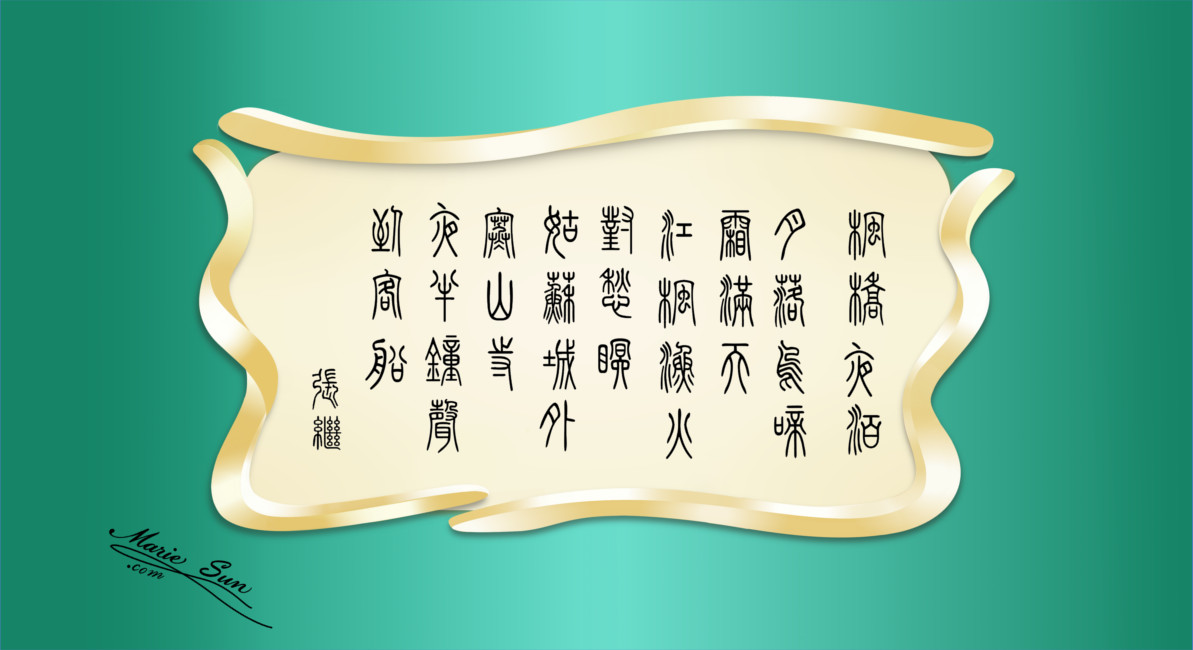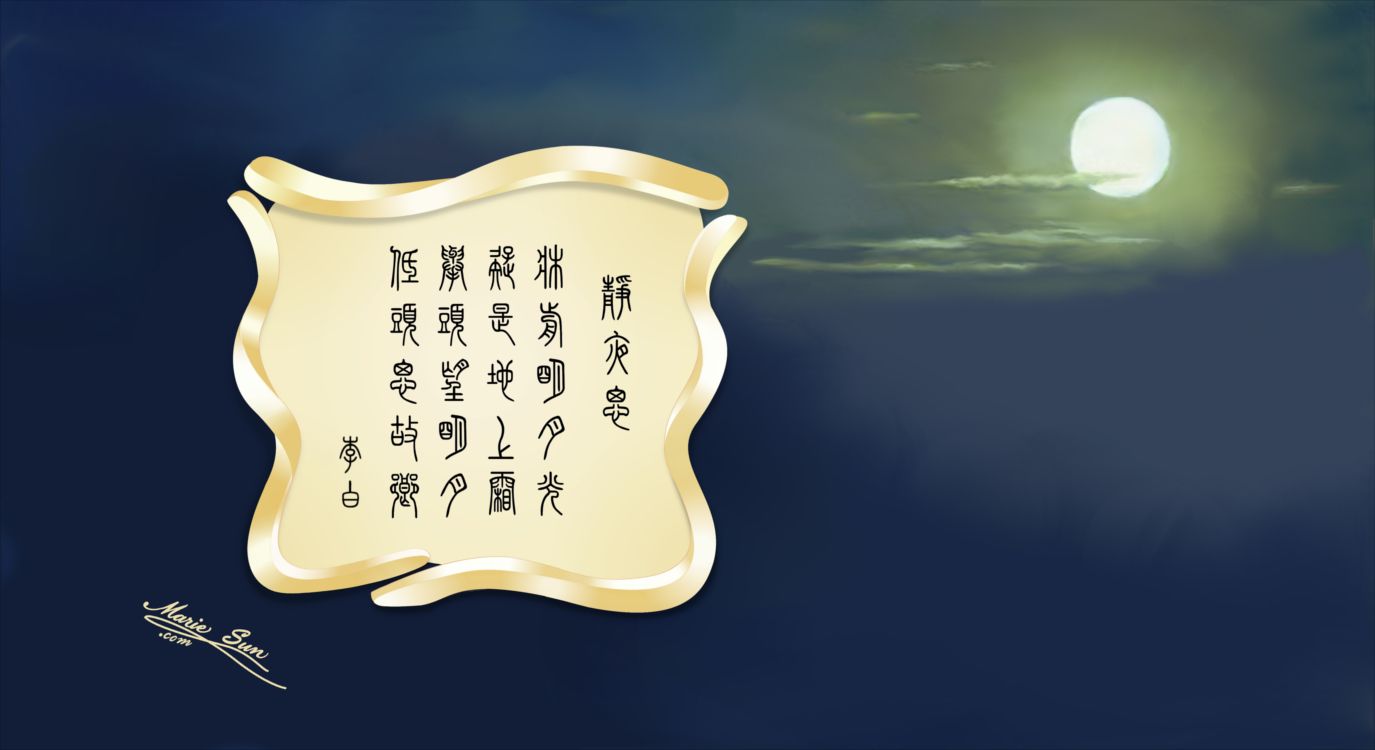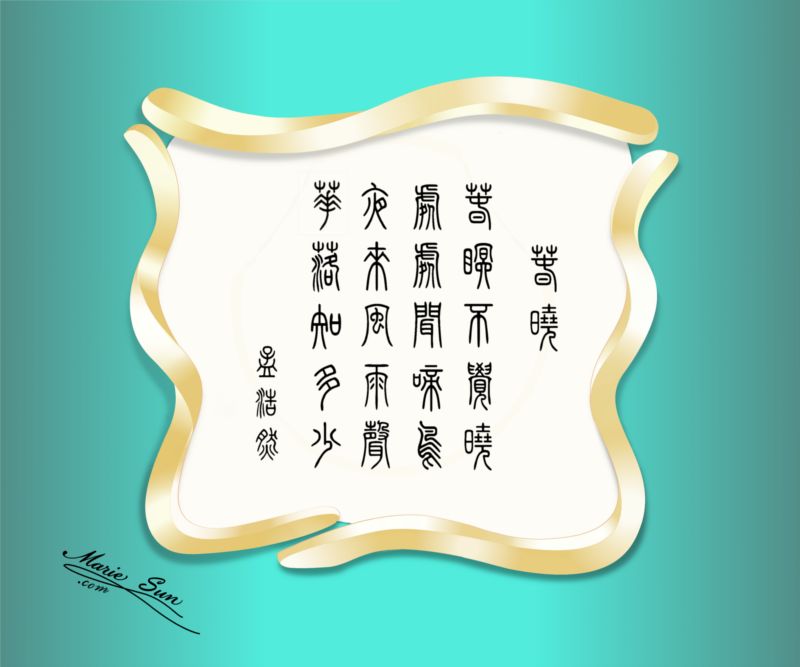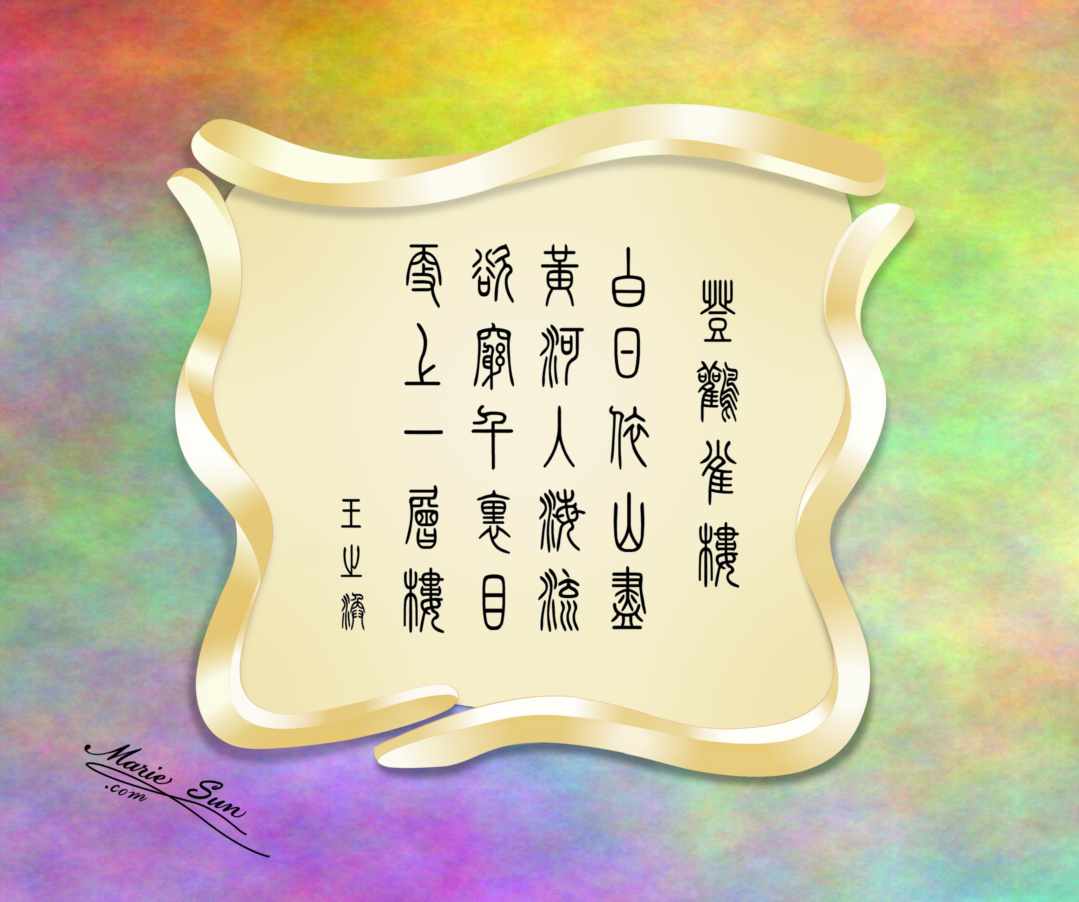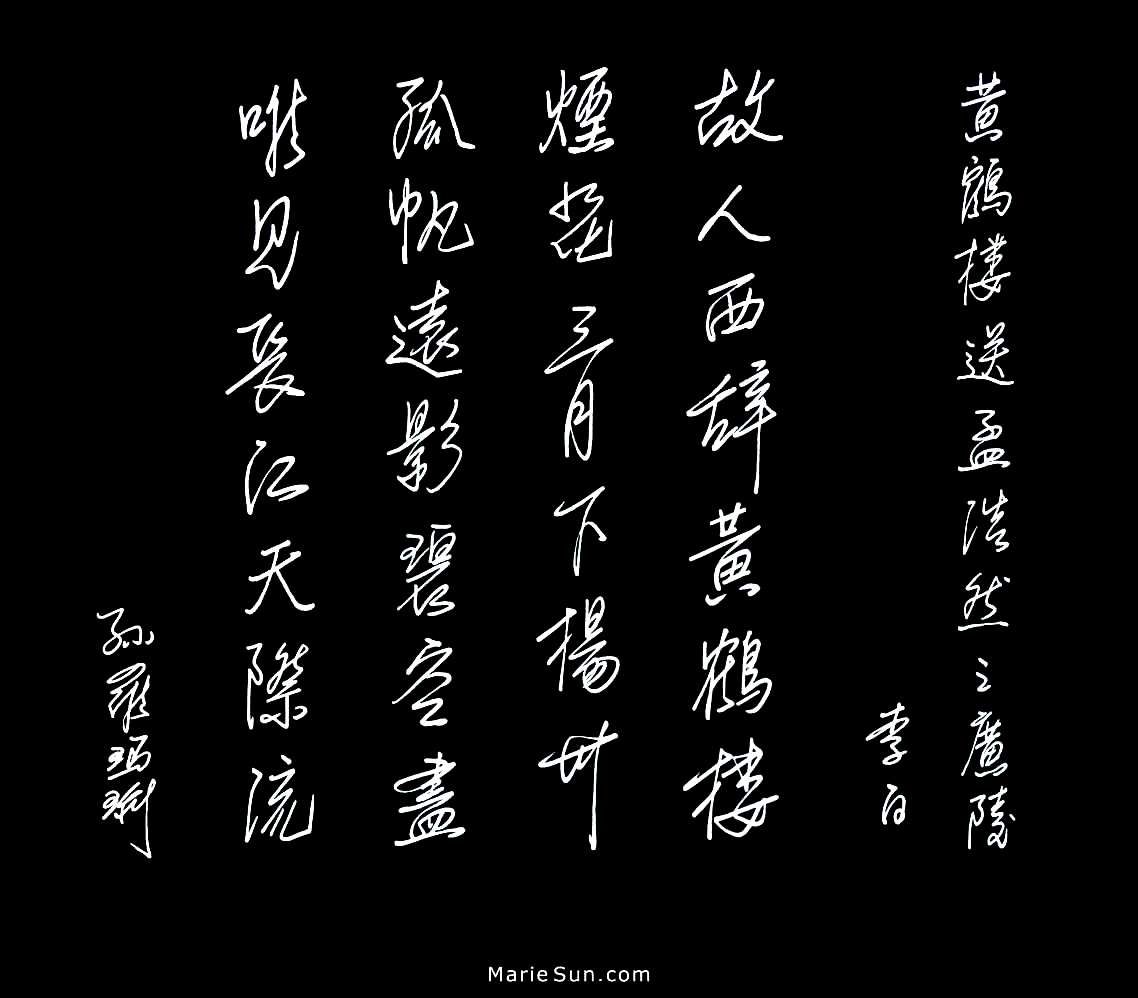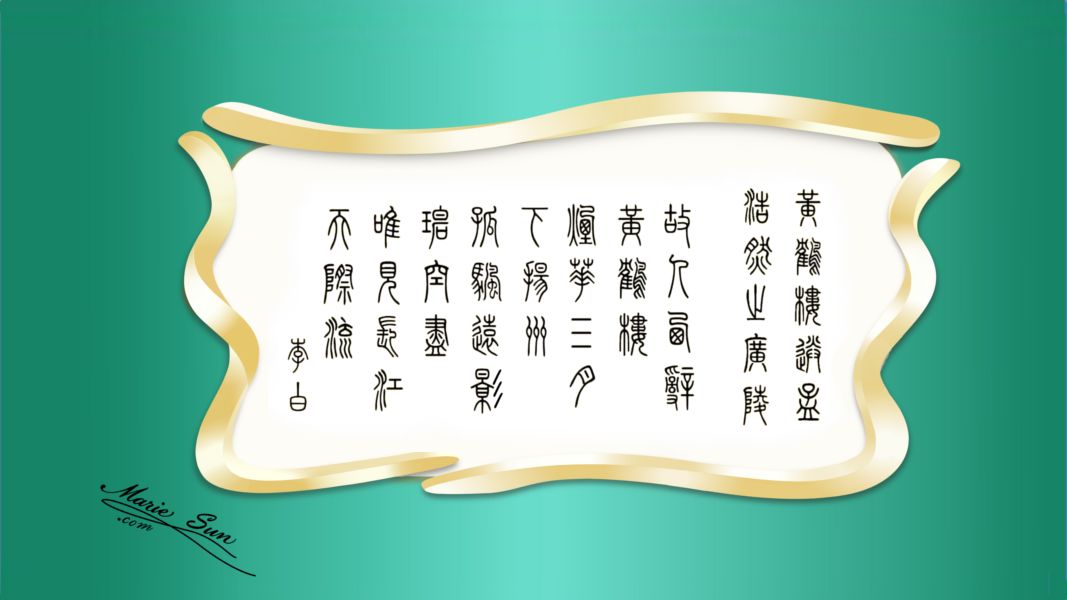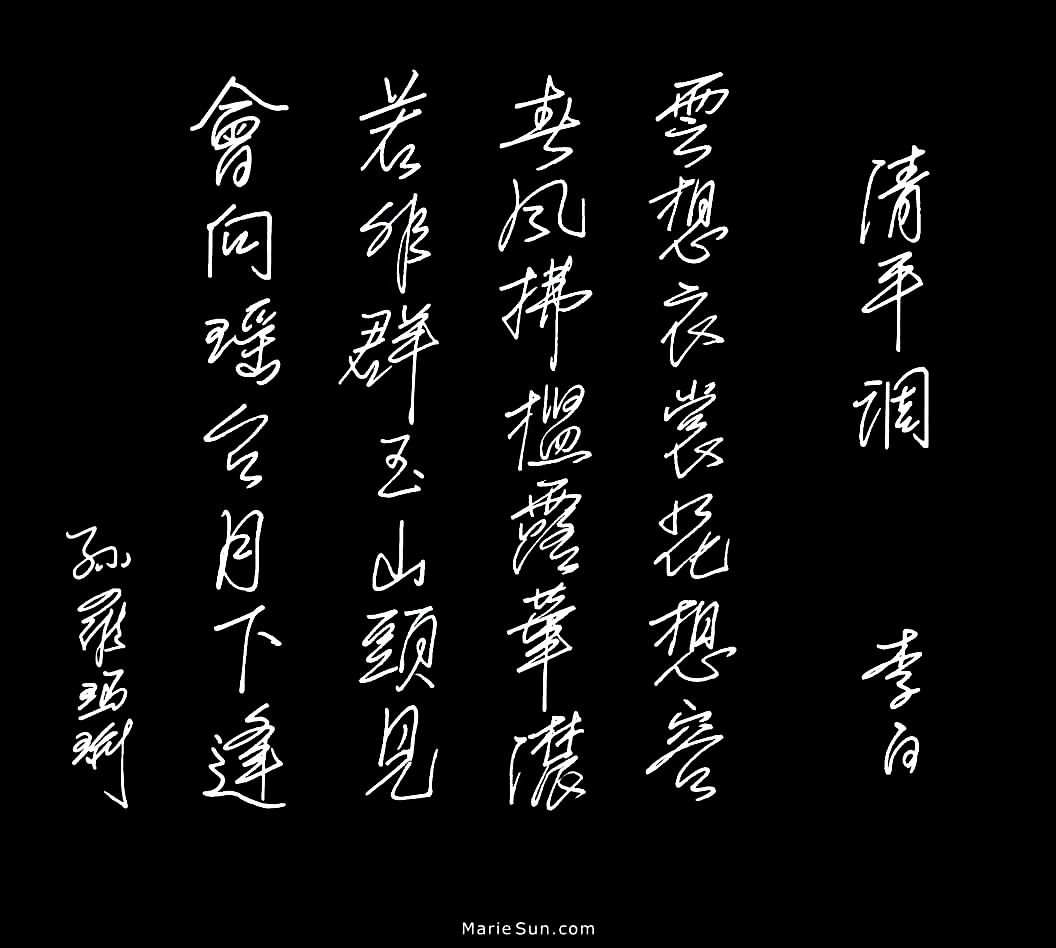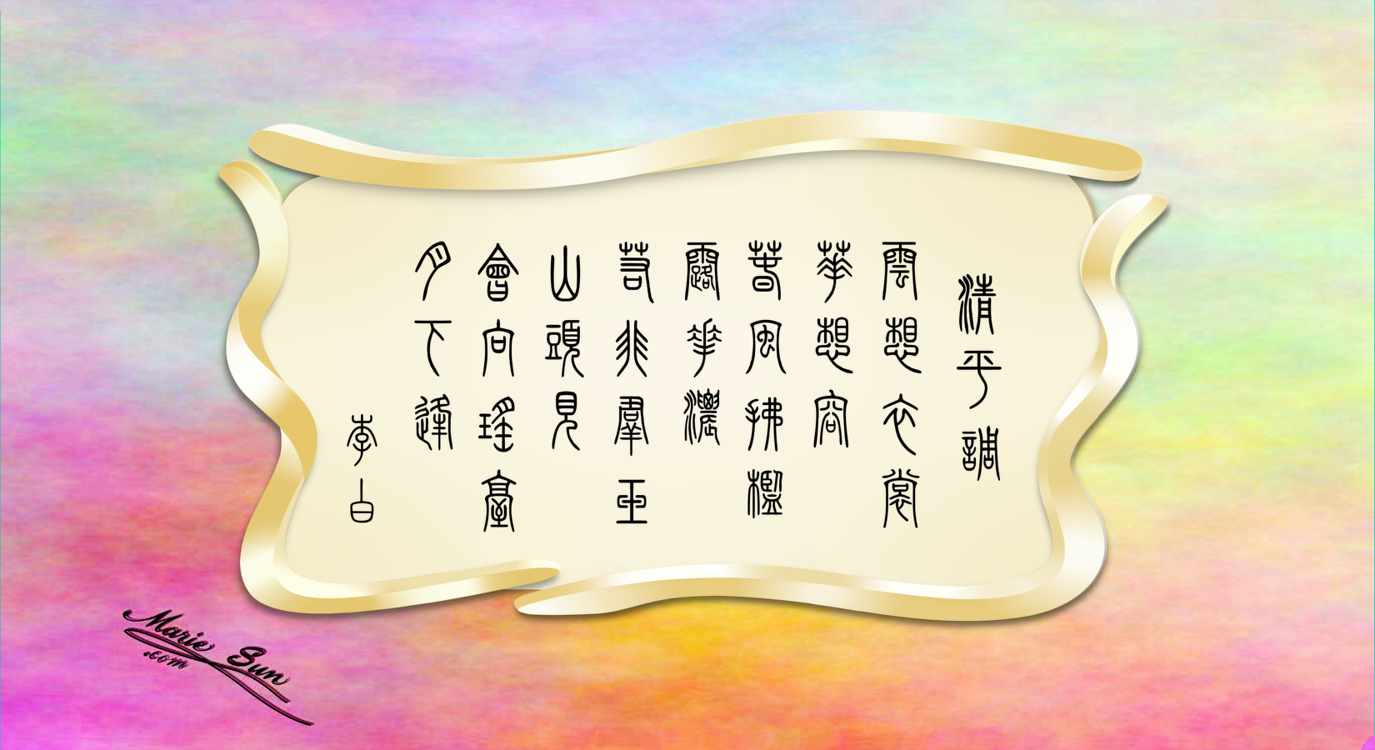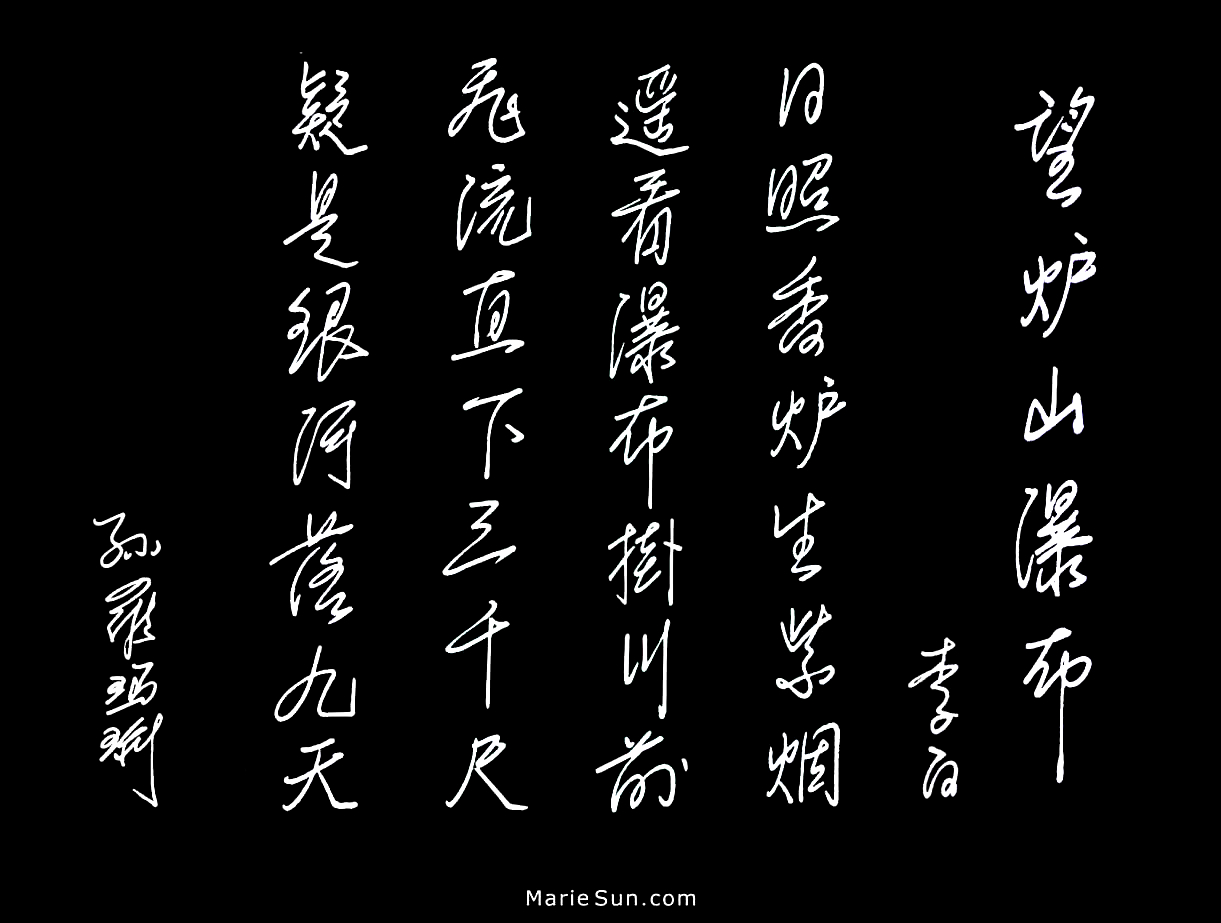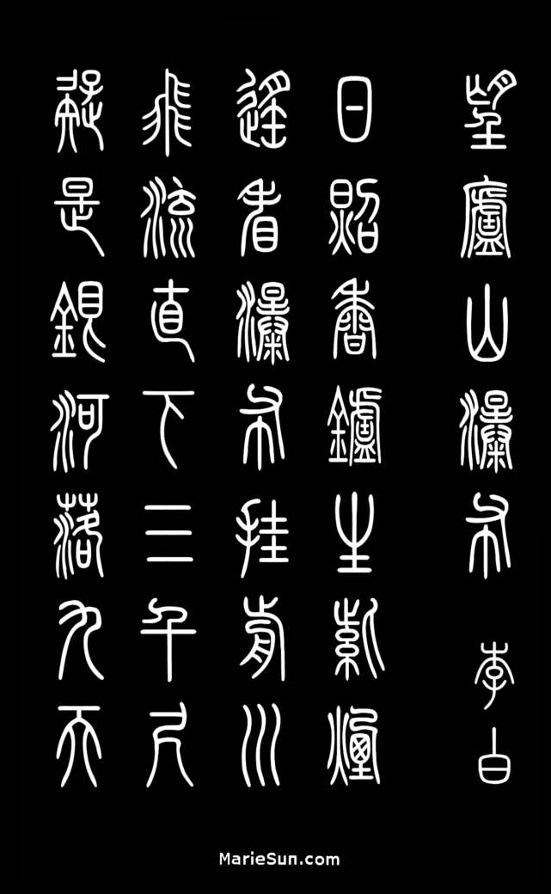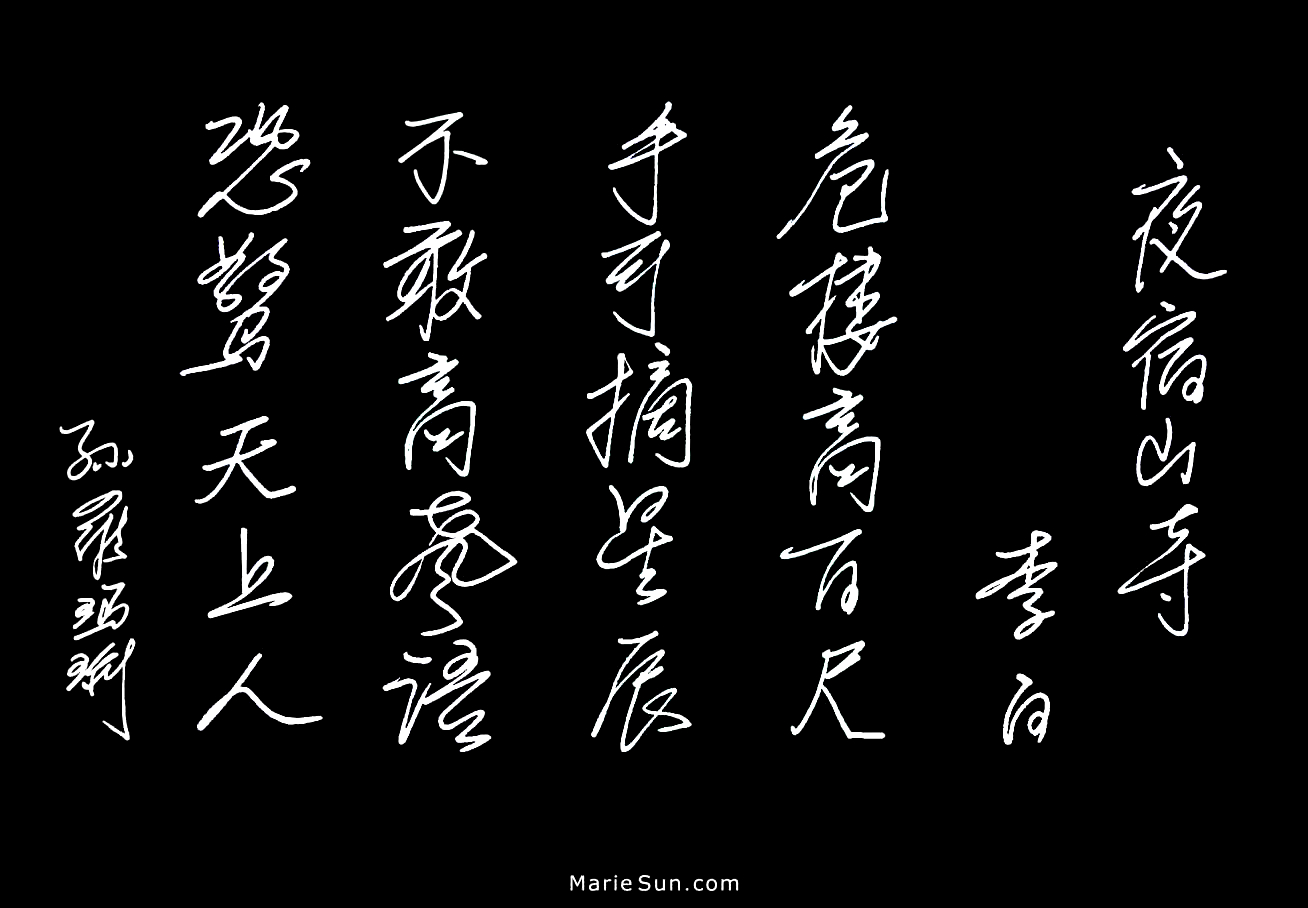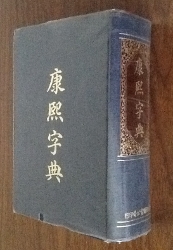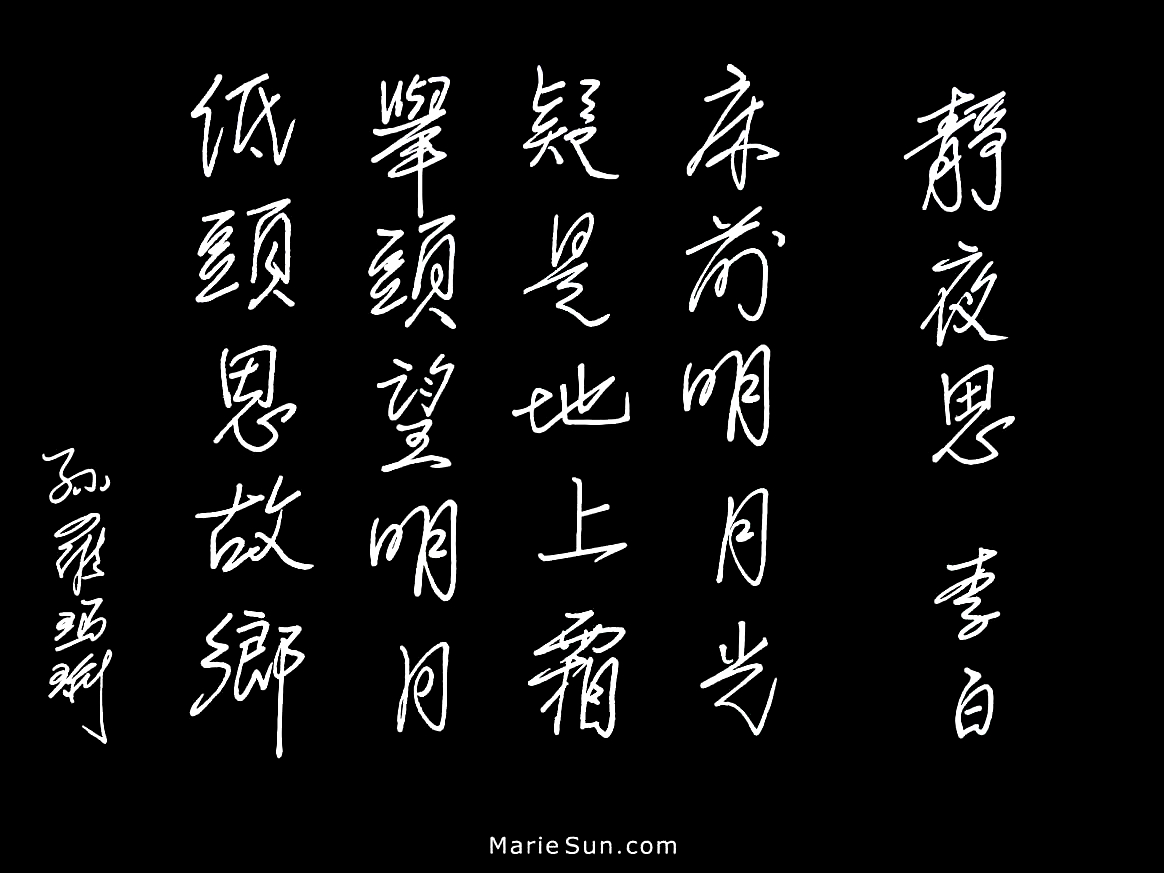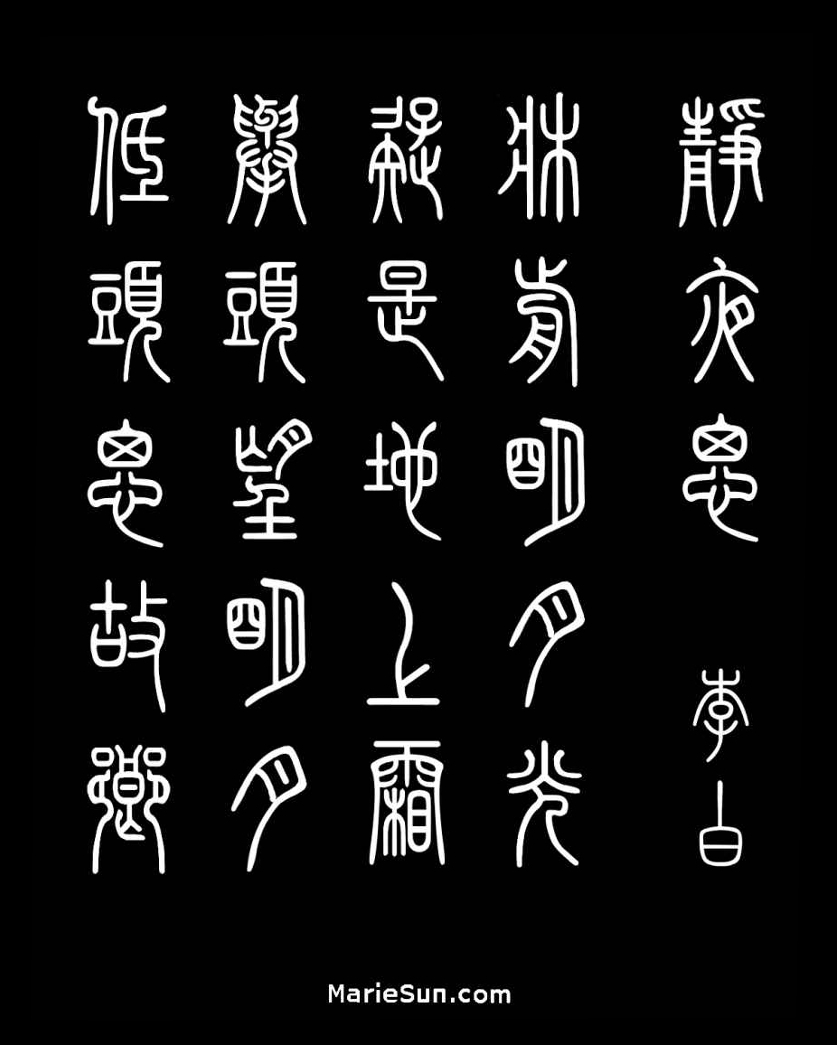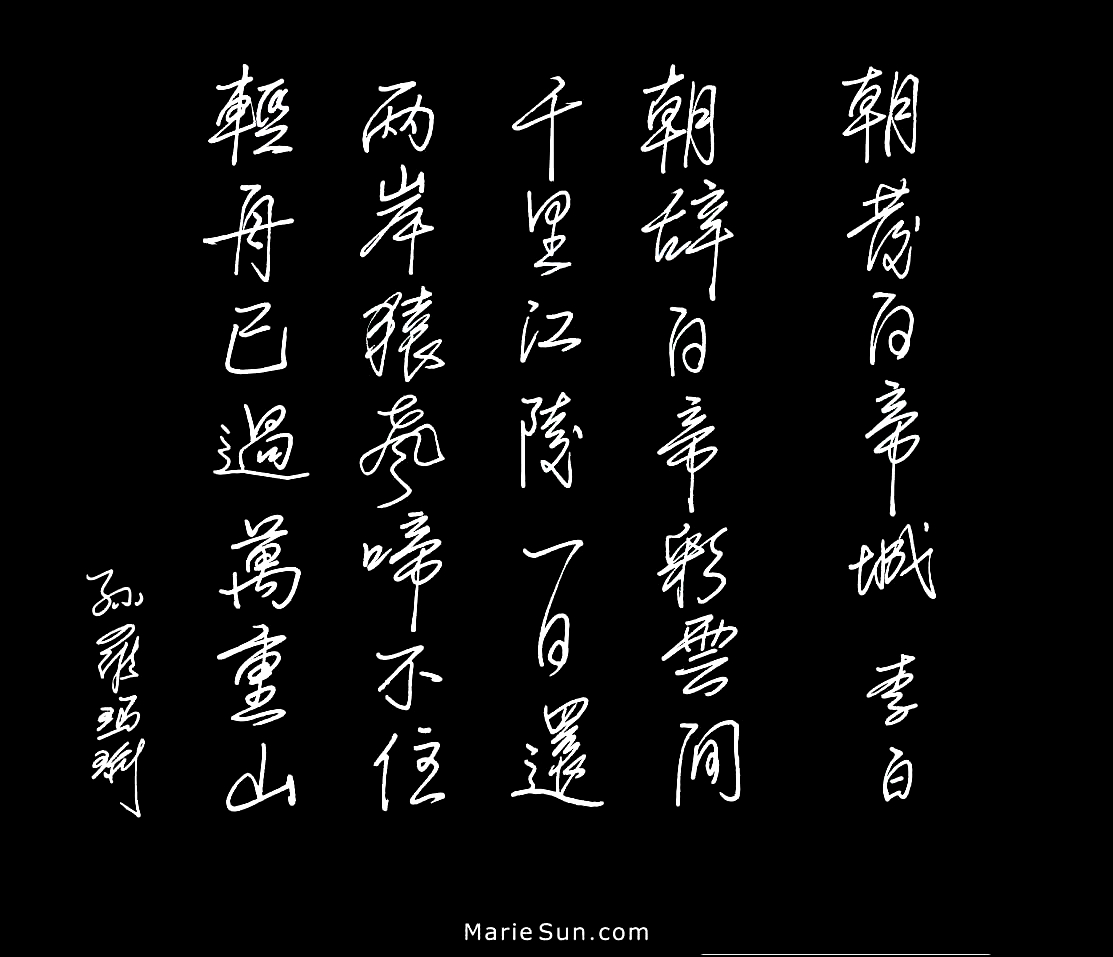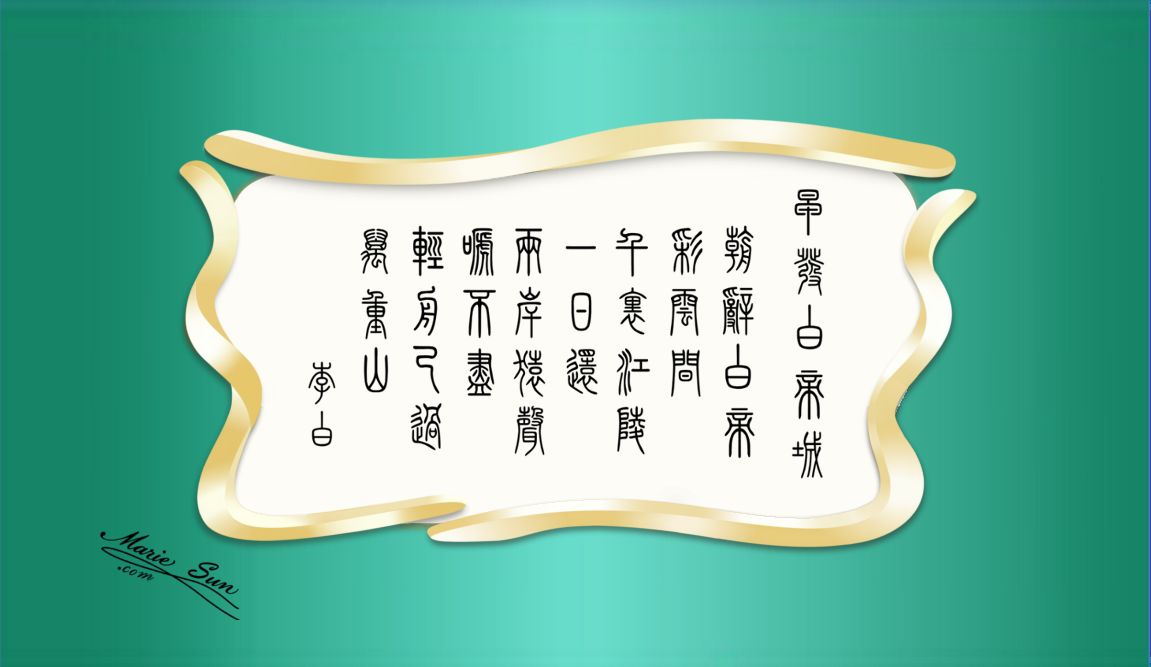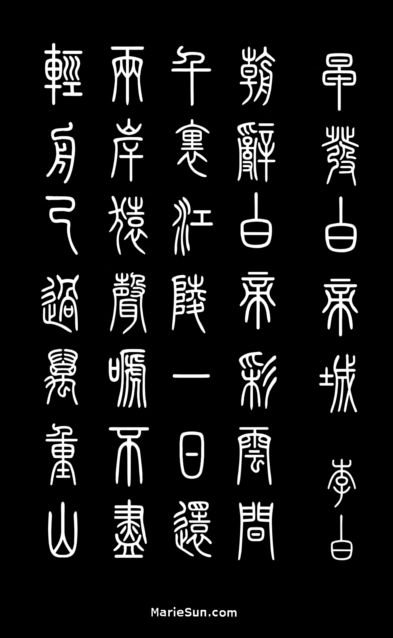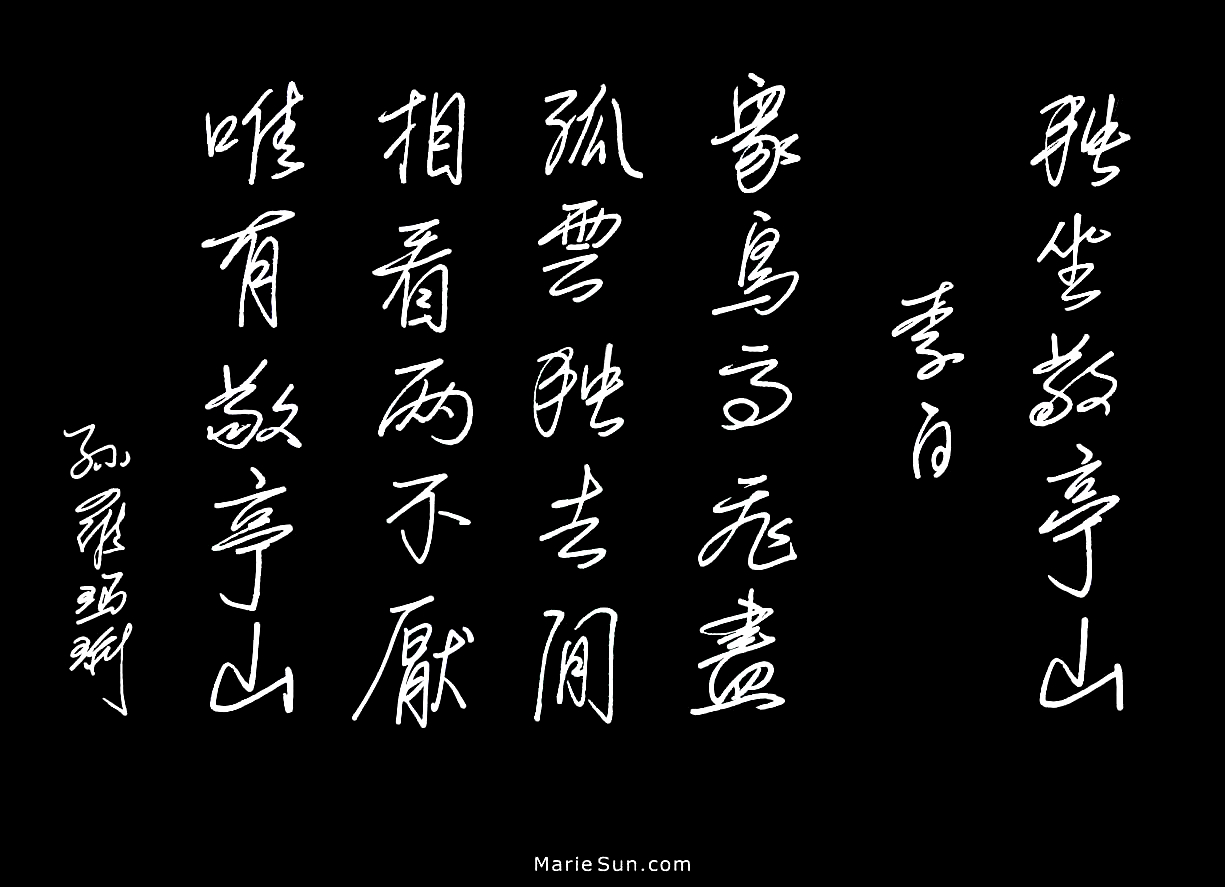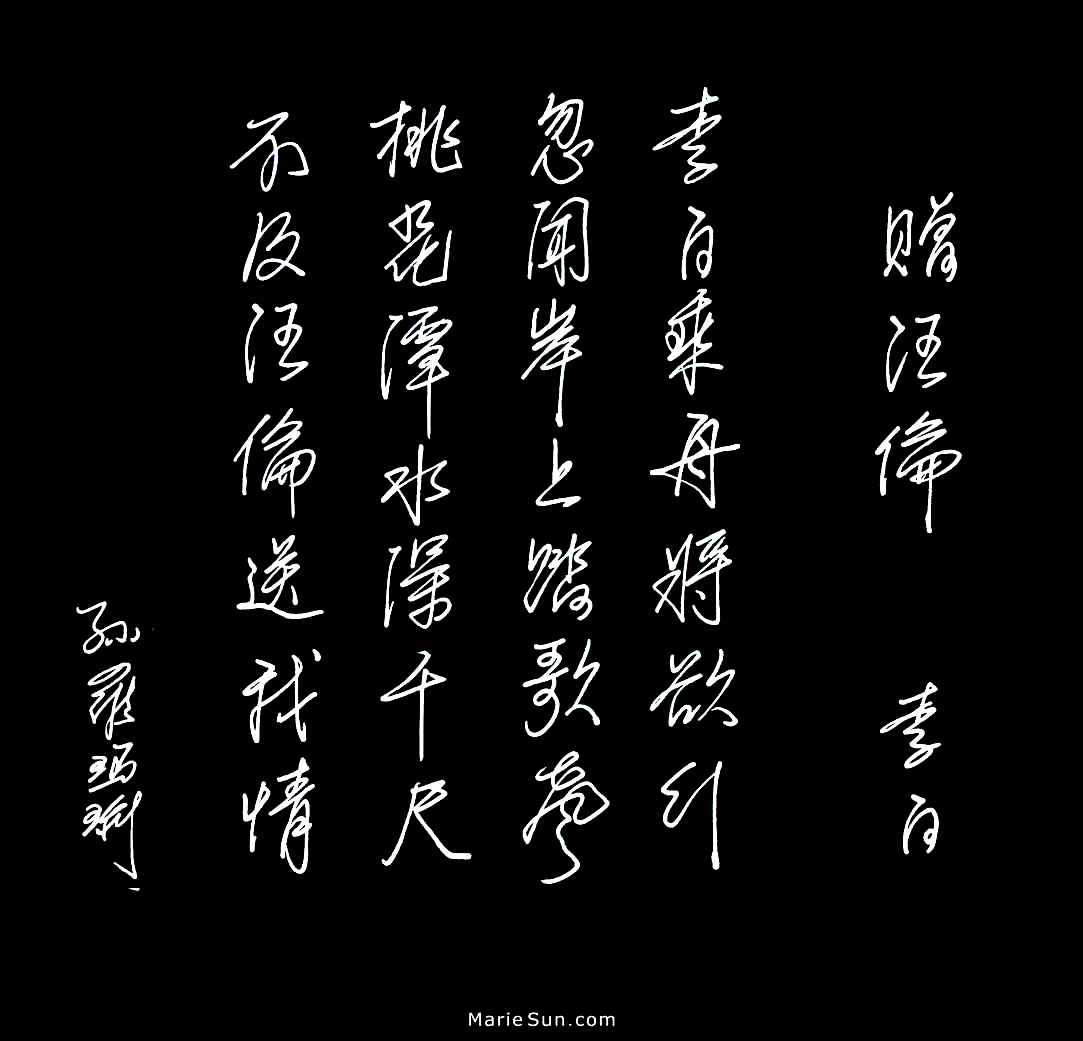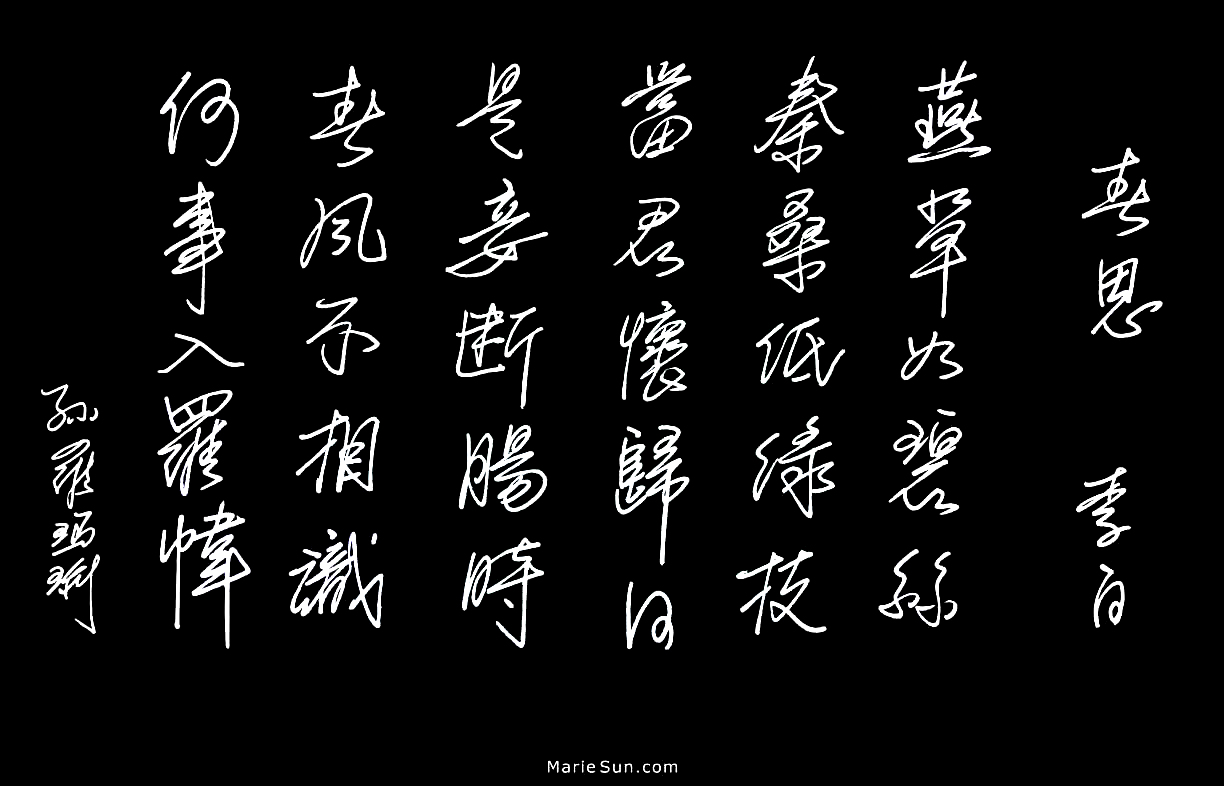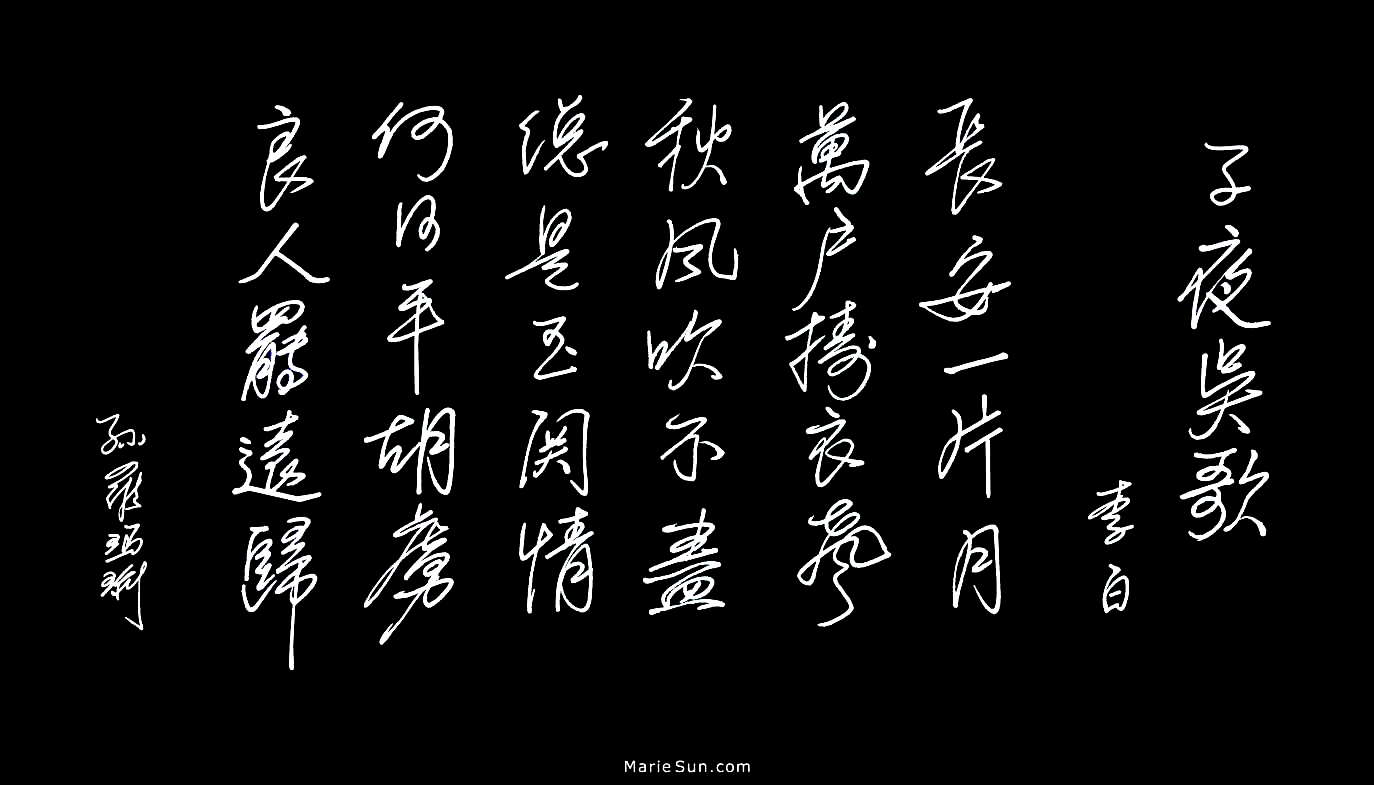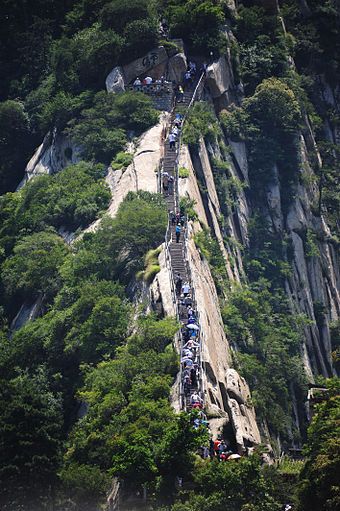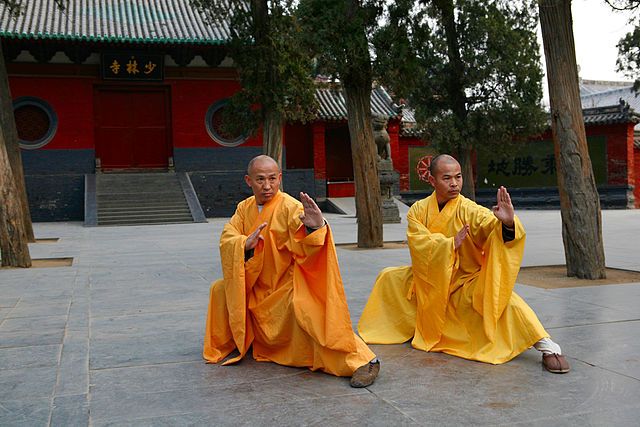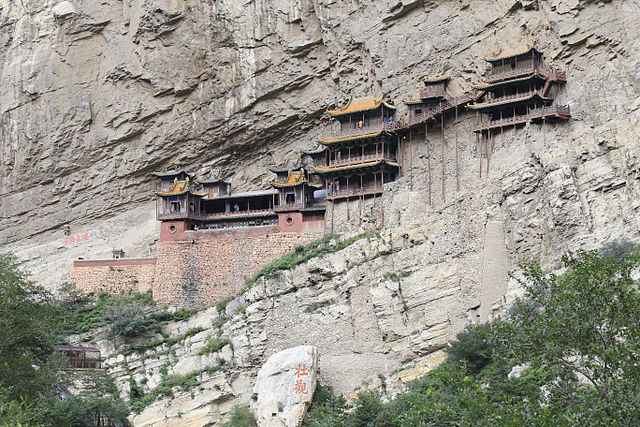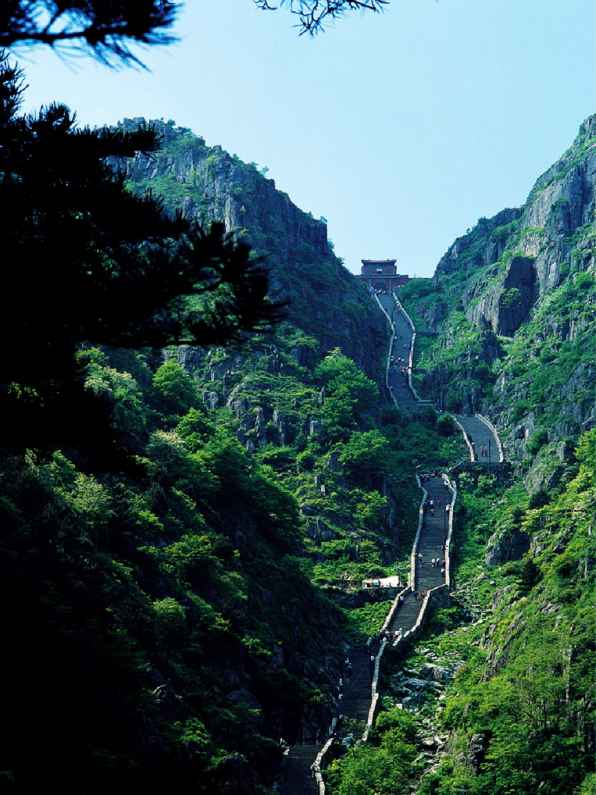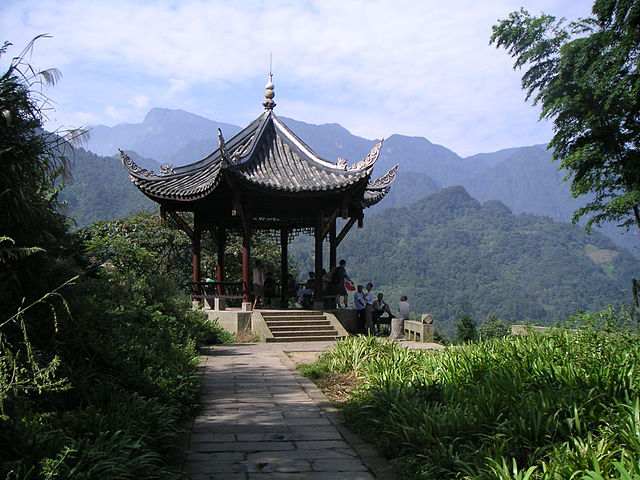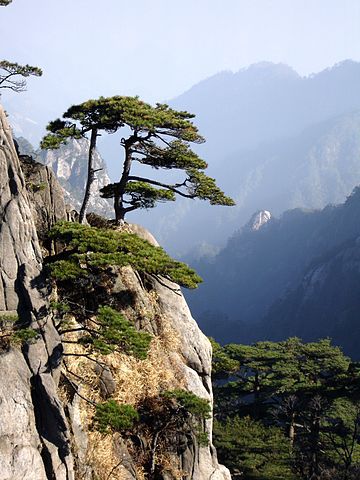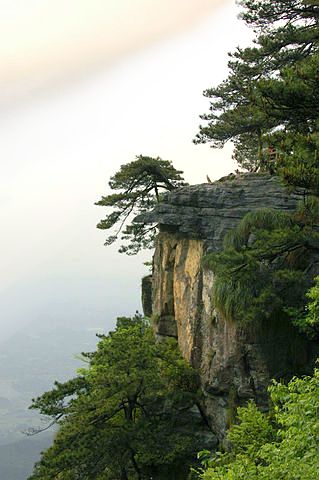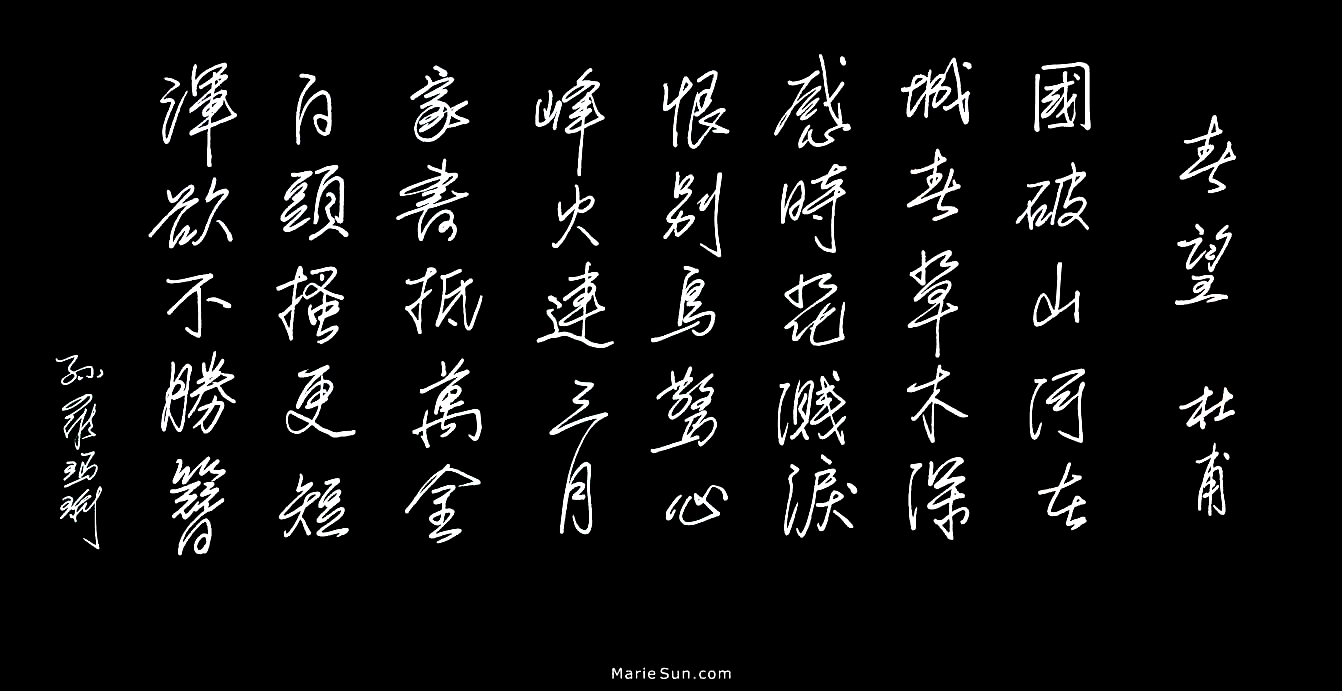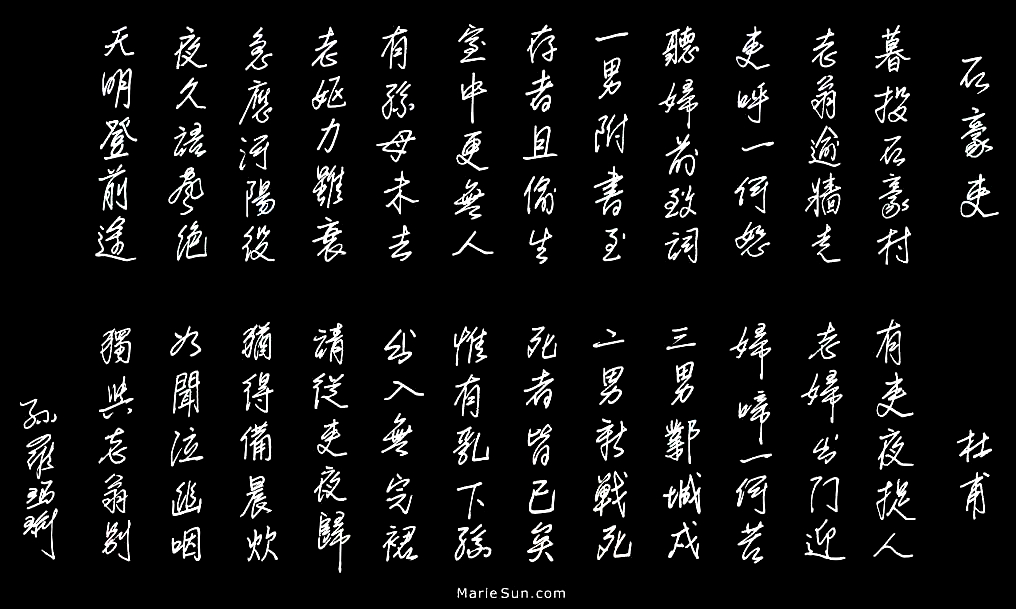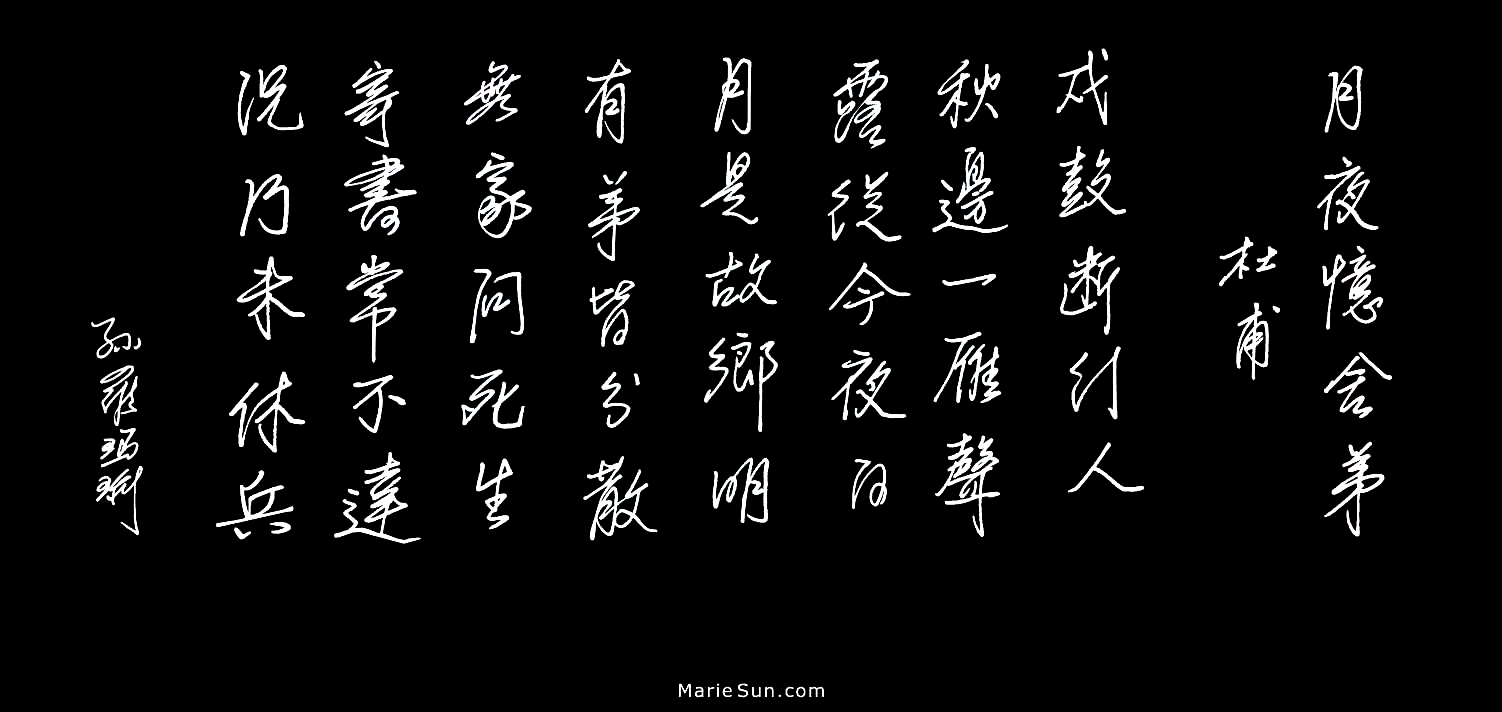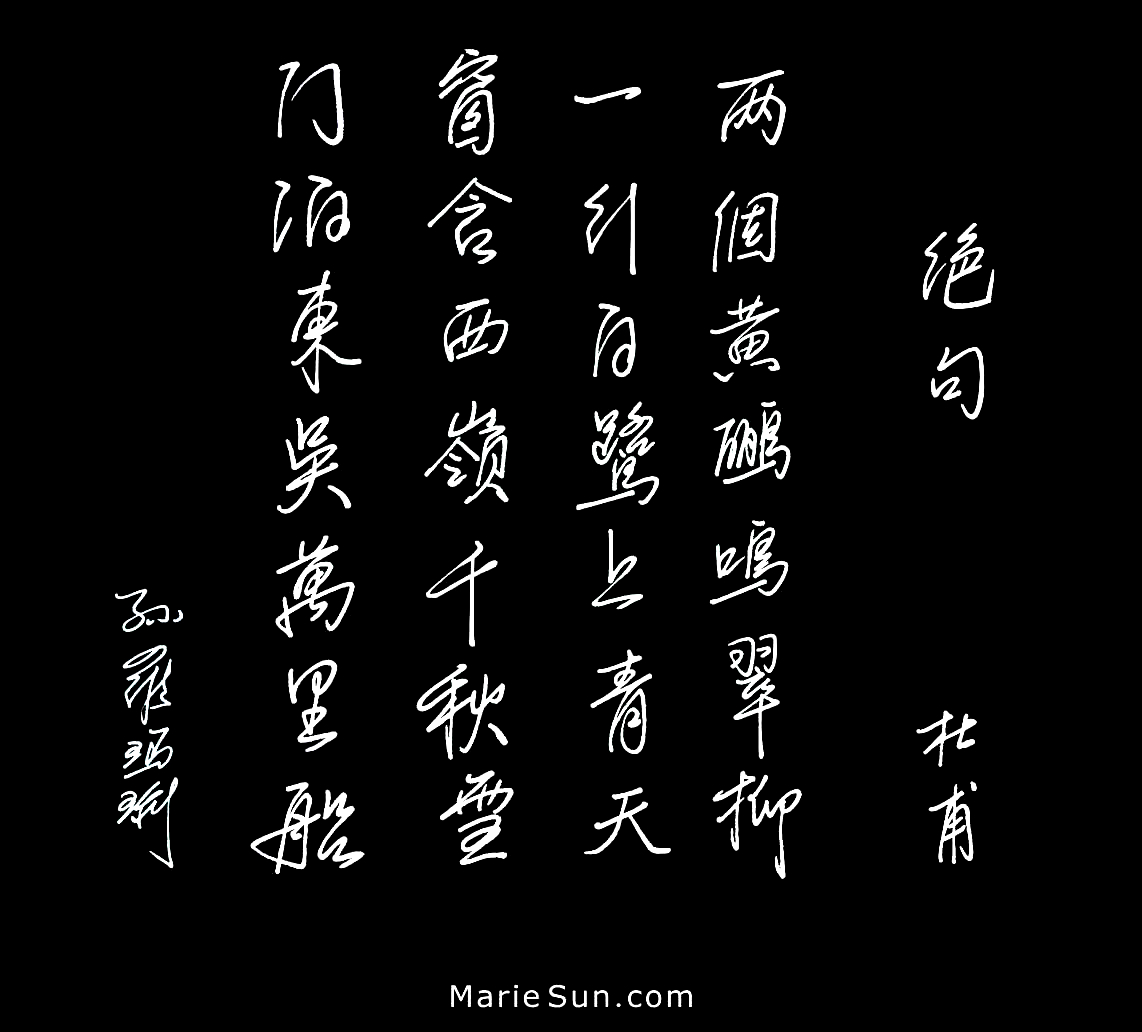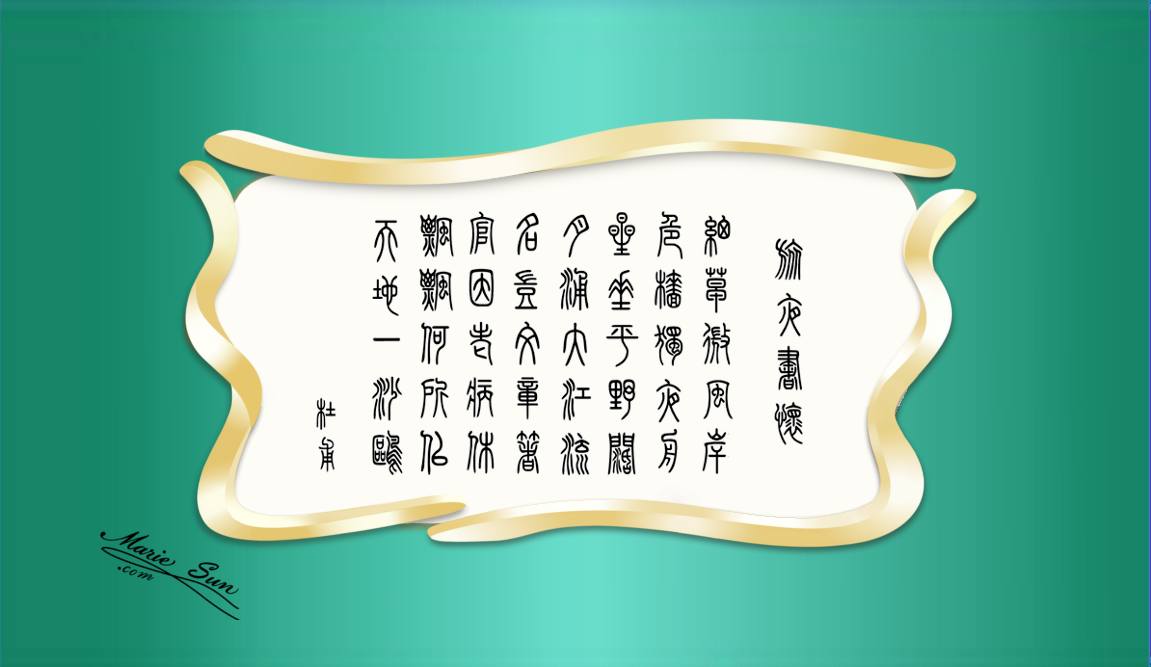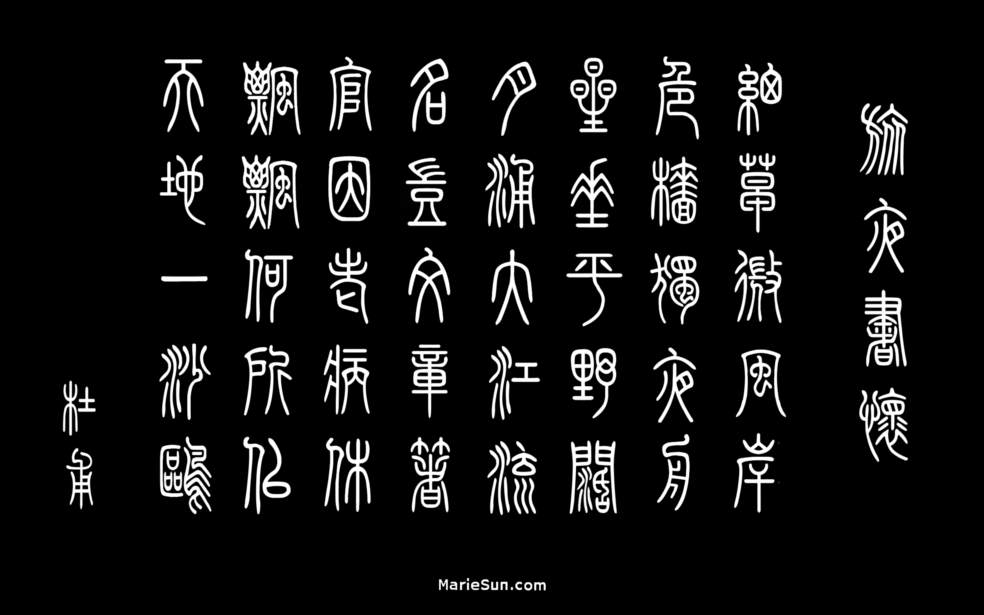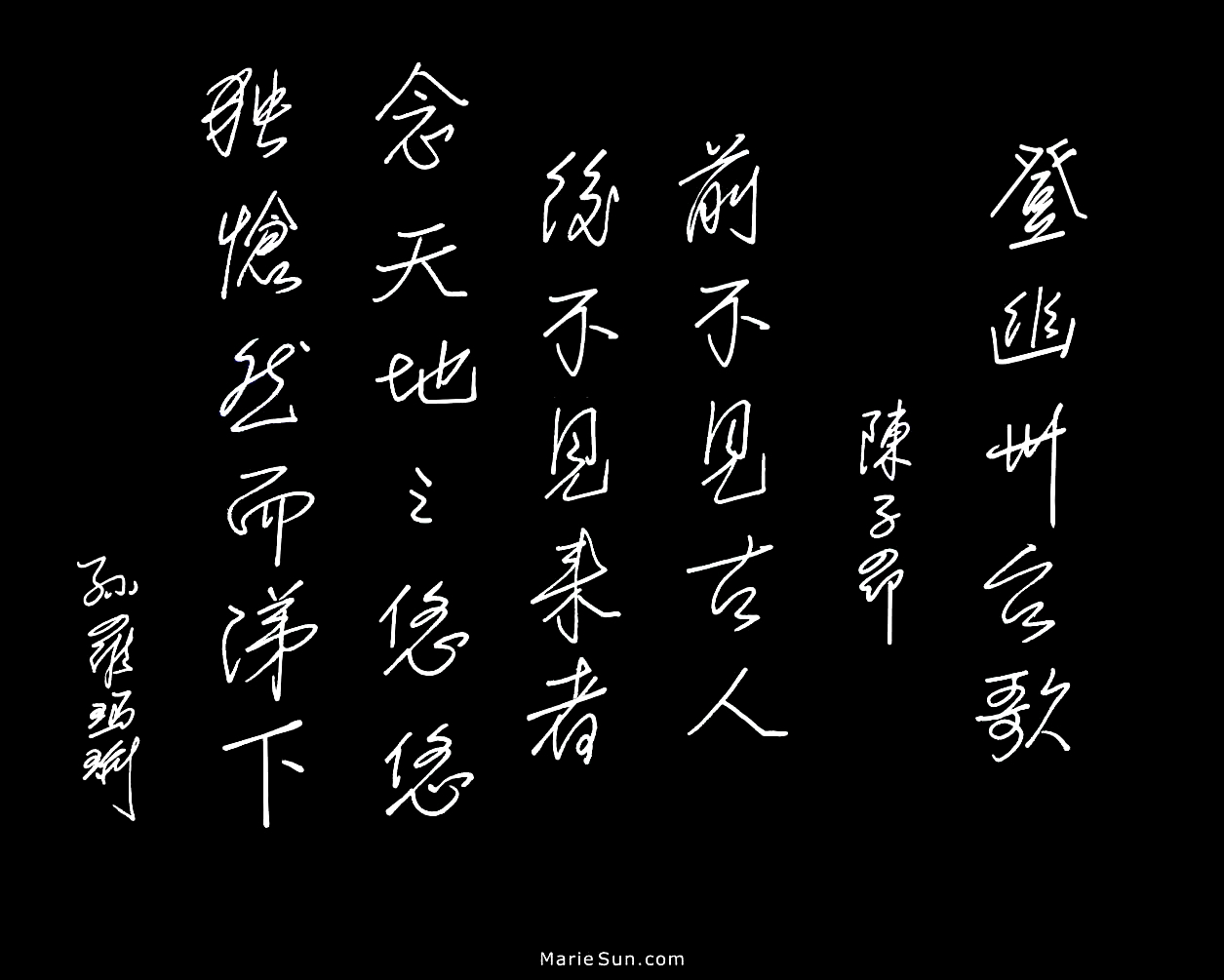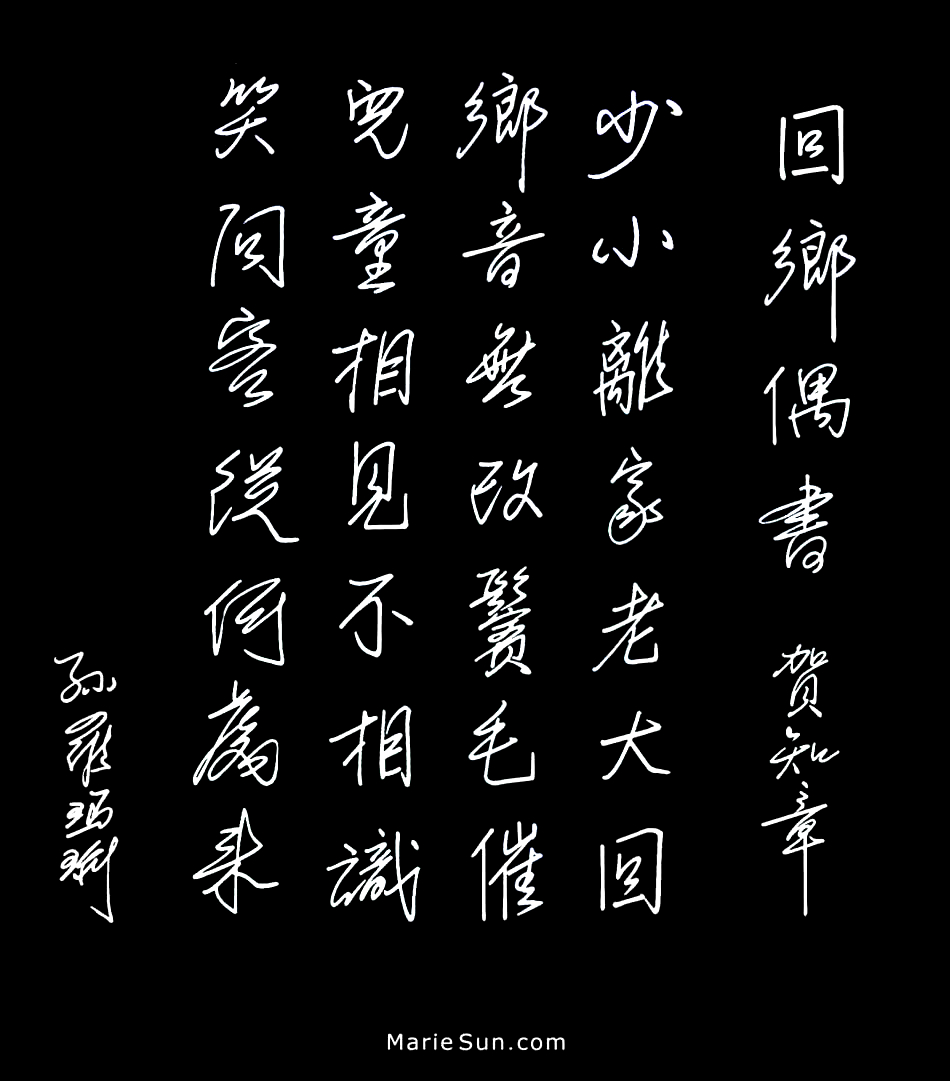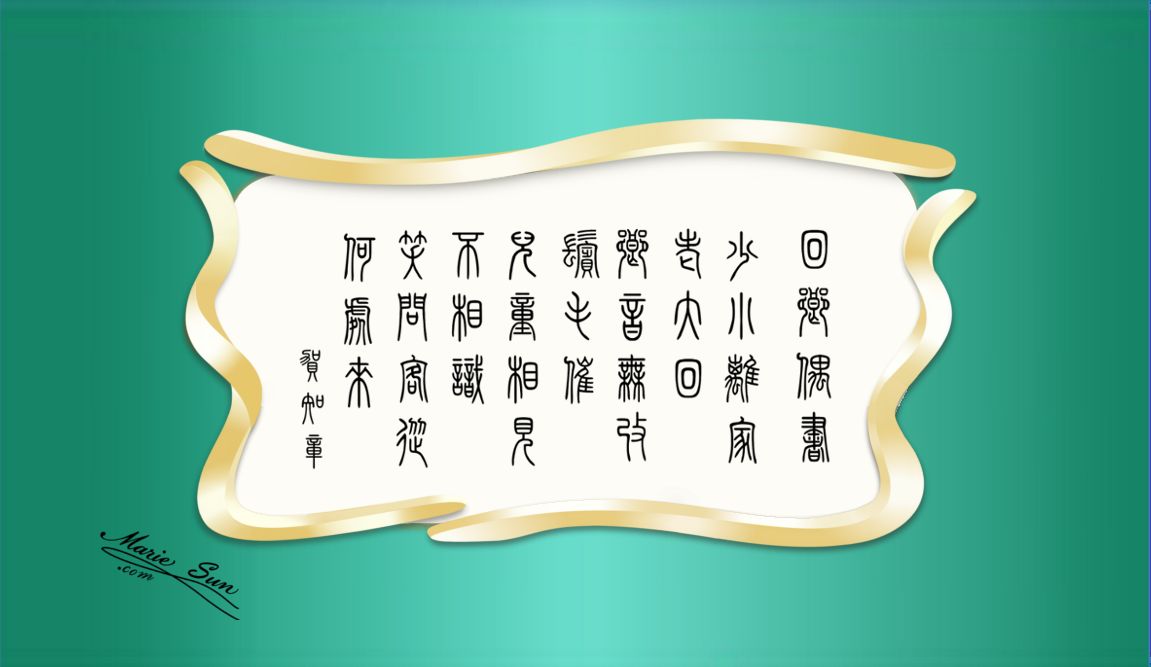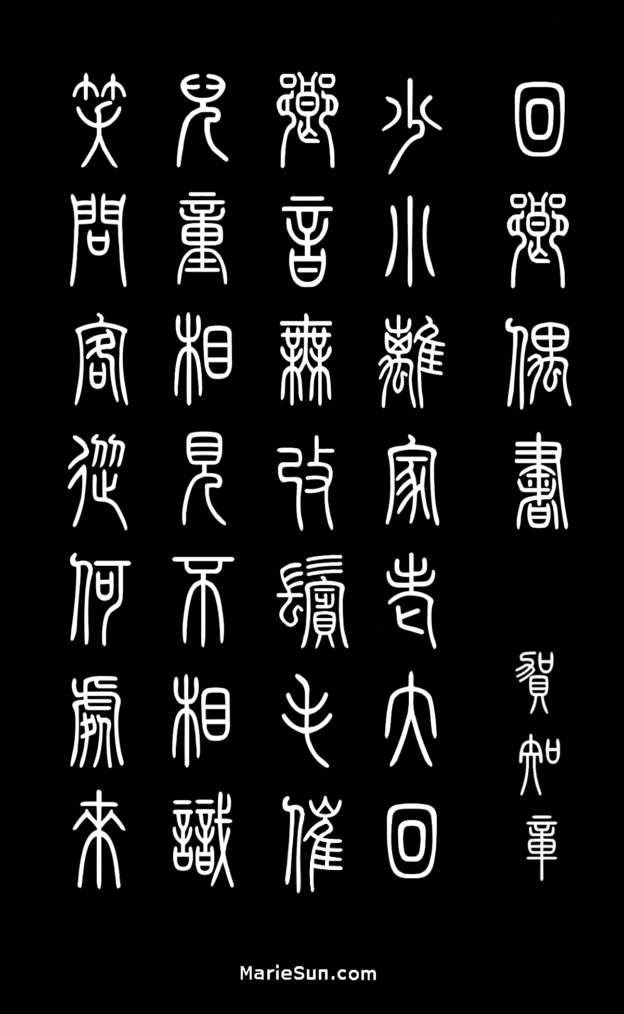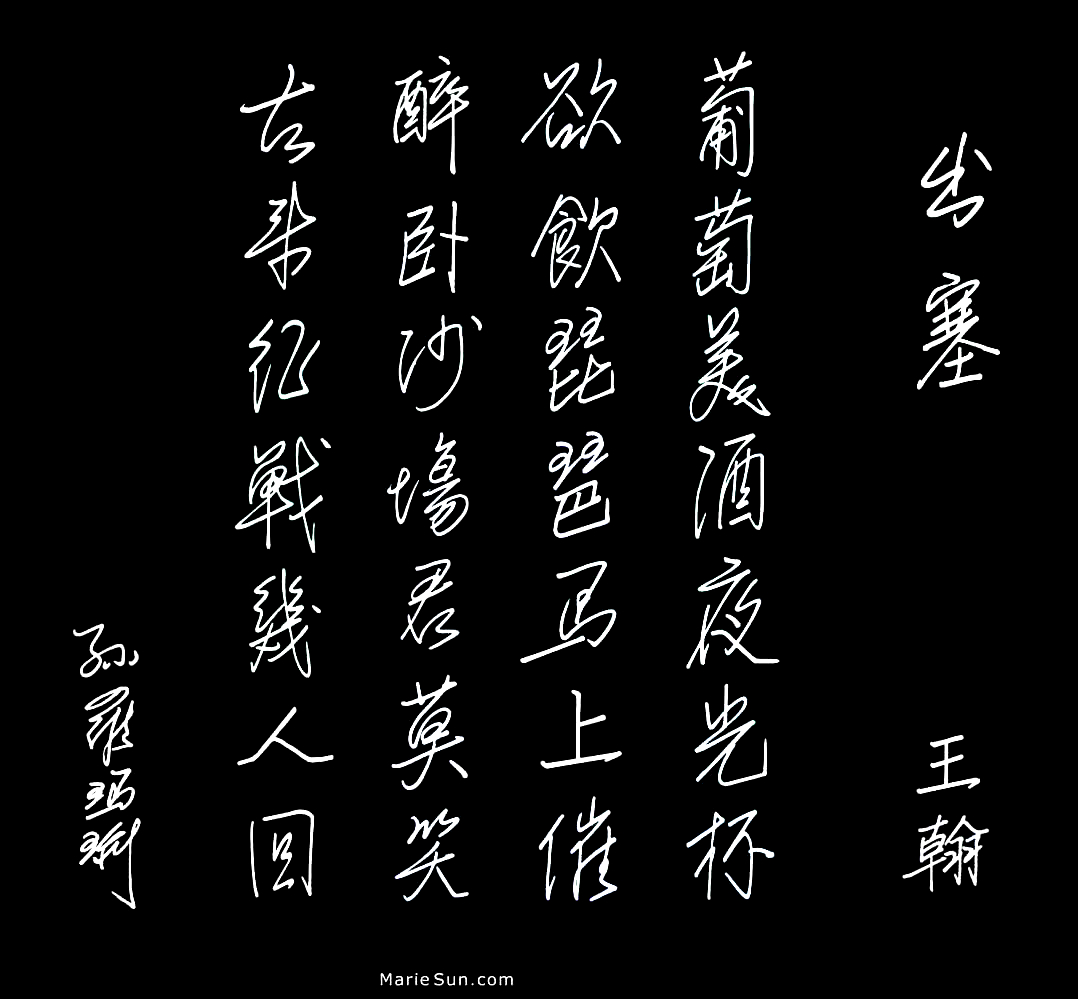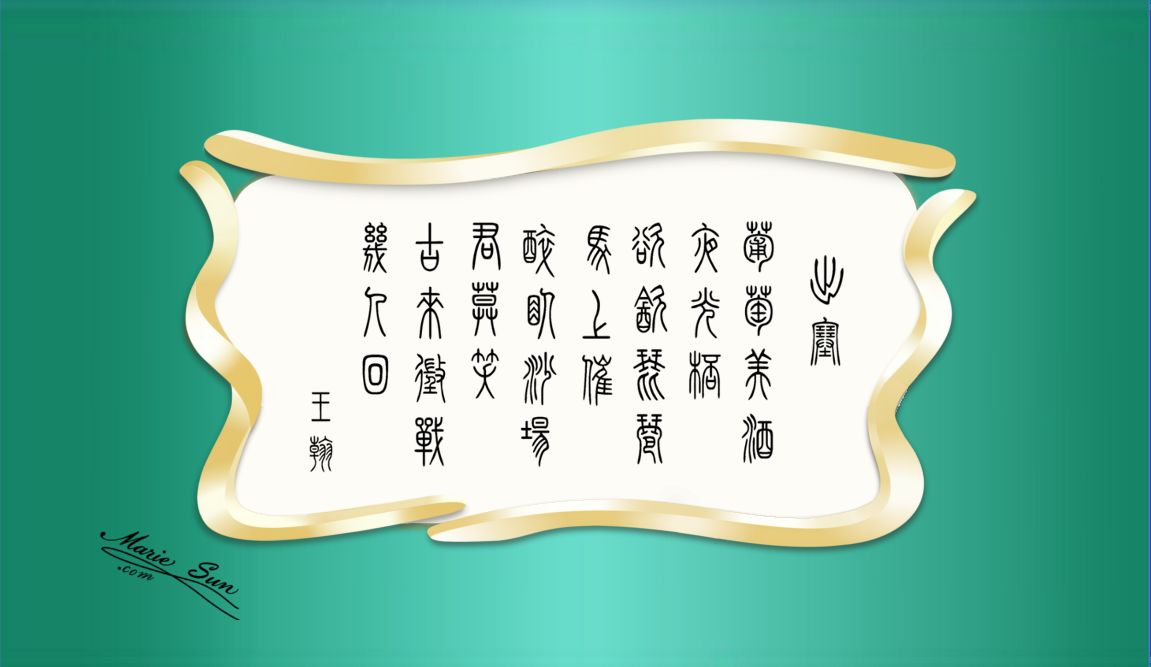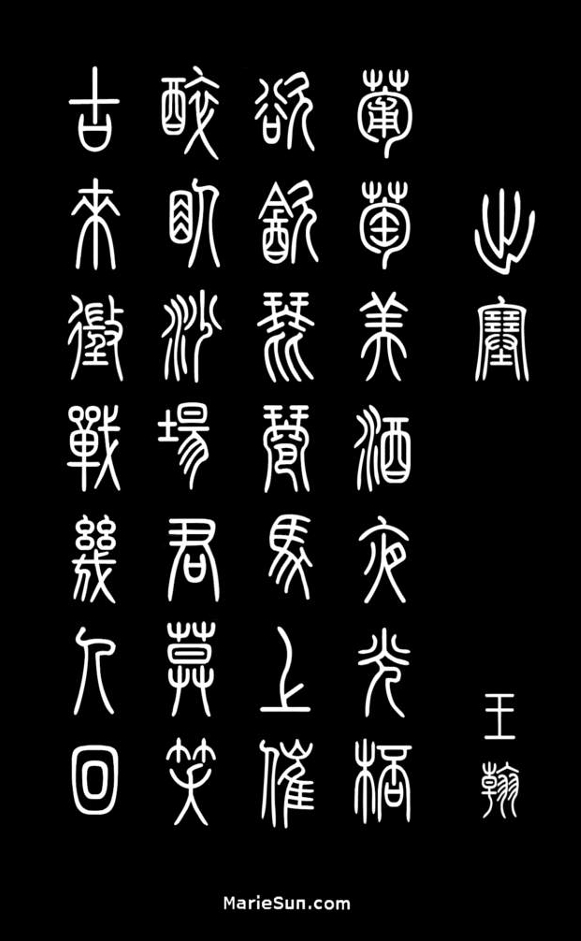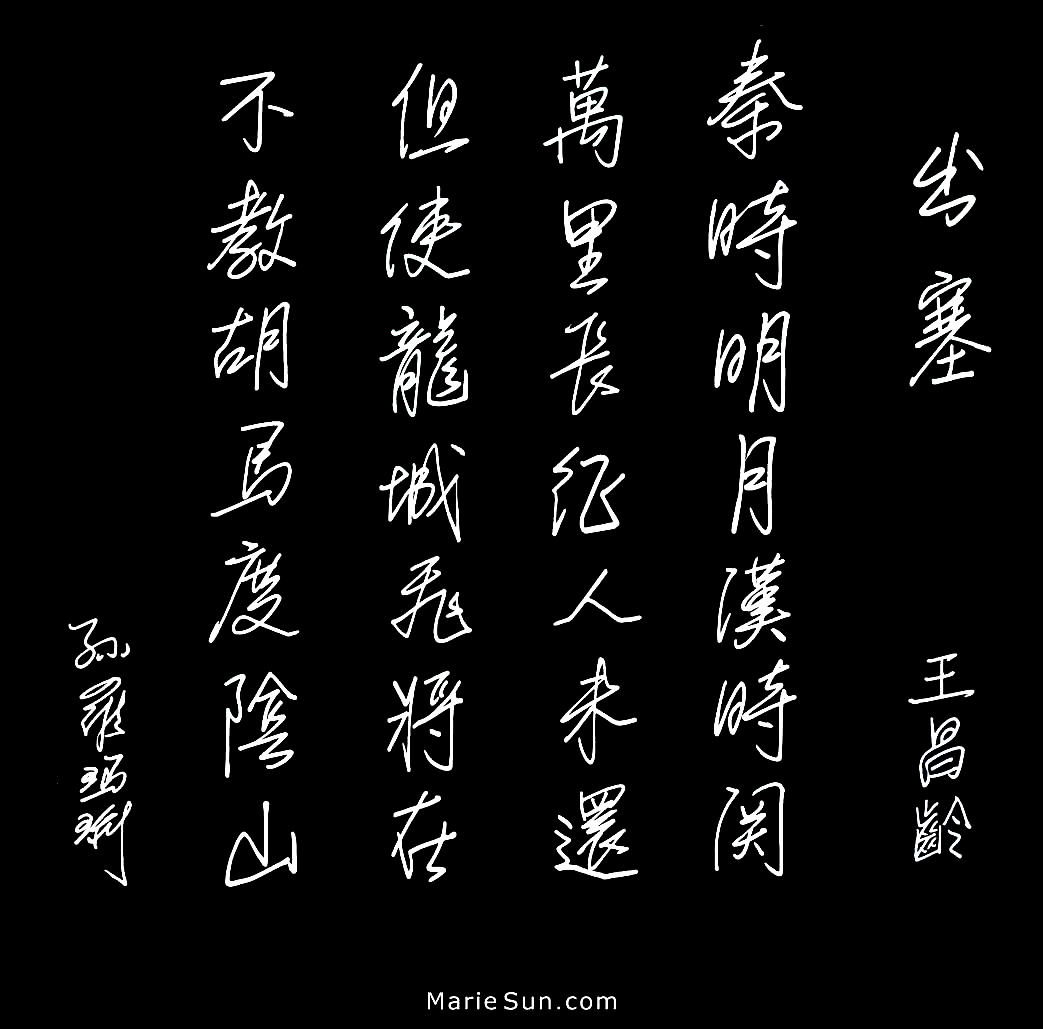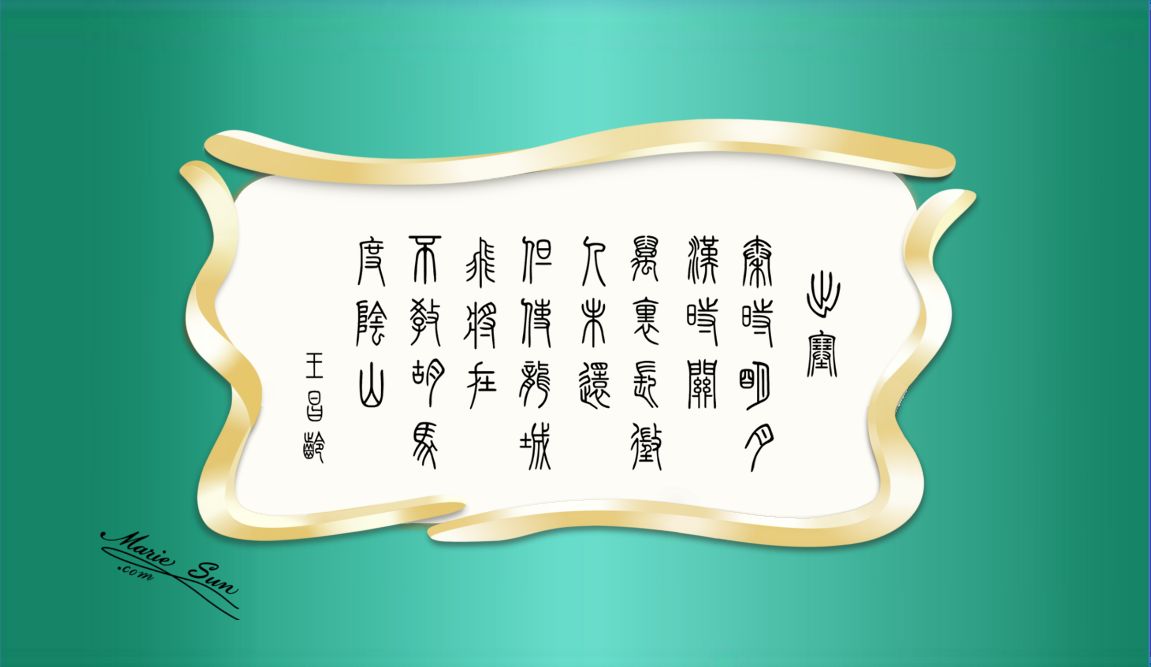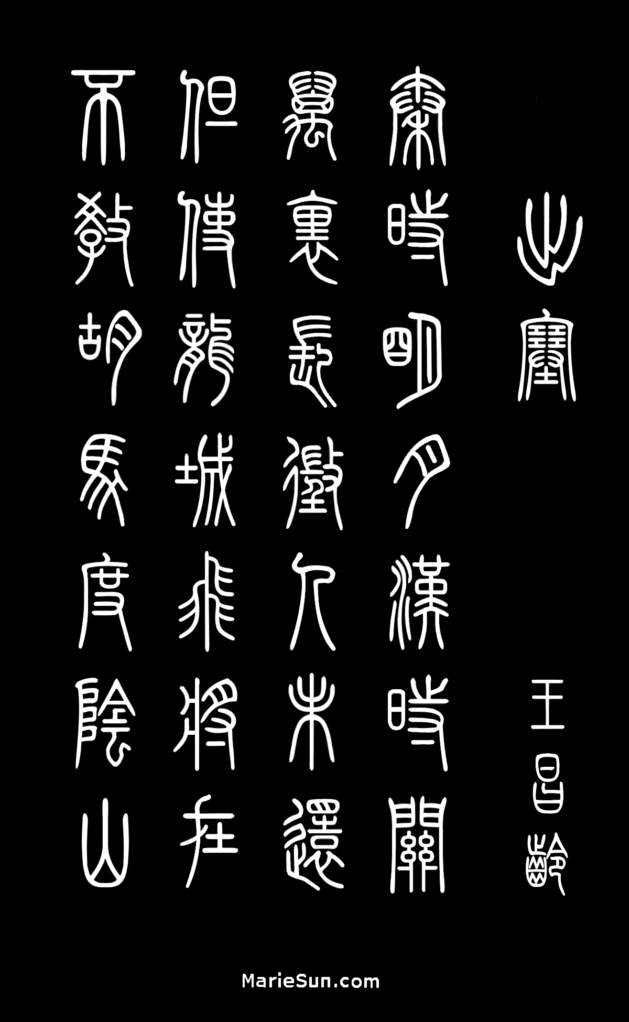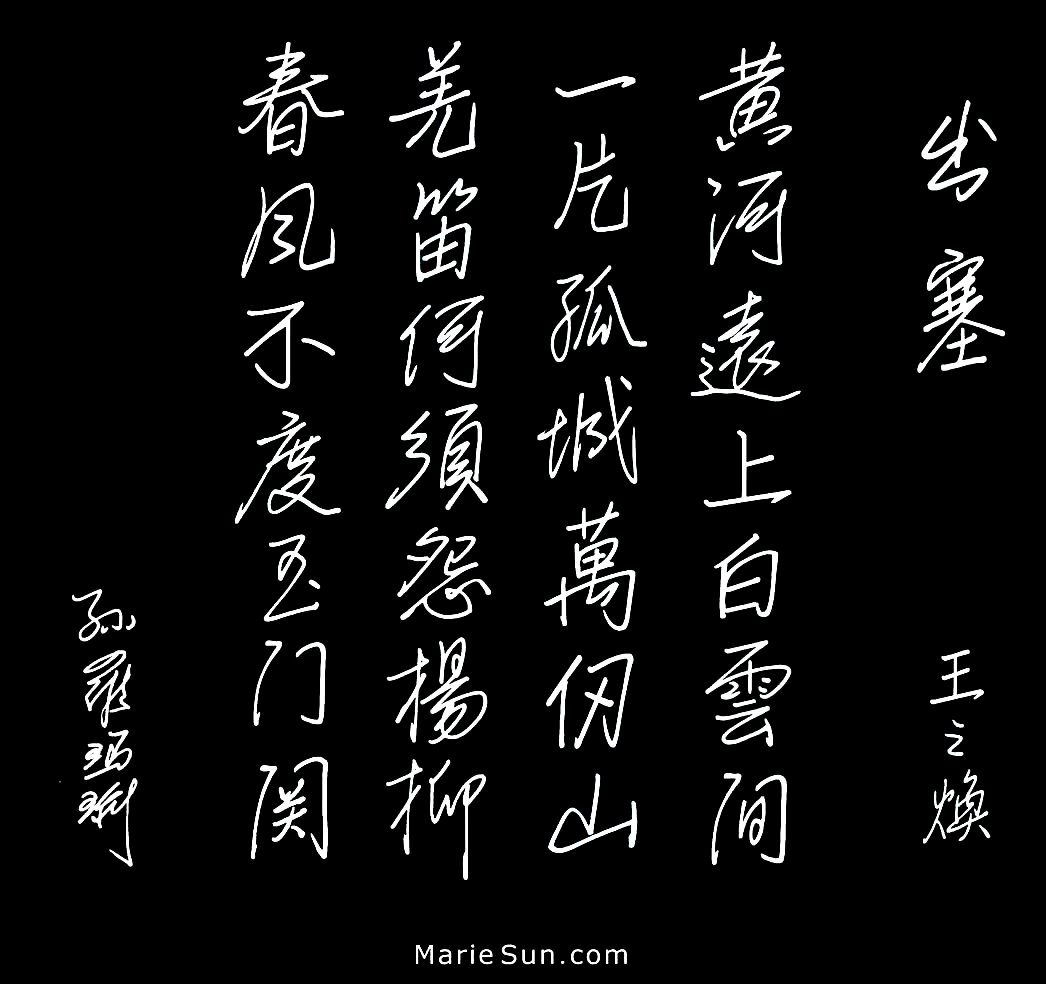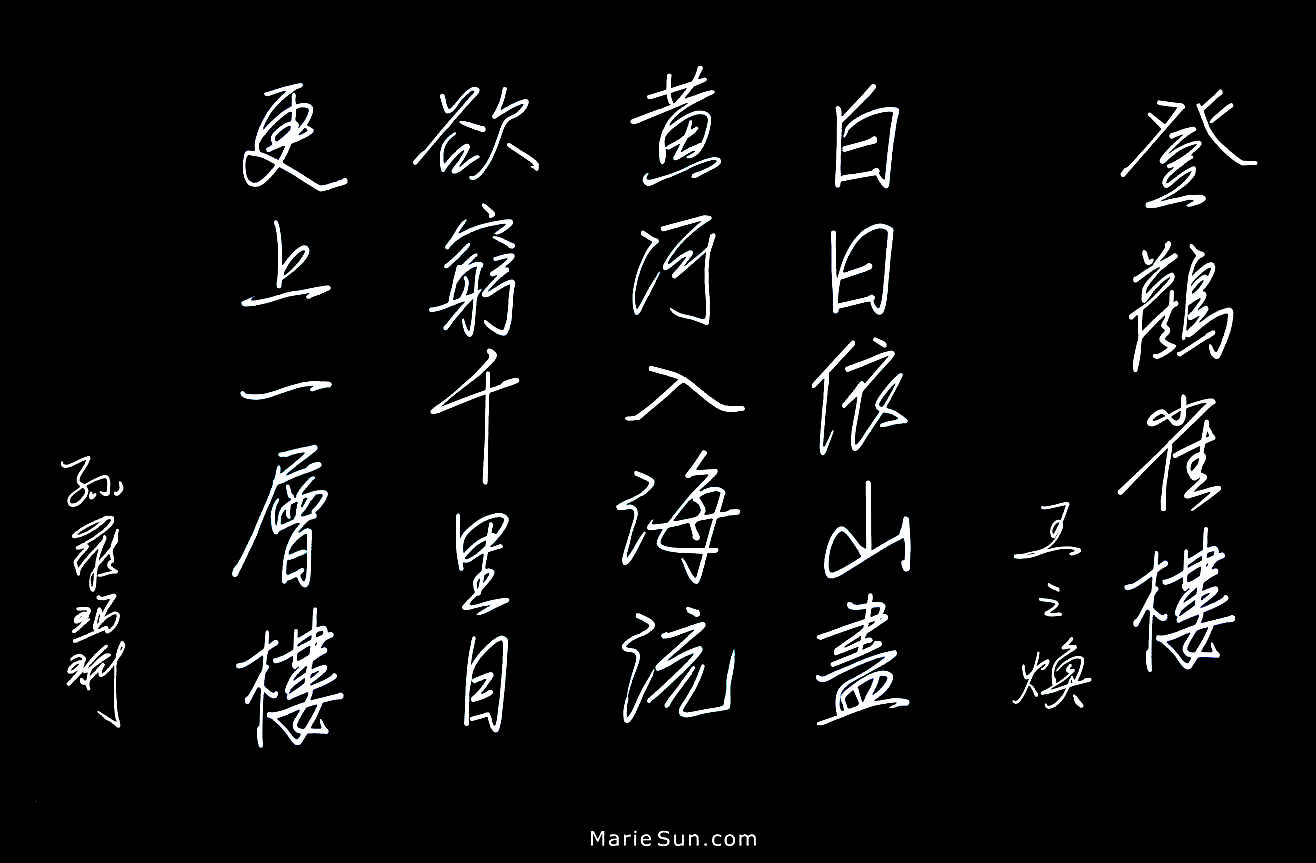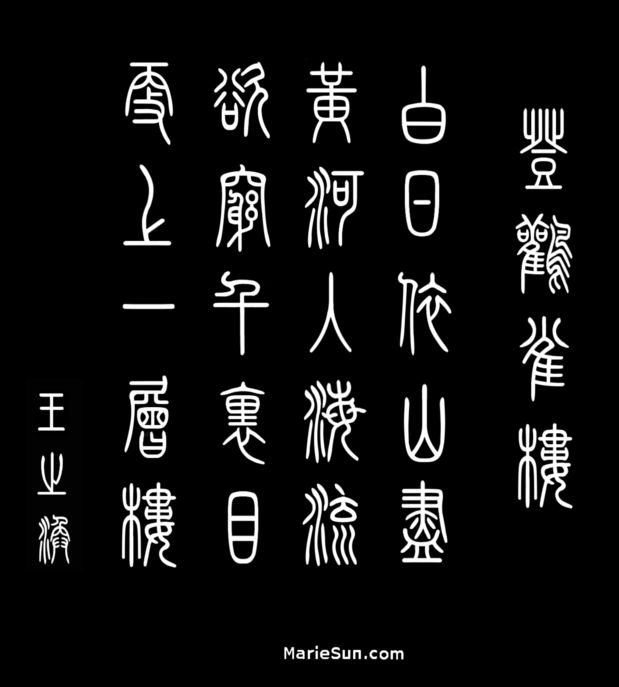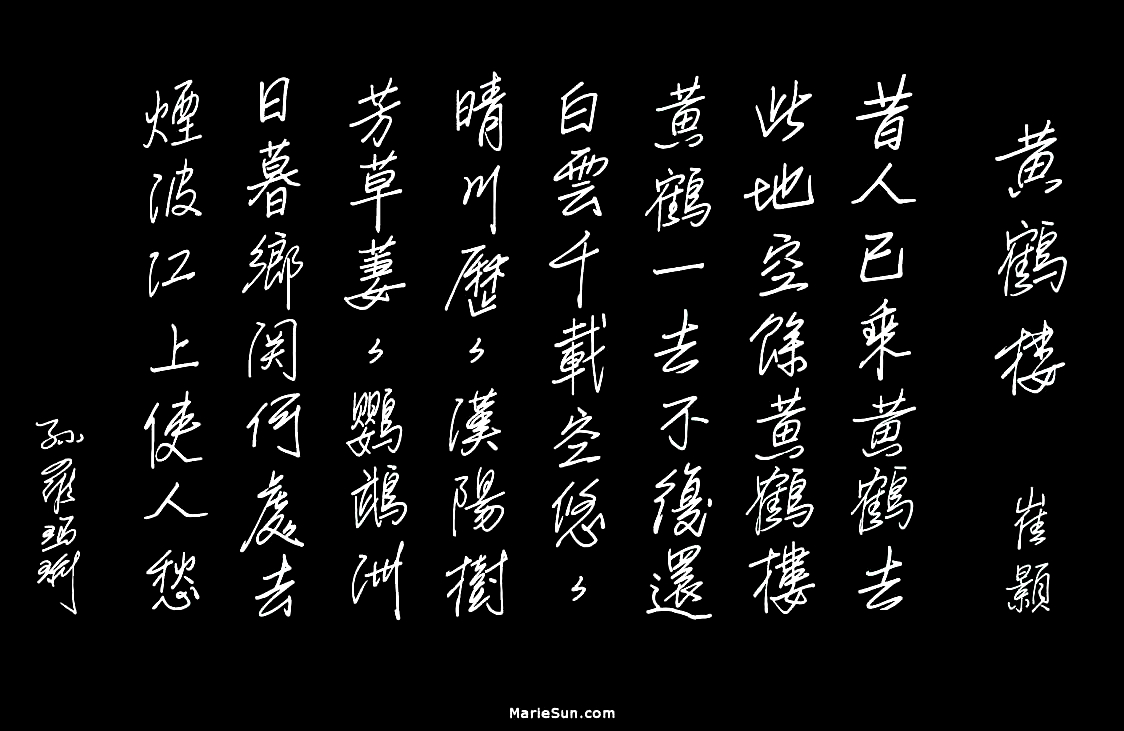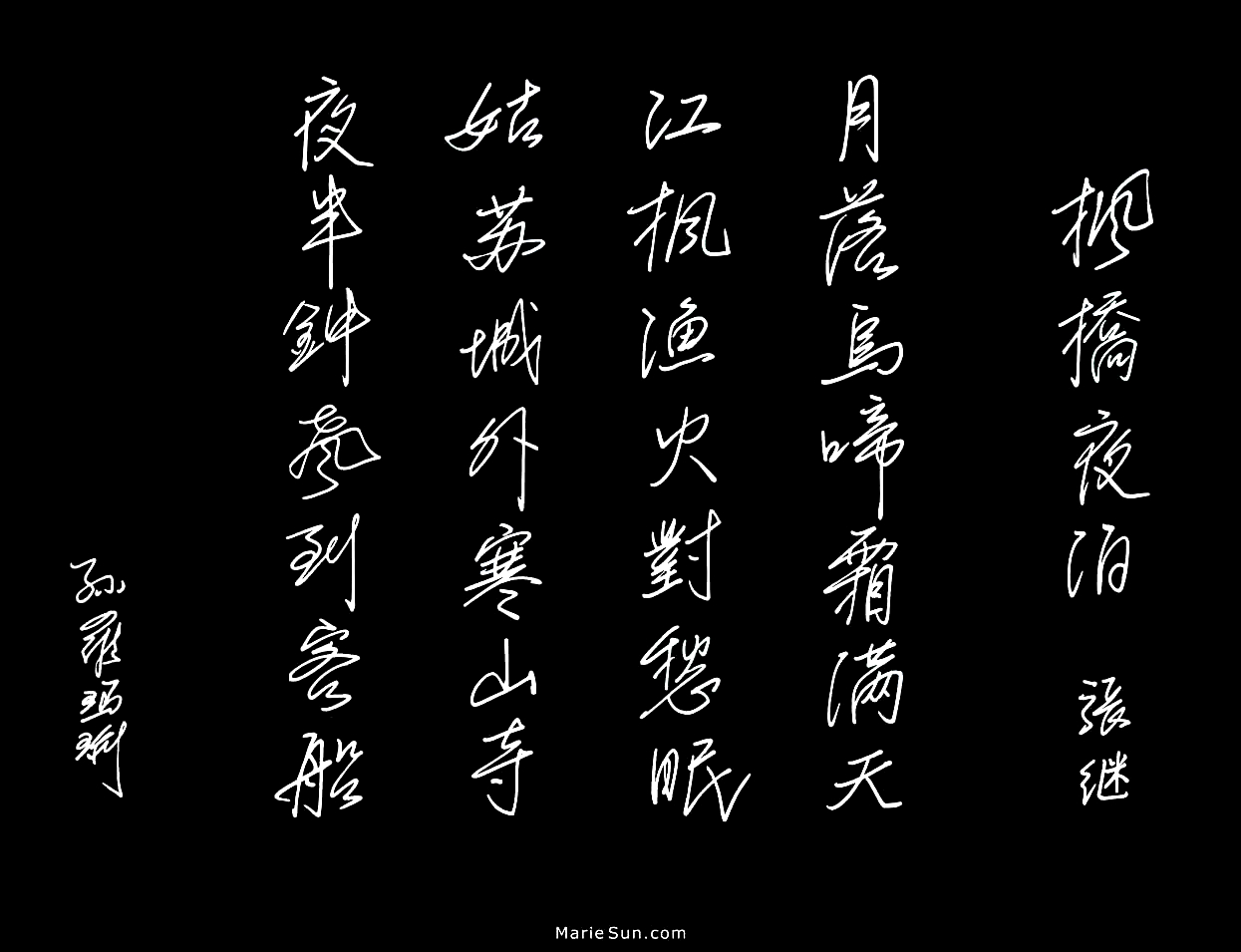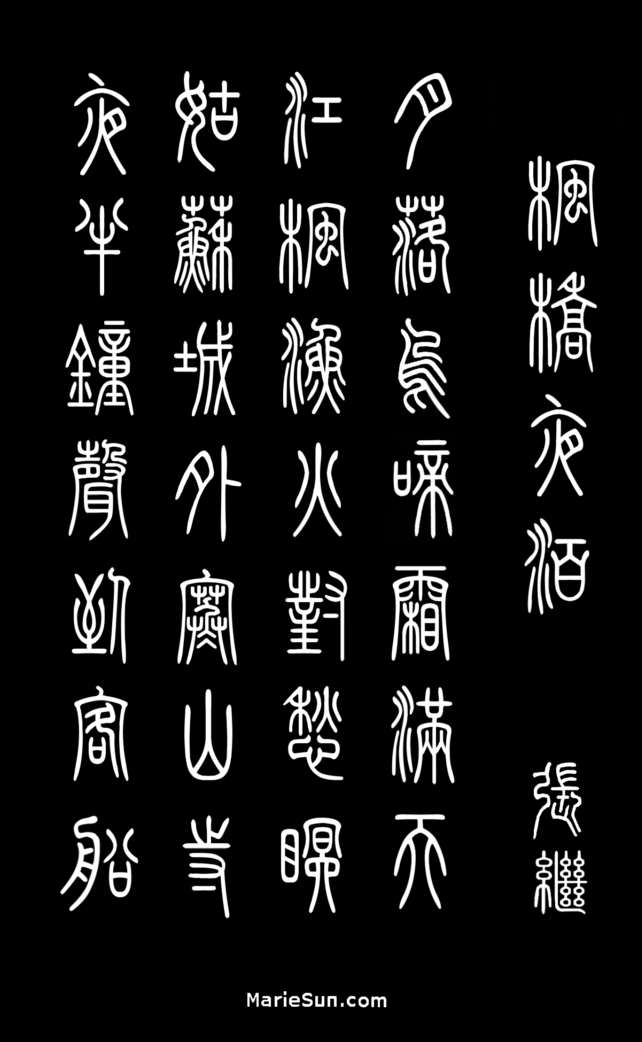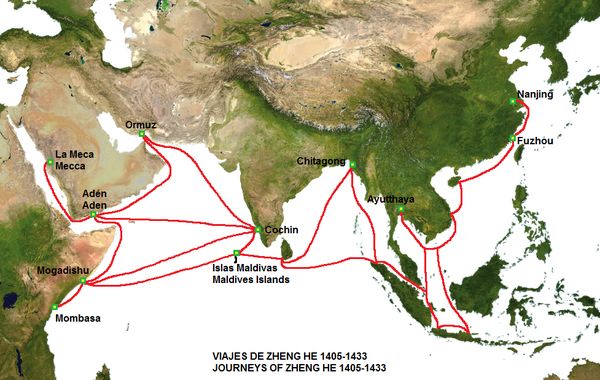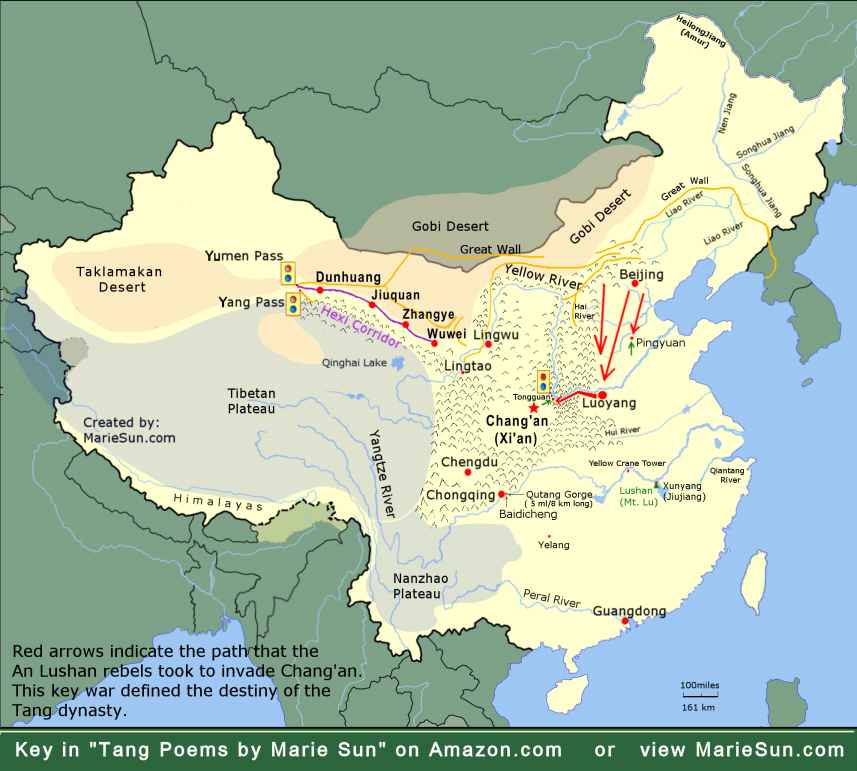Home
eBook (2) Marie only
Tang Poems ---
(volume 1)
25 top Tang Poems of the Tang Dynasty by 10 poets
Annotated with Chinese historical references and explanations
|
Authors: Marie L. Sun and Alex K. Sun
孙罗玛琍, 孙国強
(Mother and Son)
This eBook is published by
www.amazon.com
Authors' website:
www.mariesun.com
Twitter:
@mariesun88yes
(last updated on 2019/06/16: on
"去美亚买书指南" --- How to purchase this book on www.amazon.com )
 The calligraphy images in the book may be freely copied/screen snapshot
for educational or noncommercial purposes and uses of a legitimate nature (i.e., no gambling or pornography, etc.) with an attributional reference to "Marie Sun and Alex Sun" or "at MarieSun.com"; other uses require explicit, written authorization by Marie Sun or Alex Sun.
The calligraphy images in the book may be freely copied/screen snapshot
for educational or noncommercial purposes and uses of a legitimate nature (i.e., no gambling or pornography, etc.) with an attributional reference to "Marie Sun and Alex Sun" or "at MarieSun.com"; other uses require explicit, written authorization by Marie Sun or Alex Sun.
|
12 of the poems are presented with zhuanshu/zhuanzi calligraphy (see above) and the rest xingshu calligraphy.

|
 Tips: For beginners on how to purchasing kindle books: Tips: For beginners on how to purchasing kindle books:
Here is
the easiest way to purchase yourst kindle book, including “Tang Poems” or any other book at the US Amazon store and read it on your PC, Laptop, Mac, iPhone, iPad, Android phone, etc. You don’t even have to download any Kindle Applications or purchase any Amazon Kindle Readers/devices. It also provides special instructions for people located in China or certain other foreign countries. The book is published at Amazon.com.
|
Preview Table of Contents
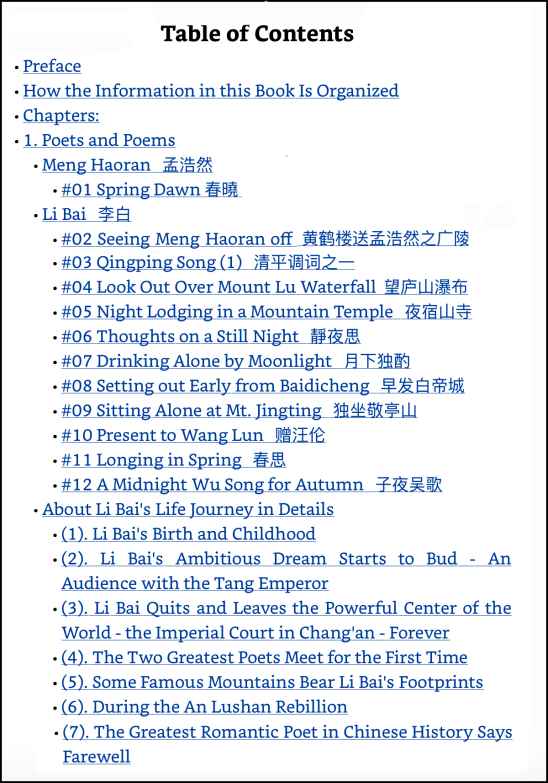
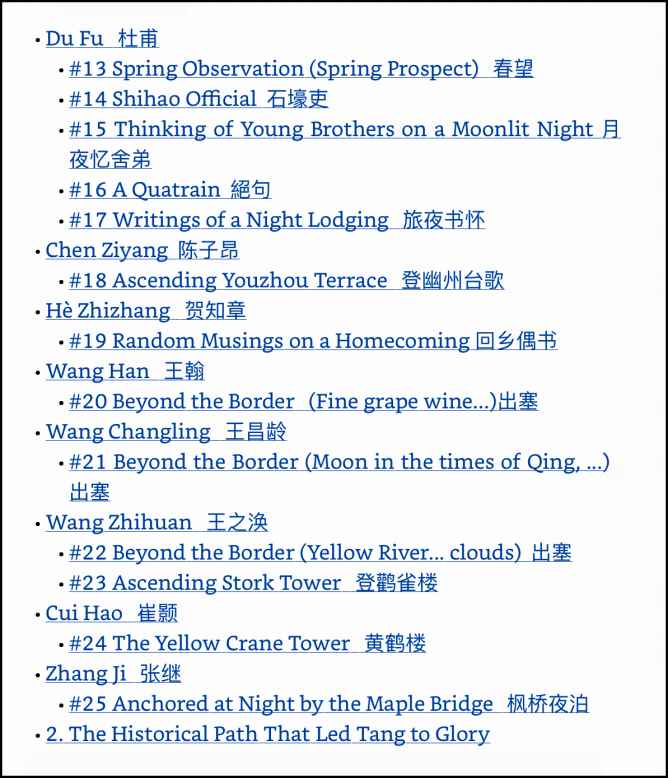
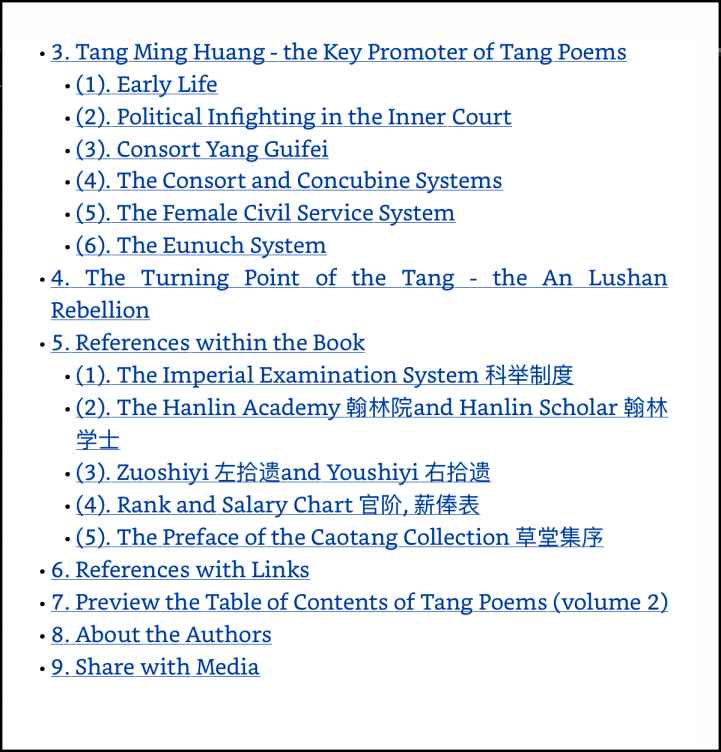
Preface
This book
is an expanded edition of
25 Tang Poems (volume 1). It
is dedicated to the memory of Marie's dear parents, Mr. Tieqing Luo and Ms. Wu Ma, who inspired Marie's early interest in and appreciation of Tang poetry and Chinese calligraphy.
The book is structured differently from any other book on Tang poetry. Rather than simply providing a translated poem in isolation, it provides in-depth historical and cultural background information surrounding the poem, accompanied by multimedia links to maps, images, and/or videos scripts, including recitations in Mandarin for each of the 25 poems. In this way, the reader can more fully understand and appreciate all the nuances of the poem in its Chinese cultural context.
In particular, this book provides information regarding
Tang era social structures, key turning points relating to the rise and fall of the Tang Dynasty, and the political machinations of imperial court life -- all of which informed the narrative of Tang poetry.
Of particular note is one singularly key figure of the Tang era -- Emperor Tang Ming Huang, who promoted poetry during his reign and led to its Golden age in Chinese history.
In keeping with the old adage that "a picture is worth a thousand words," image/video links are provided from time to time to accompany a poem to help put it in context:
The Great Wall thru Google,
Section of Silk Road in the desert thru Yahoo,
Hanging coffin thru Baidu, and
Installing coffin on towering cliff face thru YouTube, etc.
After more than 1,000 years of weather and war, the structures above may no longer retain all of their original glory, yet they still hint at the grandeur of a bygone golden era.
When translating Tang poems into English, the poems' forms, cadences,
and rhyming schemes are naturally difficult to replicate precisely.
This book attempts to retain the poems' original charm, flavor, and
soul, while adhering as closely as possible to those original forms,
cadence, and rhyming schemes.
The beauty of Tang poems is that they can evoke precise visions in an efficient conservation of words, forged into a euphonious stream of rhyme and cadence. These poems represent, and are witness to, archetypical human emotions and pondering reflecting the glory, passion, and tears of a unique era in Chinese history.
If you are not familiar with the history of the Tang, I encourage you to first read
Chapter 2 - The Historical Path that Led Tang to Glory before continuing with the rest of the book. The mood and subject matter of Tang poetry tended to reflect the relative strength and status of the state, such that a knowledge of the political history of the dynasty will give you more insight into the poetry.
* * *
When translating Tang poems into English, the poems' forms, cadences,
and rhyming schemes are naturally difficult to replicate precisely.
This book attempts to retain the poems' original charm, flavor, and
soul, while adhering as closely as possible to those original forms,
cadence, and rhyming schemes.
The essentialist, ambiguous,
and rhythmic spirit of Chinese poems is often lost in flourished occidental
translations trying to explain and make sense of too much. Chinese poems are often purposely designed to be ambiguous or open to interpretation. For example,
in most cases, there is no overt subject in Chinese poems, though the
first person viewpoint is usually understood. Thus, the subject "I" is
often inserted as the assumed viewpoint in occidental translations.
This book attempts to avoid such assumptions except in the most obvious cases.
I hope you will find pleasure and enjoyment in perusing this book, and that you will engage in interpreting the poems you come across in your own way and share them with your friends.
* * *
The co-author, Alex Sun, was born in the U.S.. At age 12, he was invited by his dear grandparents, Mr. Teiqing Luo and Ms. Wu Ma, in Taipei, Taiwan to study Chinese and experience Chinese culture for a year.
He went on to attend Georgetown University in the U.S., graduating from the Law School in 1992 and becoming a lawyer. While at Georgetown University, he also spent a year studying political science at Beijing University in Beijing, China from 1990 to 1991, and revisited and traveled around the country in later years.
Alex's natural interest in learning different languages, cultures and exploring his roots proved an immeasurable help in producing this book.
An enormous thanks also goes out to Scott Shay, a computer expert and linguist who has authored several college textbook from www.amazon.com/Scott-Shay/e/B002BLS206.
With his help, we have been able to publish our first eBook. Also thanks to Benjie Sun for his editorial help and Chung-Li Sun for his spiritual support.
Copyright
All rights reserved. The scanning, uploading, and/or distribution of this book via the Internet or via any other means without the permission of the authors is illegal and strictly forbidden.
How the Information in this Book Is Organized
This book is divided into several chapters, with the first containing the 25 chosen Tang poems organized by poets. Subsequent chapters provided
further general historical and background information.
In Chapter 1, the following information is provided for each poem:
(1). A brief biography of each poet, except for Li Bai and Du Fu, who are described in more detail, due to their seminal influence in the East Asian poetry world (in addition, there is an entire chapter devoted to Tang Ming Huang, the Emperor patron of poetry).
(2). Both traditional and simplified Chinese forms of the poem with pinyin annotations
(3). Recitation in mandarin for each poem
(4). Comments on the historical backdrop of the poem
(5). A glossary of terms and names mentioned in the poem
(6). images or videos relating to the poem or poet
(7). Representation of each poem in xingshu 行书 calligraphy; in addition, 12 poems are also presented in zhuanshu 篆书 calligraphy.
Chapters:
1. Poets and Poems
The following is the concise list of the 25 poems covered in this book that were chosen out of the most popular
Chinese poetry anthology of all time, namely, Three Hundred Tang Poems 唐诗三百首
compiled by Sun Zhu 孙洙 (1711 - 1778).
Most of the poems are presented after a brief biography of the poet. Because of the outstanding status in the poetry world,
extensive background information are provided for Li Bai and Du Fu.
Except for Meng Haoran, Li Bai, and Du Fu, all poets are listed roughly in chronological order, since reading their poems as such allows the reader to follow the historical rise and fall of the the Tang dynasty. Most of the most famous Tang poems, especially the ones related to the frontier, are closely related to the strength of the state. During the empire's early, prosperous years, the frontier poems were full of heroic spirit, such as poem #20 and #21; then during the downward spiral of the latter half of the dynasty, such poems began to reflect a more decadent and depressed mood.
Meng Haoran 孟浩然
Meng Hao'ran (689 or 691 - 740; lived during the Early and High Tang periods), a descendant of Meng Zi 孟子
(also known as Mencius, the famous Confucian philosopher) and grandfather of poet Meng Jiao 孟郊,
was born in
Xiangyang 襄阳 by the Han 汉 River in Hubei Province 湖北省 (Hubei, literally "lake 湖 north 北". The city is located to the north of Dongting Lake 洞庭湖 along the Yangtze River 扬子江/长江).
Meng was a famous landscape poet. Fifteen of his poems are included in the anthology "Three Hundred Tang Poems."
He sat for
the imperial examination 科举,
attempting to attain the degree title of "jinshi" 进士 at age 40,
but failed. After his brief pursuit of a career as a local official, he mainly lived in and
wrote about the area in which he was born and raised. The local
landscape, history, and legends were the subjects of his many
poems. So, too, were his journeys.
More than 10 years Li Bai's senior (and Li Bai's idol), he befriended Li in later adulthood. Meng also befriended Wang Wei 王维,
Wang Changling 王昌齡, and Wang Zhihuan 王之涣, among other poets.
Li Bai wrote many poems in admiration of Meng, among which are two famous ones --
"Presentation to Meng Haoran", and
"Seeing Men Haoran off at Yellow Crane Tower". The latter is included in this book.
Meng Haoran, as a prominent
landscape poet, had a major influence on poetry in the Early Tang era. This influence also extended into neighboring Asian countries, especially Japan, Korea, and Vietnam.
* * *
#01 Spring Dawn 春曉
Traditional Chinese
春曉 孟浩然
春眠不覺曉,處處聞啼鳥。
夜來風雨聲,花落知多少。
Simplified Chinese with *pinyin
春 晓 孟 浩 然
chūn xiǎo mèng hào rán
春 眠 不 觉 晓, 处 处 闻 啼 鸟。
chūn mián bù jué xiǎo, chù chù wén tí niǎo.
夜 来 风 雨 声, 花 落 知 多 少。
yè lái fēng yǔ shēng, huā luò zhī duō shǎo.
Recitation 1
Recitation 2
Recitation 1: How to listen to a recitation of the poem in Mandarin Chinese
and to view a transliteration into pinyin through Google. If click twice on the speak icon, it will
recite at a slower pace.
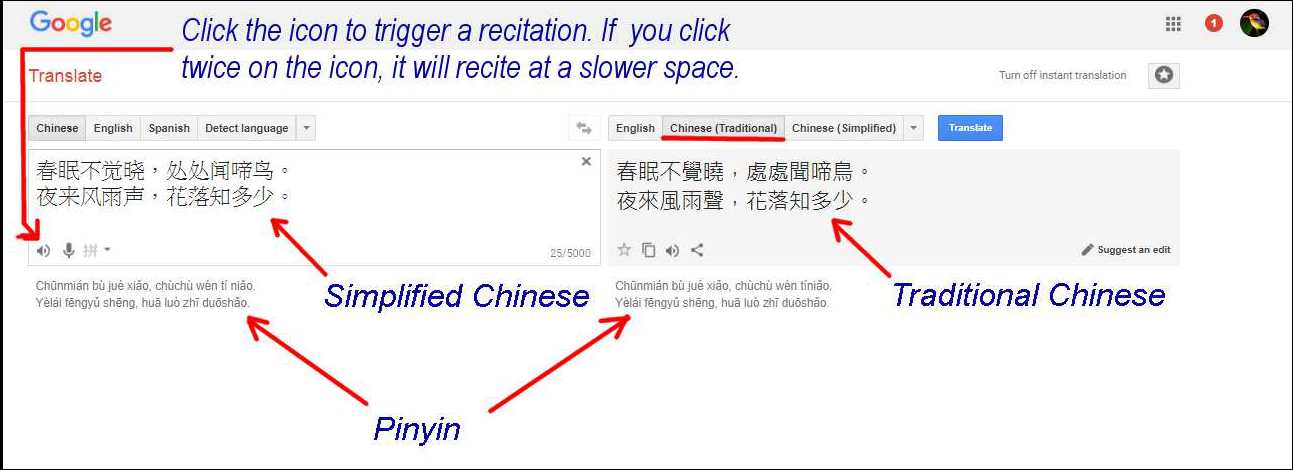
Recitation 2: Click and select one of the options to listen to a recitation.
* Pinyin 拼音:
Each Chinese Character has only one syllable. There are about 50,000 Chinese characters
(a person need only master two to three thousand, however, to be able to read newspapers) and several
tones are often used to differentiate words from each other. There are basically four tones in the Mandarin pinyin system.
For example:
| Pinyin |
Tone Symbols |
Tone Codes |
Tone Terms |
Chinese Characters |
English Meanings |
| ma |
none or
ˉ |
1 |
阴平 |
妈 |
mother |
| má |
ˊ |
2 |
阳平 |
麻 |
hemp or numb |
| mǎ |
ˇ |
3 |
上声 |
马, 玛, 蚂, 码 |
horse, agate, ant, code |
| mà |
ˋ |
4 |
去声 |
骂 |
scold |
Listen to the recitation of the above four tones - 妈, 麻, 马, 骂 (Mā, má, mǎ, mà) thru
Google US,
Google Hongkong or
Youtube.
The tones and cadence lead to the further enjoyment of the poems
as most of them are based on certain regulated
tone/cadence patterns and rhymes that enhance the ability of recitation and gracefulness. While reciting Tang poems in Mandarin is a delight,
it is even more so in the southern dialects of Chinese, such as Cantonese and Fujianese, which have preserved more than four tones, especially the tone of 入声 [Rù shēng] prevailed in dialects during the Tang period.
You may refer to the references at the end of the book for chanting poems in Cantonese or Mandarin with the tone of 入声 [Rù shēng].
* * *
Spring Dawn Meng Haoren
Indolent sleeping in spring,
I'm unaware morning's here.
Clearly I can hear,
Birds' twittering everywhere.
With last night's gust of wind and rain,
I'm wondering -
How many flowers
Have fallen and scattered.
* * *
Meng used plain and simple
words to describe a spring morning scene.
His poems are often filled with charming descriptions of nature.
Most of his landscape poems reflect beings and objects coexisting in natural harmony.
This was a reflection of his own life and pursuits - to live in the world without harming it or attempting to "conquer" it. But, rather, to preserve it as it was, and to be part of it and enjoy it.
Definitions and Interpretation of Characters, Terms, and Names:
If there are several meanings for a character or a term, the ones complying best to the poem's generally understood intent are listed first.
春晓: spring dawn 春: spring 眠: to sleep, to hibernate 不觉: unaware, hard to sense, unconsciously 晓: dawn, daybreak, to know, to tell
处处: everywhere, in all respects 闻: to hear, to smell, to sniff at 啼: to twitter, to sing, to cry, to weep aloud, to crow, to hoot
鸟: bird 啼鸟: bird's chirping, bird's twittering, bird's singing
夜: night 来: come, return 风雨: wind and rain 声: sound, voice, tone, noise
花: flower, blossom 落: fall, drop 知: to understand, to know, to be aware 多少: how many, how much, which (number), number, amount, somewhat
View the following images related to the poem:
1. Xiangyang, Hubei Province 襄阳, 湖北省 - Meng Haoran's hometown:
View thru Google or
Baidu.
2. Chinese calligraphy 春眠不觉晓书法:
view thru Google,
Baidu or
Yahoo Japan.
Throughout this book, the poems presented here as images follow the traditional Chinese manner - written in vertical columns from top to bottom and from right to left without punctuation:
|
Calligraphy in xingshu 行书 style
|
calligraphy in zhuanshu/zhuanzi 篆书/篆字 style
|
|
calligraphy in zhuanshu/zhuanzi 篆书/篆字 style
|
Li Bai 李白
Li Bai (701 - 762) lived mostly in the High Tang period and only a few years into the beginning of Mid Tang period; therefore, his writings often reflected the grandeur of the Tang Dynasty at the peak of its prosperity.
He was the most famous romantic poet in Chinese history, penned numerous masterpieces that are still memorized and chanted by Chinese of all ages today.
Due to his seminal role in Tang poetry, extra attention and detail has been given to his background, and a special section has been set aside at the end of all of his poems to address his history. As for the biographies of the other poets in this book, however, completely precede their poems.
* * *
#02 Seeing Meng Haoran off at Yellow Crane Tower 黄鹤楼送孟浩然之广陵
Traditional Chinese
黃鶴樓送孟浩然之廣陵 李 白
故人西辭黃鶴樓,
煙花三月下揚州。
孤帆遠影碧空盡,
唯見長江天際流。
Simplified Chinese with pinyin
黄 鹤 楼 送 孟 浩 然 之 广 陵
huáng hè lóu sòng mèng hào rán zhī guǎng líng
故 人 西 辞 黄 鹤 楼,
gù rén xī cí huáng hè lóu ,
烟 花 三 月 下 扬 州。
yān huā sān yuè xià yáng zhōu 。
孤 帆 远 影 碧 空 尽,
gū fán yuǎn yǐng bì kōng jìn ,
唯 见 长 江 天 际 流。
wéi jiàn cháng jiāng tiān jì liú 。
Recitation 1
Recitation 2
Seeing off Meng Haoran for Guangling at Yellow Crane Tower Li Bai
My old friend departs the west at Yellow Crane Tower,
On a journey to Yangzhou among March blossom flowers.
His lonely sail receding against the distant blue sky,
All I see but the endless Yangtze River rolling by.
* * *
In the spring of 728 at age 27, Li Bai heard that Meng Haoran
was going to take a trip to Yangzhou 杨州. Li Bai managed to travel to present-day Wuhan city in Hubei Province 武汉市, 湖北省
to meet with Meng for several days of adventure, after which they parted at the nearby Yellow Crane Tower. Li Bai wrote this famous poem describing the melancholic nature of his idol's departure.
The poem is filled with affection and paints a vision of a brilliant spring day pushed to the horizon by the endless and powerful Yangtze River. It is a vision and a force that also carries away the ardent heart of the poet as he watches his idol's lone boat vanish into the distant horizon.
Yangzhou (marked as number 1) is located near the eastern terminus of the Yangtze River. The Yellow Crane Tower lies between Chongqing and Yangzhou by the Yangtze River.
(This map may be freely copied from www.mariesun.com for educational or noncommercial purposes of uses with a reference to "Marie Sun and Alex Sun" or at "MarieSun.com".)
The map's outline is provided by
Joowwww [Public domain], via Wikimedia Commons.
Definitions and Interpretation of Characters, Terms, and Names:
广陵 Guangling: An old name for Yangzhou.
送: to see off , to send, to deliver, to carry, to give (as a present) , to present (with), 之: to
故人: old friend, the ancient 西: west
辞: to depart, to leave, to resign, to dismiss, to decline, to take leave, words, speech
烟花: full bloom of flowers, fireworks,
三月: March 下: going down, traveling down
孤: lone, lonely 帆: sail 远: far, distant, remote
影: shadow, picture, image, reflection,
碧空: the blue sky, the azure sky
尽: to the utmost, to end, to use up, to exhaust, to finish, exhausted, finished, to the limit (of something), to the greatest extent, extreme, within the limits of
唯: only, alone 见: to see, to meet
天际: horizon 流: to flow, to disseminate, to circulate or spread, to move or drift
View the following images related to the poem:
1. Meng Haoran visited the beautiful city of Yangzhou 扬州, which was the most prosperous city in the
Jiangnan 江南
region during the Tang Dynasty. "Jiangnan" literally means "River South", or "the Yangtze River South". Although Yangzhou lays on the north bank of the Yangtze River, northeast of present-day
Nanjing city, it became associated with the Jiangnan region by dint of its sheer wealth and prosperity.
The distance from Yellow Crane Tower to Yangzhou is about
330 mi/483 km (mi: miles, km: kilometers) as the crow flies, 460 mi/736 km as the river winds.
View Yangzhou thru Google,
Baidu,
Yahoo,
Yahoo JP,
Google Hong Kong,
or
Bing.
2. Being prosperous, Yangzhou has always been famous for its dessert dim sum:
View thru Google
or
Baidu.
3. They parted at the Yellow Crane Tower 黄鹤楼:
A famous, historical tower, it was first built in 223 AD, on Sheshan in the Wuhan, Hubei Province 武汊, 湖北省 by the Yangtze River. Warfare and fire destroyed the tower many times and it has been rebuilt several times.
View the tower as of today thru Google or
night scene thru Baidu.
4. Changjiang/Yangtze River 长江:
Also known as the Yangtze River 杨子江. It is the longest river in Asia, and the third longest in the world after the Nile and Amazon Rivers. It flows for about 3,900 mi/6,280 km from the glaciers of the Qinghai-Tibet Plateau eastward across southwest, central, and eastern China before emptying into the East China Sea at Shanghai.
View thru Google,
Baidu,
Yahoo,
Yahoo JP
or
Bing.
5. Chinese calligraphy 黄鹤楼送孟浩然之广陵书法:
View thru Google or
Yahoo.
#03 Qingping Song (1) 清平调词之一
Traditional Chinese
清平調之一 李白
雲想衣裳花想容, 春風拂檻露華濃。
若非群玉山頭見, 會向瑤臺月下逢。
Simplified Chinese with pinyin
清 平 调 之 一 李 白
qīng píng diào cí zhī yī lǐ bái
云 想 衣 裳 花 想 容,
yún xiǎng yī shang huā xiǎng róng,
春 风 拂 槛 露 华 浓。
chūn fēng fú kǎn lù huá nóng.
若 非 群 玉 山 头 见,
ruò fēi qún yù shān tóu jiàn,
会 向 瑶 台 月 下 逢。
huì xiàng yáo tái yuè xià féng.
Recitation 1
Recitation 2
Qing Ping Ballad ( 1 ) Li Bai
A dress imagined by clouds,
A look imagined by flowers,
Spring breezes caress the threshold,
Lustrous dew showers;
If no meeting occurs at the cluster of Jade Mountain peaks,
Then rendezvous at Jade Pavilion in the moonlight hours.
* * *
This was written at Sinking Incense Pavilion 沈香亭 as Tang Ming Huang and
Yang Guifei wandered among the *peonies -- highly regarded ornamental flowers
in Chinese tradition. At Tang Ming Huang's request, Li Bai wrote three poems -- Qing Ping Ballads I, II and III
on that day. After each poem was completed, the court orchestra would accompany a chanting of it
for the audiences to enjoy. The multi-talented Tang Ming Huang also appreciated music and had a talent for composing, but unfortunately none of his works are extant.
In Qing Ping Ballad I, Li Bai metaphorically describes Yang Guifei's charms and the indulgent pampering she enjoyed from the emperor.
The locations that Li Bai describes in the poem - Jade Mountain and Jade Pavilion - were inhabited by fairies in Chinese folklore,
implying that Yang was a creature from an otherworldly realm. Yang had indeed been living in a fairy tale for 12 years,
indulging in an extremely extravagant life style, courtesy of Tang Ming Huang. What she could not have imagined was
the unexpected and tragic fate that awaited her.
Definitions and Interpretation of Characters, Terms, and Names:
清 平 调 词 之 一: One of the Qing Ping Ballads 之 一: one of it
云: cloud 想: think, consider, speculate 衣裳: clothes 花: flower 容: looks, appearance, figure, form,
春风: spring winds 拂: brush away, shake off 槛: balustrade 露: dew, exposed 华: beautiful, flowery, illustrious, Chinese 浓: thick, strong, concentrated
若非: if not 群: group, crowd, multitude 玉: jade, precious stone, gem 山: mountain, hill
群玉山: In Chinese legend, this was the main Palace of the Queen Mother of the Western Paradise. Its name is due to the prolific jade deposits found in the mountain.
头: top, head, chief, first, boss 见: meet, see, perceive
会向: meet at 瑶: precious jade 台: pavilion, platform 瑶台: one of Queen Mother's palaces located in the legendary Kunlun Mountains.
月下逢: meet under the moon, implies romance in Chinese culture.
View the following images related to the poem:
1. Items and products produced and used in the Tang Dynasty:
View via Google ,
Yahoo or
Baidu.
2. Costumes in the Tang Dynasty:
View via Google or
Baidu.
3. Present-day entertainment world imitations of Tang clothing:
View via Google,
Yahoo or
Baidu.
4. *The peony 牡丹花 has been adored by all Chinese since ancient times.
It is not only considered a symbolic token of love by the Chinese, but is also believed to be a valuable medicinal plant. Chinese literati and poets have focused on the peony as the subject of a great many poems and brush paintings throughout history.
View peony via Google or
Baidu (Chinese brush paintings).
5. Chinese calligraphy 清平調之一书法:
View via Google or
Yahoo.
#04 Look Out Over Mount Lu Waterfall 望庐山瀑布
Traditional Chinese
望廬山瀑布 李白
日照香爐生紫煙,
遙看瀑布掛前川。
飛流直下三千尺,
疑是銀河落九天。
Simplified Chinese with pinyin
望 庐 山 瀑 布 李 白
wàng lú shān pù bù lǐ bái
日 照 香 炉 生 紫 烟,
rì zhào xiāng lú shēng zǐ yān ,
遥 看 瀑 布 挂 前 川。
yáo kàn pù bù guà qián chuān 。
飞 流 直 下 三 千 尺,
fēi liú zhí xià sān qiān chǐ ,
疑 是 银 河 落 九 天。
yí shì yín hé luò jiǔ tiān 。
Recitation 1
Recitation 2
Lookout over the Mount Lu Waterfall Li Bai
Sunlight illuminates the incense peak,
Sparking a purple haze,
I examine a distant waterfall
Hanging before the riverways;
Its flowing waters
Flying straight down three thousand feet,
I wonder -
Has the Milky Way been tumbling from heavenly space?
* * *
Li Bai's unrestrained imagination is fully expressed in the poem with concise, yet powerful words.
The mountain's scenery changes according to the season and is beautiful all year round, although summer is traditionally considered the best time of year to visit. A great many poets have been drawn to it to write about it since ancient times. Li Bai's "Lookout over the Mount Lu Waterfall" stands out among them all.
Definitions and Interpretation of Characters, Terms, and Names:
望: to look at, look forward, to hope, expect 庐山: Mt. Lu/Lushan - a famous summer resort.
瀑布: waterfall, cascade
日: sun, day, daytime 照: shine, illumine, reflect 香: fragrant, sweet smelling, incense 炉: furnace, fireplace, stove, oven 生: produce, create, give rise to, cause, life, living, lifetime, birth 紫: purple, violet 烟: smoke, soot, opium, tobacco, cigarettes
遥: far away, distant, remote 看: look, see, examine, scrutinize 挂: hang, suspend, suspense 前: in front, forward, preceding 川: river, stream, flow, boil
飞: fly, go quickly, dart, high 流: flow, circulate, drift, class 直: straight, erect, vertical 下: under, underneath, below, down, inferior, bring down 三: three 千: thousand, hundreds and hundreds, a great many,
尺: a measure in length in China. One Chinese foot is about 1.094 feet.
疑: doubt, question, suspect 是: indeed, yes, right, to be, 银: silver, cash, money, wealth 河: river, stream, yellow river
银河: Milky Way, Galaxy 落: fall, drop, net income, surplus 九: nine 天: sky, heaven, god, celestial
九天: the highest heavens, the heaven of the Taoists.
View the following images related to the poem:
1. Due to geomorphological erosion, the waterfall at Mt. Lu obviously
is much less powerful and spectacular than at the time when Li Bai visited some 1,200 years ago. 庐山瀑布:
View Three Tiled Springs 三叠泉 thru baike.baidu.com/pic/%E4%B8%89%E5%8F%A0%E6%B3%89/70190/1275986/e6508eef91f928bfce1b3eb5?fr=lemma#aid=1275986&pic=e6508eef91f928bfce1b3eb5.
View Lushan Falls thru Google or
Yahoo.
2. Chinese calligraphy 庐山望瀑布书法:
view thru Google or
Yahoo.
#05 Night Lodging in a Mountain Temple 夜宿山寺
Traditional Chinese
夜宿山寺 李白
危樓高百尺,手可摘星辰。
不敢高聲語,恐驚天上人。
Simplified Chinese with pinyin
夜 宿 山 寺 李 白
Yè sù shān shì lǐ bái
危 楼 高 百 尺, 手 可 摘 星 辰。
wéi lóu gāo bǎi chǐ, Shǒu kě zhāi xīng chén.
不 敢 高 声 语, 恐 惊 天 上 人。
Bù gǎn gāo shēng yǔ, kǒng jīng tiān shàng rén.
Recitation 1
Recitation 2
Night Lodging in a Mountain Temple Li Bai
Atop a tremulous tower hundreds of feet high;
My hand can pick the stars.
I dare not let out a roar though;
For fear of startling the gods.
* * *
While traveling among the mountains, Li Bai spent most nights lodging at temples. This is one that he stayed at.
The poem is rich in its sense of romanticism and humor. In just a few strokes, it brings out joyous wonder, a sense of mischief, and boyish cuteness.
It reveals Li Bai's unrestrained, innocent, and carefree
personality.
Definitions and Interpretation of Characters, Terms, and Names:
夜: night 宿: stay overnight
山: mountain, hill, peak 寺: temple, monastery, court, office
危: dangerous, precarious, high 樓: tower, building of two or more stories
高: high, tall, lofty, elevated 百: hundred, numerous, many 尺: a measure in length in China. One Chinese foot is about 1.094 English imperial feet.
手: hand 可: can, able, possibly 摘: pick, take, pluck 星: star, planet, any point of light 辰: early morning
星辰: star
不敢: dare not 高声: loud 语: talk, language, words, saying, expression
恐: afraid , frightened, to fear 惊: to be frightened, to be scared, alarm 天: heaven, god, celestial, sky
上: top, superior, highest, go up, send up 人: people, man, mankind, someone else
View the following images related to the poem:
1. Pursuing a simple lifestyle is one of the basic precepts of Taoism; even its temples conform to this idea. Li Bai was a Taoist sympathizer, and we can sense this from some of his poems.
A Taoist temple on top of a mountain.
View thru DailyMail.com,
Google,
Baidu,
Bing or
Yahoo.
2. Chinese calligraphy 夜宿山寺书法.
view thru Google or
Baidu.
#06 Thoughts on a Still Night 靜夜思
Traditional Chinese
靜夜思 李白
床前明月光,疑是地上霜。
舉頭望明月,低頭思故鄉。
Simplified Chinese with pinyin
靜 夜 思 李白
Jìng yè sī lǐ bái
床 前 明 月 光, 疑 是 地 上 霜。
chuáng qián míng yuè guāng, yí shì dì shàng shuāng。
举 头 望 明 月, 低 头 思 故 乡。
jǔ tóu wàng míng yuè, dī tóu sī gù xiāng 。
Recitation 1
Recitation 2
Thoughts on a Still Night Li Bai
Before the well lays the bright moonlight,
As if frost blanketing the earth.
My head tilts upwards at the glowing moon;
My head lowers with thoughts of home.
* * *
While on a trip far away from home, Li Bai staring out on a moon-lit night, standing by a well in a courtyard, overcame with a melancholic sense of loneliness
and nostalgia. Such an event inspired him to pen his most famous poem -
"Thoughts on a Still Night". This is one of the most popular poems of all time that almost all Chinese can recite by heart.
Admiring and contemplating a bright, full moon, is a Chinese tradition, especially for a traveler away from home. Chinese believe that when people look at a bright, full moon, while alone on a tranquil night,
their thoughts will naturally wander towards their beloved ones.
Several famous classical verses reflecting this popular conception include:
海上生明月,天涯共此時。-
When the bright moon breaks the surface of the sea,
All under heaven are one at this moment.
明月千里寄相思 -
The bright moon carries lovesickness a thousand miles (to reach a beloved one).
月是故鄉明 -
The moon is brighter over home (implies thinking about and missing beloved ones back in one's hometown.)
The moon represents a direct, shared spiritual connection, as it would be assumed that no matter what the physical distance was separating them, beloved ones would or could all be looking at the exact same moon at the exact same time, sharing the same thoughts of far away beloved ones in their hearts.
Li Bai's "Thoughts on a Still Night" has stirred feelings of homesickness in countless Chinese caught traveling far away from home on silent, moonlit nights, since the Tang Dynasty.
Why is the character "床" (sleeping bed, the structure of ...) translated as "well" in the poem?
While many school children (and translators!) take the Chinese character 床 to mean "bed" in its modern sense, it is more likely to refer to "the structures around a well" in its ancient sense. Ancient Chinese windows were often framed with decorative carvings
or/and overhead eave-like structures - specifically
to provide shading from sunlight (and prevent break-ins, as they could be shut and locked), but consequently also equally adept at preventing moonlight from entering a room.
It would thus seem unlikely that light could have entered a bed room expansively enough to be mistaken as frost by the bedside.
It is more likely that Li Bai was referring to the platform structure or fence skirting a well, which was an alternate ancient meaning of 床.
Li Bai also wrote another famous poem "Chang Gan Xing" "长干行" employing the character 床 in the sense of a wood structure surrounding a well -
Just starting to wear my hair banged,
I plucked flowers playing by the door.
He came on bamboo hobby-horse to the scene;
Circling the "well"
and pinching plums green.
Neighbors we were in Changgan alley,
Two little ones so trusting and carefree.
.
.
.
妾发初覆额,折花门前剧。
郎骑竹马来,绕
"床" 弄青梅。
同居长干里,两小无嫌猜。
.
.
.
There is no doubt that the "bed"
"床" here never meant a bed for sleeping.
Definitions and Interpretation of Characters, Terms, and Names:
靜 : quiet, still, calm, not moving 夜: think 思: to think, to consider
前: front, forward, ahead, ago, before, first, former, formerly
明月: bright moon 光: light, ray,
疑: to doubt, to suspect 是: is, are, am, yes, to be 地上: on the ground, on the floor
霜: frost, white powder or cream spread over a surface, frosting, (skin) cream
舉: to raise, to lift, to hold up 頭: head, the top, chief, boss, first, leading
望: to gaze (into the distance) , to look up, to look towards
低頭: to bow the head, to yield, to give in, to look down
思: to think, to consider 故鄉: home, homeland, native place
View the following images:
1. View architectural window style in Tang Dynasty
thru
Google or
Baidu.
2. View architectural window style in ancient China thru
Google or
Baidu.
3. View a well with a surrounding platform
thru Google
or
Yahoo.
4.
Search results from the
Kangxi Dictionary 康熙字典 (Wikipedia)
about "bed" "床":
"床" means both:
(1) a bed for sleeping or,
(2) a structure around a well.
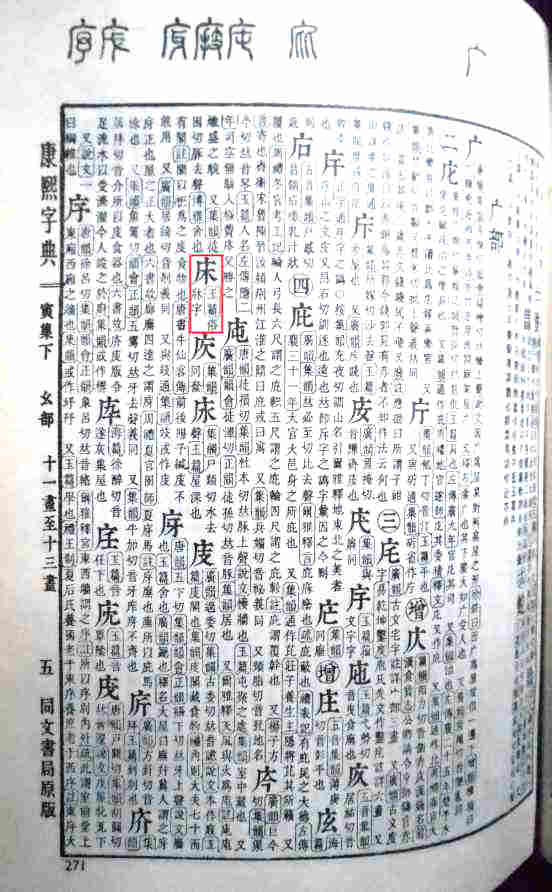

The character for "bed" 床 can also be written as 牀.


"又井榦曰牀" - "Again, the wooden structure around a well is called a bed".
"後園鑿井銀作牀" - "To dig a well in the back garden and fence it with stakes or other structures."
5. Chinese calligraphy 靜夜思书法:
view thru Google or
Yahoo.
#07 Drinking Alone by Moonlight 月下独酌
Traditional Chinese
月下独酌 李白
花間一壺酒,独酌無相親;
舉杯邀明月,對影成三人。
月既不解飲,影徒隨我身;
暫伴月將影,行樂須及春。
我歌月徘徊,我舞影零亂;
醒時同交歡,醉后各分散。
永結無情遊,相期邈雲漢。
Simplified Chinese with pinyin
月 下 独 酌 李 白
yuè xià dú zhuó lǐ bái
花 间 一 壶 酒, 独 酌 无 相 亲;
huā jiān yī hú jiǔ, dú zhuó wú xiāng qīn,
举 杯 邀 明 月, 对 影 成 三 人。
jǔ bēi yāo míng yuè,duì yǐng chéng sān rén.
月 既 不 解 饮, 影 徒 随 我 身;
yuè jì bù jiě yǐn,yǐng tú suí wǒ shēn,
暂 伴 月 将 影, 行 乐 须 及 春。
zàn bàn yuè jiāng yǐng,xíng lè xū jí chūn
我 歌 月 徘 徊, 我 舞 影 零 乱;
wǒ gē yuè pái huái, wǒ wǔ yǐng líng luàn
醒 时 同 交 欢, 醉 后 各 分 散。
xǐng shí tóng jiāo huān, zuì hòu gè fēn sàn
永 结 无 情 游, 相 期 邈 云 汉。
yǒng jié wú qíng yóu, xiāng qī miǎo yún hàn
Recitation 1
Recitation 2
Drinking Alone by Moonlight Li Bai
A jug of wine amidst the flowers,
I drink alone with no soul around.
I raise my wine cup to the moon and invite her down;
Now we are three with my shadow.
The moon, she does not drink,
And my shadow follows my every move;
But for the moment,
The moon is my partner and I hang with my shadow.
To enjoy life is to take advantage of youth.
I sing, the moon hovers all around;
I dance, the shadow follows in a messy stumble.
Lucid, we enjoy each other knowingly;
In drunken sleep, we go our separate ways.
Bound to forever travel carefree,
We shall meet again in cosmic paradise.
* * *
Li Bai was a wine lover. Wine seemed to be catalyst that could ignite his poetic prowess with such speed
that he could reportedly pen a poem in a matter of seconds after a few drinks. Thus, he was accorded the name of Jiouxian 酒仙, literally, "wine immortal."
As a wine connoisseur he wrote numerous poems on the subject. "Drinking Alone by Moonlight" is one of the most famous among all
"wine poems" written by East Asian poets through the ages. Induced by just a jug of wine, Li Bai dances into a fanciful world; and by the magic of his pen brush, he brings the reader along with him into his fantastical reverie.
Definitions and Interpretation of Characters, Terms, and Names:
月: moon, month
月下: under the moon
独酌: drinking alone
其 一 : article 1, page 1 one of ..., poem 1 of ...
花間: amidst the flowers
壶: jug, pot, kettle
一壶酒: a jug of wine
无: not to have, no, none, not, to lack
相親: to be deeply attached to each other
舉杯: to toast (with wine etc), to drink a toast 邀: to invite, to request, to intercept, to solicit, to seek
明月 : bright moon 对: couple, pair, right 影: shadow, picture, image, film, movie, photograph, reflection
对影: pair with the shadow
成: to become, to turn into, to complete, to accomplish, to be all right, OK!
既: since, already 不解: to not understand, to be puzzled by, indissoluble 饮: to drink
徒: to no avail, only, disciple, apprentice, on foot, bare or empty
隨: to follow, to comply with, varying according to...
我: I, me, my 身: body
暂: temporary
伴: partner, companion, comrade, associate, to accompany
将影: 将就影子 go along with the shadow
行乐: have a good time, 须: must, to have to 及: in time for, and, to reach, up to 春: youthful, springtime, joyful, lust 及春: catch the moment while still in youth, catch the moment of the spring
歌: song, to sing 徘徊: to hover around, to linger, to hesitate, to pace back and forth
舞: dance 零乱: in disorder, a complete mess
醒: to wake up, to awaken, to be awake 时: time 同: together, like, same, similar, alike, with 交欢: to have cordial relations with each other, to have sexual intercourse
醉: intoxicated, drunk 后: after, afterwards, back, behind, rear, later 各: each, every 分散: to scatter, to disperse, to distribute
永: forever, always, perpetual 结: knot, sturdy, bond, to tie,
无情: pitiless, ruthless, merciless, heartless.
无情: here can be interpreted as 忘情 (忘卻世俗之情, 不动感情, 淡然处事) which means to ignore the secular rules, to be carefree, to be unruffled by emotion, to be unmoved, to be indifferent, to not take things seriously, without a worry and care in the world
游: to travel, to walk, to tour, to roam, to swim
相期: expect to meet
邈: far, distant, remote, slight
云漢: heaven, Milky Way, land of divine, place of exquisite natural beauty
View the following images related to the poem:
1. Cups and vessels in the Tang Dynasty 唐代酒具 (In the Tang Dynasty, Chinese rarely used glass for wine or beverages, as glass was rare at that time): View wine cups thru Google,
wine vessels thru Baidu or Yahoo.
2. Luminous cup 夜光杯 - another wine vessel made of jade in the Tang Dynasty:
View thru Google or
Baidu.
3. Chinese calligraphy 月下独酌书法: view thru Google or Yahoo.
#08 Setting out Early from Baidicheng 早发白帝城
Traditional Chinese
早發白帝城 李白
朝辭白帝彩雲間,
千里江陵一日還。
兩岸猿聲啼不盡,
輕舟已過萬重山。
Simplified Chinese with pinyin
早 发 白 帝 城 李白
Zǎo fā bái dì chéng lǐ bái
朝 辞 白 帝 彩 云 间,
zhāo cí bái dì cǎi yún jiān,
千 里 江 陵 一 日 还。
qiān lǐ jiāng líng yī rì huán.
两 岸 猿 声 啼 不 尽,
liǎng àn yuán shēng tí bù jìn,
轻 舟 已 过 万 重 山。
qīng zhōu yǐ guò wàn chóng shān.
Recitation 1
Recitation 2
Setting Out Early from Baidicheng Li Bai
With Baidi enshrouded in tinted clouds,
I left at early dawn,
Returning a thousand miles to Jiangling
in a day.
While the sounds of apes roared endlessly from both sides of the riverbanks,
My light skiff has already sailed past a myriad of mountains.
Definitions and Interpretation of Characters, Terms, and Names:
早: early, morning, Good morning! 發: to send out
白帝城: An ancient temple located on a hill on the north shore of the Yangtze River to the east side of Chongqing, Sichuan Province, 重庆, 四川省.
(note: some characters have more than one pronunciation and have completely different meanings when set in compound words. Here, only the most obvious and contextually logical meanings are provided)
Two ways to pronounce 朝:
(1). zhāo - morning, day,
morning sun 朝陽, day and night 朝夕
(2). cháo - a dynasty 朝代, an imperial court 朝廷, to be received in audience by a sovereign 朝見
辞: to take leave, to resign, to dismiss, to decline 彩云: rosy clouds
间: in the middle of
千: thousand, a great many
里: also called huali 华里, a measurement of distance in China. The length of a "li" 里 has varied during the course of China's long history. Traditionally, one li was equal to about 0.31 English imperial miles or 0.5 kilometer. Thus, 1,000 li is about 310 mi/500 km.
江陵: a city's name.
一日: one day
还: return, arrive
两: two
岸: bank, shore, beach, coast
猿声啼: the sound of ape's roaring
不尽: not stop, endlessly
(Some versions use 两岸猿声啼不 "住" instead of 两岸猿声啼不 "尽"; both have the same meaning.)
轻: light, easy, gentle, soft, unimportant, small in number
舟: skiff, boat
过: pass through
已过: has passed through
万: ten thousand, thousands and thousands, a great many
Two ways to pronounce 重:
(1). chóng: repeat, repetition, again -
万重山: tens of thousands of mountains, thousands of thousands of mountains, numerous mountains;
重覆: repeat
(2). zhòng: heavy -
重要: important,
重量: weight
View the following images related to the poem:
1. Vistas scattered along the Yangtze River tracing Li Bai's journey from Baidicheng to Jiangling:
(1). Baidicheng 白帝城: The name literally means "City of the White Emperor".
View thru Baidu
or
Google.
Baidicheng faces the western entrance of the Qutang Gorge and Kui Gate 瞿塘峡 和 夔门 with an awesome spectacular view.
View thru Baidu or
Google.
(2). The Ancient Plank Road around the Qutang Gorge 瞿塘峡古栈道:
View thru Google or
Baidu.
(3). Hanging coffins 悬棺 on cliffs along the Qutang Gorge near Baidicheng:
View thru Google,
Baidu,
Bing
or
Yahoo.
(4). Solve the puzzle -- how were the hanging coffins placed on the soaring cliff faces thousands of years ago (some were placed 3,000 years ago)?:
View thru YouTube (25 minutes with English captions)
(thru YouTube 2:10 minutes)
or
select one from the YouTube videos.
(5). Jiangling 江凌: present-day Jingzhou city, in Hubei Province 荊州市, 湖北省 on the north shore of the Yangtze River. It served as the capital of several small kingdoms in ancient China. Under the Tang Dynasty, it served as the southern capital and was known as Nandu 南都.
View historic site thru Google
or
Baidu.
2. Chinese calligraphy 早发白帝城书法:
view thru Google or
Yahoo.
Li Bai wrote the following four poems years before he went into exile to Yelang.
#09 Sitting Alone at Mt. Jingting 独坐敬亭山
Traditional Chinese
獨坐敬亭山 李白
眾鳥高飛盡, 孤雲獨去閑。
相看兩不厭, 唯有敬亭山。
Simplified Chinese with pinyin
独 坐 敬 亭 山 李 白
dú zuò jìng tíng shān lǐ bái
众 鸟 高 飞 尽, 孤 云 独 去 闲。
zhòng niǎo gāo fēi jìn, gū yún dú qù xián.
相 看 两 不 厌, 唯 有 敬 亭 山。
xiāng kàn liǎng bú yàn, wéi yǒu jìng tíng shān .
Recitation 1
Recitation 2
Sitting Alone on Jingting Mountain Li Bai
Flocks of birds soar out of sight;
A lone cloud wanders away at leisure.
Not minding each other's tender glances,
All that remains is Jingting Mountain!
* * *
Jingting Mountain 敬亭山 is located north of Xuanzhou city in Anhui Province 宣州城, 安徽省, by the Shuiyang River 水阳江.
Li Bai visited the mountain at least seven times and wrote many poems about it -- this being the most famous one.
The mountain is actually a small range that contains about 60 peaks and sub-peaks and stretches for about 3 miles. The main peak is
about 300 meters above sea level. A multitude of scenic spots, springs, streams, and pavilions dot the mountain, and it was a famous resort during the Tang Dynasty.
Its picturesque scenery has been the the frequent subject of poetry and artwork.
The nearby city of Xuanzhou has been famous for its xuan paper 宣紙
since the Tang Dynasty. Today it is the major wholesale center for xuan paper. Xuan paper is renowned for being soft
and finely textured, suitable for both Chinese calligraphy and painting.
In 753, Li Bai visited Jingting Mountain by himself. Upon arriving, he noticed the chirping birds had all already left, and the clouds had all wandered away. Rather than finding himself alone and abandoned,
Li Bai viewed the verdant mountain itself like a living creature and dear companion. Thus, in any situation, he could always always find and see enjoyment.
Definitions and Interpretation of Characters, Terms, and Names:
独坐: sit alone
众:multitude, crowd, masses 鸟: bird 高: high, tall, lofty, elevated 飞:fly, go quickly, dart, high 尽: exhaust, use up, deplete
孤: lone, lonely 云: cloud 独: alone, single, sole, only 去: to go, to go to (a place), to cause to go or send , to remove, to get rid of 閑 : stay idle, to be unoccupied, not busy, leisure
相看: to look at one another, to look upon 兩: two, both 不厭: not tire of, not object to
唯: only, 有: have, has
View the following images related to the poem:
1. Jingting Mountain 敬亭山:
View thru Baidu
or
Google .
2. Chinese calligraphy 敬亭山书法:
view thru Google or
Yahoo.
#10 Present to Wang Lun 赠汪伦
Traditional Chinese
贈汪倫 李白
李白乘舟將欲行,忽聞岸上踏歌聲。
桃花潭水深千尺,不及汪倫送我情。
Simplified Chinese with pinyin
赠 汪 伦 李 白
Zèng wāng li bái
李 白 乘 舟 将 欲 行,
lǐ bái chéng zhōu jiāng yù xíng,
忽 闻 岸 上 踏 歌 声。
hū wén àn shàng tà gē shēng 。
桃 花 潭 水 深 千 尺,
táo huā tán shuǐ shēn qiān chǐ ,
不 及 汪 伦 送 我 情。
bù jí wāng lún sòng wǒ qíng 。
Recitation 1
Recitation 2
Presented to Wang Lun Li Bai
Getting on board and ready to go,
Suddenly I heard the stomping and singing sound from the shore.
The Peach Blossom Pond is a thousand feet deep,
Yet not as deep as the friendship Wang Lun showed at my departing.
* * *
In 755 at age 54, Li Bai traveled to Peach Blossom Pond, Jing county, Anhui Province 桃花潭, 泾县, 安徽省.
The day before Li Bai's departure, Wang Lun, a commoner friend of his, had thrown a farewell party for Li and told him that he would be unable to see him off the next morning due to another appointment.
Actually Wang Lun had planned a big surprise farewell send-off for Li Bai by organizing a group of friends to chant poems on the
shore right before Li Bai's departure.
In ancient China, people chanted poems, in similar fashion as did the ancient Greeks with their odes, as opposed to simple readings or recitations. This poem reveals just how much the custom of chanted poems had permeated all segments of society during the Tang Dynasty.
The verses "The Peach Blossom Pond is a
thousand feet deep, yet not as deep as the friendship Wang Lun showed at my departing" "桃花潭水深千尺,不及汪伦送我情" has since long been used to describe the feelings between sincere friends who are parting.
Definitions and Interpretation of Characters, Terms, and Names:
赠: to give as a present 汪伦: a friend of Li Bai
李白: our famous Tang poet 乘: ride: amount 舟: boat 将: will, shall 欲: desire, appetite, passion, lust, greed
There are two ways to pronounce 行 in Mandarin, each with different meanings:
(1). xíng -
to go, to travel, capable, competent, all right, OK!, will do. Examples -
He can do it, He's able to do it: 他行 tā xíng.
pedestrian: 行人 xíng rén
A type of Chinese calligraphy: 行书 xíng shu
planet: 行星 xíng xīng
do charitable work: 行善 xíng shàn
behavior: 行为 Xíng wéi
(2). háng -
rank, file, store, situation. Examples -
a line of ducklings: 一行小鸭
three lines of cars: 三行车队
bank: 银行 yín háng
expert: 行家 háng jiā
market quotations: 行情 háng qíng
shop, store: 行号 háng hào
How this line "一行行人" should be read:
一行 (háng) 行 ( xíng) 人, yī háng xíng rén: a line of pedestrians
忽闻: to hear suddenly, to learn of something unexpectedly 岸上: ashore 踏: to tread, to stamp, to step on, to press a pedal 歌声: singing voice, chanting poem
桃: peach 花: flower, blossom 潭: deep pool, pond 桃花潭: Peach Blossom Pond, located at present-day Jing county, Anhui Province 泾县, 安徽省.
水深: depth of waterway 千: thousand, hundreds and hundreds, a great many
尺: a measure of length in China equal to about a foot. One Chinese foot is about 1.094 English imperial feet.
不及: to fall short of, not as good as
送: to see off, to deliver, to carry, to give (as a present), to present (with), to send
我: I , me 情: passion, feeling, emotion
View the following images related to the poem:
1. Peach Blossom Pond in present-day Jing county, Anhui Province.
桃花潭:
View thru Google or
Baidu.
2. Chinese calligraphy 赠汪伦书法:
view thru Google or
Yahoo.
#11 Longing in Spring 春思
Traditional Chinese
春思 李白
燕草如碧絲, 秦桑低綠枝;
當君懷歸日, 是妾斷腸時。
春風不相識, 何事入羅幃?
Simplified Chinese with pinyin
春 思 李 白
chūn sī lǐ bái
燕 草 如 碧 丝, 秦 桑 低 绿 枝;
yàn cǎo rú bì sī, qín sāng dī lǜ zhī;
当 君 怀 归 日, 是 妾 断 肠 时。
dāng jūn huái guī rì, shì qiè duàn cháng shí.
春 风 不 相 识, 何 事 入 罗 帏?
chūn fēng bù xiāng shí, hé shì rù luō wéi
Recitation 1
Recitation 2
Longing in Spring Li Bai
Yan grasses like strands of emerald jade silk,
Qin mulberries weighing down branches green.
The day when your sire thinks of coming home,
Is when this lady's heart will be dying in tortured waiting.
O! Spring breeze - I dare not know you,
Why slip into the silk curtain surrounding my bed?
* * *
Li Bai uses symbolic imagery to delicately portray the
mood of a young woman
whose amorous feelings are aroused by the onset of spring,
but who has no way to satisfy them, except through a deep yearning for
her husband stationed far away. Yet a
gently, titillating spring breeze blows into her bedroom to
tease and arouse her even more.
Li Bai could be said to have had an intricate and precise understanding of women.
Definitions and Interpretation of Characters, Terms, and Names:
春思: longing in spring
燕: Yan, located in present-day northern Hebei 河北 Province and western Liaoling 辽宁 Province -- the frontier in the Tang Dynasty. Hundreds of thousands of soldiers were stationed there, including, no doubt, the husband of the young lady in the poem.
草: grass, lawn, straw 如: as, as if, such as , 碧丝: green jade, bluish green, blue, jade, blush green silk, blue silk
秦: Qin, located in present-day Shanxi 陕西 Province. During the Tang Dynasty, a great many soldiers were drafted from this area and sent to
the bordering Yan area to guard the country.
桑: mulberry 低: low, beneath, to lower (one's head), to let droop, to hang down, to incline 绿枝: green branch
当: when, to be, to act as, during 君: you (a respectful form of address towards a man), monarch, lord, gentleman, ruler 怀: to think of, mind 归日: return day
是: is, are, am, yes, to be 妾: a polite term used by a woman in olden days to refer to herself when speaking to her husband, concubine
断肠: heartbroken. However, in the poem, it may imply to be heart-pounding, like butterflies in the stomach 时: time, o'clock
春风: spring breeze, good education, happy smile, sexual intercourse 不: no, not 相识: acquaintance, to get to know each other
何: what, how, why, which 事: matter, thing 入: to enter, to go into, to join 罗帏: curtain of thin silk (around the bed), women's apartment, tent
View the following images related to the poem:
1. Locations that the young wife's husband might have been deployed to and stationed:
(1). The Great Wall garrison bases in Hebei Province 河北长城戍地:
View thru Google or
Baidu.
or
(2). The Great Wall garrison bases in Liaoning Province 辽宁长城戍地:
View thru Google,
Baidu or
Yahoo.
2. Mulberry 桑 (the mulberry leaves are the sole food source for the silkworm.):
View thru Google or
Yahoo.
3. Chinese calligraphy 春思书法:
View thru Google or
Yahoo.
#12 A Midnight Wu Song for Autumn 子夜吴歌
Traditional Chinese
子夜吳歌 - 秋歌 李白
長安一片月,萬戶擣衣聲。
秋風吹不盡,總是玉關情。
何日平胡虜,良人罷遠征。
Simplified Chinese with pinyin
子 夜 吴 歌 - 秋 歌 李 白
zǐ yè wú gē - qiū gē lǐbái
长 安 一 片 月, 万 户 捣 衣 声。
cháng'ān yī piàn yuè, wàn hù dǎo yī shēng.
秋风吹不尽, 总是玉关情。
qiū fēng chuī bù jìn, zǒng shì yù guān qíng.
何日平胡虏, 良人罢远征。
hé rì píng hú lǔ, liáng rén bà yuǎn zhēng.
Recitation 1
Recitation 2
A Midnight Wu Song for Autumn Li Bai
Chang'an is framed by the moon,
Sounds of cloth pounding in a myriad homes.
The autumn winds blow without end,
Laying emotions ever at Jade Gate.
When will the Huns be pacified?
So that our men may quit their distant campaign.
* * *
The purpose of pounding fabrics was to render the course textile softer for easier sewing.
This is a famous painting -- "Pounding Fabrics Painting" "捣练图" - created by court painter Zhang Xuan 张萱 in the Tang Dynasty.

(source:
ru.wikipedia(Original text : MFA Boston),公有領域,https://commons.wikimedia.org/w/index.php?curid=7855380).
View other images of pounding fabrics in China
thru Google or
Baidu.
* * *
During the High Tang period, the royal court constantly deployed heavy military brigades to remote frontier regions to guard the border. The Jade Gate/Yumen Pass was situated in one of the major frontier areas. Autumn was the season in which the government always organized extra postal dispatches to help families deliver winter clothes to their beloved ones stationed in these areas. On a moon-lit night, the chilly autumn wind would carry the pounding sound, along with deep longings and blessings, from Chang'an all the way to the Jade Gate - the strategic military stronghold at the westernmost extension of
the Great Wall.
Definitions and Interpretation of Characters, Terms, and Names:
子夜: midnight 吴歌 the name of a tune in the Tang Dynasty which can be traced back to the state of Wu; therefore, it is also called Wu 吴 song 歌.
长安: Chang'an, the capital of Tang, present-day Xi'an city in Shanxi Province 西安市, 山西省 一: one, a, an, alone 片: slice, splinter, strip 月: moon; month
万: ten thousand, thousands and thousands, a great many, innumerable 户: door, family 捣: beat, attack, hull, thresh 衣: clothes, clothing, cover
捣衣:
1. to pound rough cloth, making it soft before sewing, usually with little or no water in the process.
2. to launder clothes by soaking them in water and then pounding them.
声: sound, voice, noise, tone, music
秋: autumn, fall 风: wind, air, manners, atmosphere 吹: blow, puff, brag, boast 不: not, no, negative prefix
尽: exhaust, use up, deplete 不尽: endlessly, not completely
总: overall, altogether, collect 是: is, yes, right, indeed 玉: jade, precious stone, gem 关: frontier pass, close, relation
玉关 also known as 玉门关 Yumenguan, Yumen Pass, or Jade Gate
情: feeling, sentiment, emotion
何: when, what, why, where, which, how 日: day, daytime, sun 何日: when? 平: flat, level, even, peaceful
胡虏: the various northern tribes, often referred to generally as Huns/Xiongnu 匈奴 or sometimes
Tatar 韃靼.
良: good, virtuous, respectable 人: man, people, mankind 良人: husband 罢: cease, finish, stop, give up
远: distant, remote, far, profound 征: conquer, invade, attack
远征: an expedition, esp. military, march to remote regions
View the following images related to the poem, famous spots around Chang'an and others:
1. Yumen Pass, Yang Pass, and the Great Wall (light brown lines) in Tang Tynasty:
About Yumenguan/Yumen
Pass/Jade Gate 玉门关 and Yangguan/Yang Pass/Yang Gate 阳关:
Jade Gate is located at the westernmost extension of the northern part of Great Wall, about 50 miles/81 km northwest of Dunhuang, Gansu Province 敦煌, 甘肃省. Not far to the southwest is Yangguan 阳关, the terminus of another extension of the southern section of the Great Wall. Both were important military posts; each guarded huge, nearby arsenal warehouses and water resources. They also served as points for carrying out customs controls, collecting taxes, controlling immigrants and emigrants and regulating the movement of merchants in and out of China.
In ancient times, the Silk Road meandered through these passes stretching onward to connect Central Asia with Europe. Before the advent of the silk trade, however, there was heavy trading in jade and other precious stones, which gave the Jade Gate its name. The remains of the two gate complexes are about 42 miles/68 km apart.
View the remains of Yumenguan/Yumen
Pass/Jade Gate
thru Google,
Yahoo
or
Baidu.
View the remains of Yangguan/Yang Pass/Yang Gate
thru Google,
Yahoo
or
Baidu.
2. The Great Wall 万里长城:
Construction of the Great Wall started as early as the 7th century BC, with on and off building activity stretching over hundreds of years. Qin Shi Huang 秦始皇 (the first emperor of a unified China) connected the various fragments and extended the wall
around the 3rd century BC. It was used as barricade against the raids and invasions of the various nomadic tribes inhabiting frontier areas skirting the empire -- from its northeast all the way to its northwest. The signal towers on top of the mountain ranges served as perfect and quick relays to pass emergency military messages to Chang'an. The majority of the existing wall was built or rebuilt, however, during the Ming Dynasty (1368 - 1644 AD).
View the images
thru Google,
Yahoo
or
Baidu.
3. Video about the Great Wall:
The wall was built along the ridge lines and stretched for thousands of miles. As of today, the total length, including all branches, is about 13,000 mi/21,000 km, almost half the length of the Earth's circumference!
View it through -
www.youtube.com/watch?v=BpEWKBB6lYw
(5 mins:34 seconds; filmed by dornes).
It is a stunning view. When imagining the vast labor required to create it, the multitudes of soldiers dispatched to guard it, and the countless souls who perished for it, the eyes of the sons and daughters of China fill with tears.
If you are having problems viewing it thru Youtube (more than likely a geographical restriction protocol at work, as has occurred with some other links), you may try this one thru
www.bilibili.com/video/av40029909
or
sv.baidu.com/videoui/page/videoland?... or
any of the videos thru www.google.com.hk.
How the Great Wall was structured -
view from
www.youtube.com/watch?v=JlFDnOs8lB0
(23:24),
www.youtube.com/watch?v=ne0OagUqhWs (3:26)
or
History of the Great Wall of China (Wikipedia).
4. Chang'an 长安 -- present-day Xi'an 西安:
Chang'an was chosen as the capital by ten different dynasties, and was, therefore, a very cultural city. Chang'an was also a Silk Road hub during the Sui and Tang dynasties. Scenic sites around present-day Xi'an:
View thru Google or
Baidu.
5. The Mausoleum of the First Qin emperor - Emperor Qin Shihuang:
View thru Google,
Yahoo
or
Baidu.
The Mausoleum was built during Qin Shihuang's reign (247 - 220 BC) and was concealed and went unnoticed for more than 2,000 years, until 1974, when it was accidentally discovered by local farmers digging out a well in a suburban area of Xi'an/Chang'an.
For details about the Mausoleum of the First Qin Emperor:
Wikipedia.
6. The Huaqing Palace 华清宫, located at the northern foot of Mt. Li 骊山, was a scenic vacation resort for the Tang royal family. Bai Juyi's poem,
"A Regret Forever" "长恨歌", describes consort Yang Guefei enjoying the indoor hot spring at the Palace's Huaqing Pool 华清池, and brought fame to the area. View Huaqing Palace environs
thru Google
or
Baidu.
7. The oldest mosques in Chang'an
The Western Great Mosque of Xi'an 清真西大寺 built in 705 - Baidu
or
Google and
Eastern Great Mosque of Xi'an' 清真東大寺 built in 742 - Baidu
or
Google.
8. View traditional Chinese Muslim food in Xi'an
thru Google
or
Baidu.
There are many Muslims living in Xi'an today. During the Sui and Tang Dynasties, many Muslim merchants came to Chang'an to engage in trade and business and later decided to stay in China permanently. During the An Lushan Rebellion, thousands of Islamic mercenaries were also dispatched to China to assist the Tang against An Lushan. Some of them chose to settle in China after the war.
9. Chang'an/Xi'an cuisine:
thru Google,
Yahoo
or
Baidu.
View Xi'an
Jiaozi 餃子 (Chinese dumplings) thru Baidu.
10. Chinese calligraphy 子夜吴歌书法:
View thru Google or
Baidu.
About Li Bai's Life Journey in Details
(1).
Li Bai's Birth and Childhood
Li Bai (701 - 762; lived mostly in the High Tang period and only a few years into the beginning of Mid Tang period), the most famous romantic poet in Chinese history, penned numerous masterpieces that are still memorized and chanted by Chinese of all ages today. He went by many names; his most popular and well-known title being Shi Xian 诗仙 - "the Poet Immortal" or "the Poet Transcendent”. His name has also been romanticized as Li Po or Li Bo. Thirty-four of Li Bai's poems are included
in the popular anthology "Three Hundred Tang Poems,"
second only to Du Fu's thirty-nine poems.
Li Bai's ancestors were from Longxi, Chengji
陇西, 成纪, in present-day northern Qinan county, Gansu Province 秦安县北, 甘肃省. They were banished to Tiaozhi 条枝 in the Western Regions 西域, today's Central Asia, during the Sui Dynasty by the Sui ruler.
As for Li Bai's birth place, according to Guo Moruo 郭沫若, a historian and ancient writing scholar, Li Bai's ancestors moved from Tiaozhi to a prosperous silk trading city Suiye 碎叶, also in Central Asia, within the Ansi Protectorate 安西都护府, and Li Bai was born over there. Suiye was
also known as Suyab, once a flourishing trading city on the Silk Road and now an archaeological
site in modern day Ak-Beshim, Kyrgyzstan.
View present-day Ak-Beshim (Suiye) in
Kyrgyzstan
thru Google or
Yahoo.
View details regarding
Ak-Beshim:
Wikipedia.
Li Bai's father, Li Ke 李客, was probably a very successful merchant, since the family was installed in one of the thriving commercial centers of the empire. In 705, Li's father moved the family back to China and settled down in Jiangyou, Sichuan Province 江油, 四川省. (
View Jiangyou thru Google or
Baidu.)
(Jiangyou is bordered on the northeast side by Mianyang City 绵阳市 - today's "Silicon Valley" in China.)
Speculated birthplace of Li Bai- Suiye (the blue drop shape) and his second "hometown" (the green drop shape):
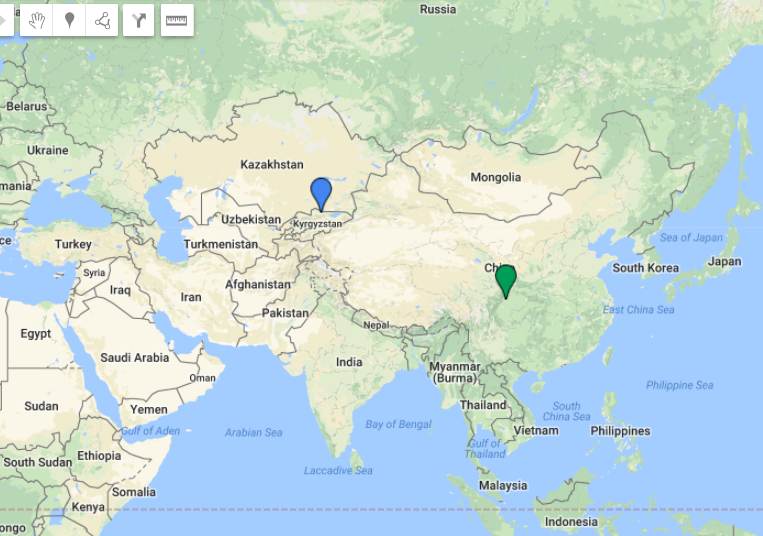
|
(Source:
Google map -
click here to expand, then click the dots to view context)
The young Li Bai read extensively, devouring not just Confucian classics, but
also various tracts on astrological and metaphysical subjects, including the Chinese classic text -
Tao Te Jing/Dao De Jing 道德经 (Wikipedia).
He was also skilled in swordsmanship.
His place of birth, his tall girth, and his angular
facial features, suggested that he was possibly of mixed race. It was said that he was conversant in at least one foreign language due to his background and upbringing.
In 725 at age 24, Li Bai left his second hometown, Jianyou, to explore the world. Being young, ambitious,
and without
financial constraint, he embarked on a knight-errant-like journey. Heading east down the Yangtze River, he explored all the most popular cities and interesting spots along the Yangtze River including
the Three Gorges, the largest lake Dongting Lake 洞庭湖, the famous Mount Lu 庐山,
all the way to Jingling 金陵 (present-day Nanjing 南京, in Jiangsu 江苏 Province).
While passing through the Jingmen Gorge, he left behind a beautiful poem "Bid Farewell at Jingmen" 荆门送别.
Along the way he met and befriended various poets and social elites, including Meng Haoran, who Li Bai had long admired.
Li Bai wrote several poems in admiration and praise of Meng, including the very popular one - Seeing Meng Haoran off at Yellow Crane Tower 黄鹤楼送孟浩然之广陵 (included in the book - poem #02).
While touring Hubei, Li Bai was introduced by friends to the family of the former Prime Minister Xu Yushi 许圉师.
Li, at age 26, was young, handsome, and well-built. He excelled at both swordsmanship and literature, and had about him a chivalrous and gentlemanly demeanor. A budding poet, he was well-received by Xu's family and eventually married the former Prime Minister's granddaughter, Xu Ziyan
许紫烟. The couple settled down at Peach-flower Rock, near Li's in-laws in present-day
Anlu, Hubei Province 安陸, 湖北省.
Although Li Bai would travel from time to time or take short mountain sabbaticals (to enhance study and reflection) for the purposes of obtaining a position in the imperial court, the couple led a content married life with little financial burden, with Xu Ziyian bearing a daughter, Li Pingyang 李平阳, and a son, Li Boqin 李伯禽.
While away from home,
Li Bai wrote many letters and poems to his wife
to express his loneliness and longings, some of which were very witty and humorous.
The blessed marriage lasted for 12 years. In 740, Xu Ziyian passed away. Since several of Li's close relatives lived in Renchen
任城, located on the south side of present-day Jiling city, Shandong Province 济宁市, 山東省, Li Bai moved his family there. This was not far from Lu county, where Confucius' hometown is located.
After settling down at Renchen, Li Bai managed to spend some time living in seclusion with five other hermits on Mt. Culai
徂徕山 (
view Mt. Culai thru Google or
Baidu).
They settled by a scenic brook in a bamboo forest, and hence the six of them earned a collective name - "The Six Hermits of Leisure of the Bamboo Brook" 竹溪六逸. Needless to say, Li Bai spiritually enjoyed his time there, taking in the surrounding mountain scenery, drinking wine, enjoying tea, playing music, practicing his fencing, and especially chanting poems together with his like-minded companions. While living on Culai Mountain, Li Bai continued to maintain contact with the local intelligentsia and gentry through letters and visits in order to get his name heard. This was the fashion during Tang Dynasty for ambitious scholars to obtain a central government appointment in the imperial court. Li Bai lived on Culai Mountain intermittently on three separate occasions.
Mt. Culai, the sister mountain of Mt. Tai 泰山, lies about 12.5 mi/20 km
to the southeast of Mount Tai. In Chinese feudal tradition, emperors would come to this area atop Mt. Tai and hold Heaven-and-Earth worship ceremonies 祭天祭地, also called fēngchán 封禅, during prosperous periods to pay gratitude to Heaven and Earth. Another main purpose was to justify and reify their "superpower" and authority over their people. After the ceremony, the emperors would also often stop at nearby Qufu 曲阜 in Lu county, the birthplace of Confucius, to hold a ceremony honoring him 祭孔大典.
Early in the Han Dynasty, Emperor Han Wudi 汉武帝 had paid three visits to the area, performing the aforementioned ceremonies. Several Tang emperors did so as well. Emperor Tang Ming Huang performed the ceremonies for the first and only time in 725, the year Li Bai was just stepping out of Sichuan to explore the world. While holding ceremony in Lu county, Tang Ming Huang composed a poem called "Passing through Zou Lu and offering a sacrifice to Confucius with a sigh" "经邹鲁祭孔子而叹之". This is the only poem by the emperor, himself, that is included in the anthology "Three Hundred Tang Poems".
Living on nearby Culai Mountain and cultivating a reputation as a learned, self-sufficient, capable man, Li Bai provided himself the chance of being recognized and introduced to the Tang emperor during these ceremonies and would have had the opportunity to be possibly "fast track" into the imperial service.
Before his wife passed away, Li had lived in seclusion on several other mountains as well. One of these was
Zhongnan Mountain 終南山 (
view the mountain, hermits and monks thru Google or
Baidu,)
about 10 miles south of the Tang capital of Chang'an. He lived there around age 29 for less than a year. During the early Tang, the famous scholar hermit Lu Cangyong 卢藏用 lived on this same mountain and was called in by
Empress Wu Zetian 武则天
to work for the central government. Lu began at the position of a remonstrative official - Zuoshiyi 左拾遗 (
duties of remonstrative officials in the Tang Dynasty
and
rank schedule of the imperial civil service system), working his way up quickly to the Shangshu-Youcheng 尚书右丞 level, i.e., almost to
the position of prime minister. This is the origin of the Chinese idiom "Zhongnan Fast Track" "终南捷径". Li Bai, however, did not meet with such fortune on Zhongnan Mountain.
In 742, Hè Zhizhang 賀知章, about 83 years old at the time and a leading light of literature and high-level imperial official, read Li's poems, marveled at his literary talent, and praised Li Bai as the "Transcendent Dismissed from Heaven" or
"Immortal Exiled from Heaven"
"謫仙人". From this point forward the acclamation "Li Bai, the 'Transcendent Dismissed from Heaven' " began to spread throughout the empire. And the two cemented the bond of a lifelong friendship.
(2). Li Bai's Ambitious Dream Starts to Bud - An Audience with the Tang Emperor
In the late summer of the same year, Emperor Tang Ming Huang, who had caught wind of Li Bai's reputation, summoned him to the the capital Chang'an for an audience. From Li Bai's home to Chang'an was nearly a distance of 600 mi/965 km, as the crow flies. Li did not arrive until the autumn.
Emperor Tang Ming Huang, an expert on military strategy who also excelled at literature, greeted Li Bai at the Grand Palace in person. During the banquet, Li's personality, wit, and political views fascinated Tang Ming Huang. The emperor even personally seasoned the soup for Li Bai.
The next year, Li Bai was assigned a
Hanlin 翰林
position at the Hanlin Academy
翰林学院 within the imperial court and appointed the state Grand Secretary.
As a result of the emperor's favor, Li was never required to take the imperial examination to attain the title of jinshi, a usual prerequisite for selection and assignment to a Hanlin position. Indeed, Li Bai never attempted to take the
imperial examination at all.
It was rumored that this was because his ancestors had been banished to Central Asia for some kind of crime. The norm at the time was that offspring of criminals were automatically disqualified from taking the exam, but his ancestors were banished in the Sui Dynasty (581 - 618)
and the Sui was overthrown by the Tang in 618, some 80 years before Li Bai was born!
Being from a merchant family also would have disqualified him from taking the imperial examination, though. This policy was adopted most likely to prevent collusion between government employees and businessmen. But in reality, this policy was never consistently implemented. Highly wealthy merchants could always circumvent the rules and secure important government positions. One such example was Wu Shiyue 武士彠, a successful lumber businessman with good connections to the Tang royal family, who secured several important government positions early during the dynasty and indirectly helped his daughter -
Wu Zetian 武则天
“usurp” the throne. (There is an entire chapter devoted to Wu Zetian -- another Tang poetry promoter and grandmother of Tang Ming Huang -- in "Tang Poems" volume 2.)
This regulation was eventually repealed by the following Song (Sung) Dynasty 宋朝, and almost all classes of males (and only males) were thereafter permitted to take the exam. In any event, during Li Bai's lifetime he often broke from convention and followed his own path.
In the beginning, Li led a fairly pleasant life at court. The famous verse "Guifei grinding ink, Lishi pulling off boots" "贵妃磨墨, 力士脱靴" describes this period. It depicts Yang Guifei 楊貴妃, Tang Ming Huang's most adored consort, grinding Chinese black inksticks into ink for Li to pen down a poem, while Gao Lishi 高力士, Tang Ming Huang's favorite
eunuch 宦官,
(and the most politically powerful figure in the palace), assists in pulling off Li's snow stained boots under Tang Ming Huang's request. All to facilitate Li’s comfort and creative genius. It was also suggested that whenever Li Bai published a new poem, there would be a run on paper in Chang'an, sending the price soaring, with everyone rushing out to obtain copies of his new work.
Li's main duty was to handle secretarial works and record tasks for Tang Ming Huang, which included accompanying Tang Ming Huang to important ceremonies and festivities and documenting them. Tang Ming Huang probably intended that through Li's exquisite writing, the records of his reign would be of particular interest to future historians and scholars.
A secondary duty assigned to Li was composing poetry for the emperor. This resulted in the poem,
Qingping Song (1) 清平调词之一 (included in the book - poem #03)
which is a flattering and fawning piece about Yang Guifei and reflects the desires of Tang Ming Huang.
After working for nearly two years at the imperial court,
the incompatibility of Li's personality with court life began to take its toll, as Li was never one
to be bound or driven by secular rules.
Detesting the political machinations, Li doubted if it was in his best interest to remain at the court.
During this period, the treacherous Prime Minister Li Linfu 李林甫 held tremendous political power, running the country by himself and pushing aside all other capable individuals and potential rivals. All the while, Tang Ming Huang spent most of his time and energy indulging in a lascivious lifestyle with Consort Yang Guefei.
More importantly, it was rumored that the
eunuch
Gao Lishi had always felt that being forced to pull off Li Bai's boots was exceedingly humiliating. So he started to badmouth Li Bai to Yang Guifei. He asserted that it was inappropriate for Li Bai to have compared her beauty to that of consort Zhao Yanfei in his second poem "Qing Ping Ballad #2". Zhao was originally of very low birth and status. She was a consort of Emperor Han Chengdi during the Han Dynasty, and was famous for her beauty and slender waist; in contrast, Yang's
great-great-grandfather had been a key official during the previous Sui dynasty, and she had a plump figure, which was the fashion of the Tang Dynasty. Both were consorts doted on by the emperors of their times.
Gao Lishi had been given command of the imperial military forces and had defeated several adversaries in the power struggle for Tang Ming Huang to win the kingdom back for Tang Ming Huang's father. Having established meritorious achievements, he was conferred with the rank of Biaoqi Great General 骠骑大将军 (4th level in military service systems) by Tang Ming Huang, thus holding substantial imperial court military power in addition to political power. He was the favorite eunuch of Tang Ming Huang and even the powerful Prime Minister Li Linfu sometimes publicly flattered him. With such a cast of powerful officials potentially arrayed against him, Li Bai saw the writing on the wall.
(3). Li Bai Quits and Leaves the Powerful Center of the World - the Imperial Court in Chang'an - Forever
In traditional Chinese culture, the most glorious purpose in life was to pursue meritorious honor and fame 功名 (pinyin: gōng míng) in the imperial bureaucratic system. To be able to gain societal recognition in making one's mark on the people and the country was considered of the highest honor. Yet the quality and nature of being a great imperial statesman are quite different from that of being a successful poet, especially a romantic poet. Li finally had an epiphany and abandoned the traditionally defined path to success. Like a fabulous bird, he required an expansive space to fly and soar and not be bound in a golden cage. Hence, his poems began to reflect his desire to leave his bureaucratic mission.
Recognizing that Li Bai was unwilling to continue serving in the court, Tang Ming Huang released him with a handsome severance in the spring of 744.
After a series of farewell parties, Li Bai wrote a moving poem "The Difficult Journey" "难行之旅" expressing his life's ambitions, difficulties he had encountered, and his outlook for the future. And then he said goodbye to the royal court - the center of world power and influence that he had once obsessed about.
(4). The Two Greatest Poets Meet for the First Time
Li Bai was characteristically always an optimist;
no setbacks ever seemed to frustrate him, and he could always find a way to see the bright side of life.
Leaving Chang'an and the setting sun behind him in a relaxed and light mood on his
way home, he traveled to and toured Luoyang 洛阳, which was once the capital during
Empress Wu Zetian's
reign. In fact, Louyang, about 200 mi/322 km east of Chang'an, had been the capital for more than six dynasties in China's history before Li Bai's time. Thus, by the Tang dynasty, it was already a famous historical cultural city and peony cultivation center. The poet Du Fu happened to be traveling in the area at that time, too, and so two of the greatest poets in Chinese history met for the first time. Li was 11 years Du's senior and was already an illustrious star poet. Du, on the other hand, had not yet garnered
any fame for himself, and indeed, would not do so in his lifetime. Du, being younger than Li, exhibited the forthrightness, sincerity, and zeal in composing poems that Li had had in his earlier days. All these characteristics drew the two together and helped them form a solid friendship right way that lasted their entire lives.
After touring Luoyang and before parting, they scheduled to meet up again in Kaifeng 开封, further east of Luoyang.
view Luoyang via Google,
Baidu, or
wikipedia
.
view Luoyang cultural relic via Baidu.
View a Luoyang cultural relic site - Longmen Grottoes
洛阳龙门石窟
via Baidu or
wikipedia
.
In the autumn, Gao Shi 高适,
a famous border and frontier fortress poet and also Li Bai's friend five years his junior, joined the two of them to tour the Liangsong area 梁宋, which includes present-day Kaifeng 开封 and Shangqiu 商丘 in Henan 河南 Province.
Kaifeng is a beautiful lake city with the Bian River 汴河 running through it. It was one of the busiest trading centers of the Qin, Han, Sui and Tang dynasties. Fifty some years after the end of the Tang, it became the capital of the Northern Song 北宋 Dynasty. The famous painting "Along the (Bian) River During the Qingming Festival" 清明上河圖 elegantly captures one prosperous section of the Bian River in Kaifeng during the Northern Song Dynasty.
Since societal and structural changes generally evolved more slowly in former times than in the modern era, the painting is probably also a fair depiction of bustling daily life in Kaifeng during the High Tang period. One can imagine Li Bai, Du Fu and Gao Shi in the crowd happily crossing the arch bridge, to find a restaurant at which to enjoy gourmet food and fine wine, chattering into the night.
* * *
View daily activities in ancient Kaifeng through the animated version of "Along the River During the Qingming Festival" via YouTube:
River Q. M. - 6 minutes
,
River Q. M. - 12 minutes (with English narration)
or
12 minutes (the same as above at different URL),
River Q. M. (1/2) - 7 minutes ,
River Q. M. (2/2) - 7 minutes,
or
select one via Baidu.
The original painting, about 206 inches by 9.7 inches (528 cm by 24.8 cm) on silk, was orchestrated by
Zhang Zeduan 张择端 (Wikipedia), a famous court painter.
Due to its beauty and historical value, many different versions were subsequently created, some of which are extant.
View sections of the painting
via Google or
Baidu of various versions.
View sections of the Bian River around Kaifeng today
via Google or
Baidu.
After touring Kaifeng, the three poets traveled to Shangqiu 商丘, a rich historical site.
Two sets of "gold and jade weaved clothes" "金鏤玉衣", dating from around 200 BC to 220 AD, were unearthed in the 20th century from
one of the 18 mausoleums here.
Of course, Li Bai, Du Fu, and Gao Shi did not have the luck to see or even know that there were such treasures hidden just right beneath their feet.
View the mausoleum at Mangdang Mountain in Shangqiu via Google or
view some unearthed items via Baidu.
View the gold and jade weaved clothes from the Liang King Mausoleums in Shangqiu via Google
or
Baidu. (There have been more sets of such gold and jade weaved clothing discovered in mausoleums at different locations in China, with at least two of them from Shangqiu.)
About the "gold and jade weaved clothes":
Wikipedia.
View Shangqiu city:
via Google or
Baidu.
After a delightful trip together,
they set off on their separate ways on a clear and refreshing autumn day. Du Fu went north, Gao Shi kept traveling south, and Li Bai continued on his trip home.
According to Du Fu's poems and writings, during the early High Tang period, the cost of living was low and travel was safe, inexpensive, and pleasant.
In the Tang Dynasty, the central government had a very comprehensive postal service system - the Youyi 邮驿 - to deliver mail and goods, as well as provide lodging for Tang officials on their business trips; of course, the most important tasks were to deliver emergency military messages and government documents. At its peak, the system had over 1,600 postal stations, more than 20,000 employees, and covered the entire country, even extending into neighboring countries and regions such as Korea, Japan, Central Asia, India and Southeast Asia. In addition to the Youyi, there was a guifang 柜坊 organization run by private enterprise,
which could issue IOUs similar to modern bank money orders. With these two efficient organizations, Li Bai, who had just received a handsome severance from Tang Ming Huang, could travel light and safe on his way home.
Later in the same year at age 43, Li Bai became romantically involved with a young woman, Zong Shi 宗氏 ("Shi" 氏 is a character placed after a married woman's surname in ancient times. Her giving name was lost to history), who was proficient at literature, was physically attractive, and was also interested in the study of Taoism. Furthermore, she was a long time admirer of Li Bai and came from a prominent family; she was the granddaughter of former Prime Minister Zong Chuke 宗楚客,
who had served in that position on three separate occasions for two Tang emperors.
Prior to wedding Zong Shi 宗氏,
rumor had it that Li lived with a female companion from the socially elite Liu family
and had a son out of wedlock named Li Puoli 李颇黎. Liu took the son with her after breaking off with Li Bai.
There were no traces or mention of the son in any other official written records afterwards.
This event was followed by a very short (for unknown reasons) marriage to another woman, whose name has also been lost
to history.
In 745, Du Fu called upon Li Bai.
The two got together and traveled to Jinan in Shandong Province
济南, 山東省 and its surrounding area, including Tai Mountain.
Jinan was a historical, cultural city, dating back 4,000 years to the Neolithic Longshan Culture
新石器时代的龙山文化.
View Jinan tourist attractions
thru Baidu.
View old section of Jinan
thru Baidu.
View unearthed relics of the Longshan Culture 龙山文化
thru Google
or
Baidu.
"Gifting Du Fu for "戏赠杜甫" was written by Li Bai during this gathering. It poked fun at
Du in a gentle and caring manner - "On Fanke Hill Peak I come upon Du Fu, wearing a bamboo hat at high noon.
'How are you getting so skinny since we parted?' I ask. 'Work too hard on poems, I do!'"
"饭颗山头逢杜甫,顶戴笠子日卓午。借问别来太瘦生,总为从前作诗苦。"
The poem vividly and humorously alludes to an image of Du Fu painstakingly working on and crafting his poems.
It also reflects the caring concern and tender regard that Li Bai had for "this young brother" "小老弟". It was the third and also last time that the two met.
After their parting, Li Bai wrote Du Fu a poem: "For Du Fu from under the Shaqiu Tower"
"沙丘城下寄杜甫"
in which he expressed how much he missed his good friend, "... I'm thinking of you, my dear friend, just like the Wen River marching vast and mighty towards the south ..."
"...思君若汶水,浩蕩寄南征..." Although they never met again, they continued to write to each other.
After leaving Shandong, Du Fu went back to Chang'an and spent most of his time seeking an official appointment; however, the path before him turned out to be strewn with obstacles which contributed to his living in poverty during most of his late in life.
In 747, at age 35, Du Fu sat for the
imperial examination
trying to obtain a degree title classification of jinshi again, but all the candidates were rejected by then Prime Minister Li Linfu, who announced that there were no outstanding talents resulting from the exam. This was not an unusual move by Li Linfu, who used it to eliminate the possibility of any rivals emerging.
In the meantime, Li Bai, bequeathed with a handsome severance, brought property for his family.
After arranging for and ensuring their comfort, he started embarking on journeys again. For some trips, his wife, Zong Shi, accompanied him.
One of the major precepts of Taoism is to live a simple life in harmony with nature. This principle can be found reflected in many of Li Bai's poems.
The opening line of the Dao De Jing/Tao Te Chaing/道德经 states that
"The Way that can be described is not the eternal Way. The Name that can be named is not the eternal Name."
"道可道, 非常道; 名可名, 非常名."
It implies that everything humanly defined or created is subject to change and is ephemeral. It is likely that Li Bai took this to heart and
forsake pursuing further wordily accolades and fortune in the capital, Chang'an, but, instead, returned to the "natural" world.
(5). Some Famous Mountains Bear Li Bai's Footprints
He was attracted by historic sites and natural scenery, especially the grandeur of mountains. Once while touring an imposing mountain, he wrote the following verses:
"I'm a madman from the state of Chu,
Singing madly and laughing at Confucius.
With an emerald jade walking stick in hand,
Bidding adieu to Yellow Crane Tower at sunrise.
The distance of the Wuyue (Five Sacred Mountains) is of no bother,
With a lifetime desire to tour famed mountains ...."
"我本楚狂人,狂歌笑孔丘。
手持绿玉杖,朝别黄鹤楼;
五岳寻山不辞远,
一生好入名山游。..."
Now he was able to devote all his time to his dream of endless traveling. Here listed are the mountains of fame that he visited
(Not in chronological order. The five Sacred Mountains are listed first.):
(source:
Google map - click here to expand, then click on the dropdown to view context).
The particular features of the mountains visited by Li Bai:
1. Mt. Hua/Huashan 华山, located in Shanxi Province 陕西省 -
This mountain has a long history of association with Taoism and is famous for its precipitous mountain peaks, studded with plank paths along its cliff face. Li Bai toured the mountain several times, including on a couple of occasions, with his wife Zong Shi. The plank paths have been replaced several times through the ages and nowadays some sections are replaced with glass planks.
(source:
By chensiyuan - chensiyuan, GFDL, commons.wikimedia.org/w/index.php?curid=15762435)
View more thru Google or
Baidu.
2. Mt. Song/Songshan 嵩山, located in Henan Province 河南省 -
The Shaolin Monastery 少林寺 was built on the north side of the central peak, and is
associated with Zen Buddhism. Of course, it is more famous in the West for
its Shaolin kung-fu (gongfu) 少林功夫.
Li Bai visited this mountain several times to see his good friend, Yuan Danqiu 元丹丘, a famous hermit scholar who lived in seclusion here. Yuan often invited Li Bai over for stays of various lengths.
(source:
By Shi Deru (a.k.a. Shawn Xiangyang Liu) https://commons.wikimedia.org/w/index.php?curid=45725217)
View more thru Google or
Baidu.
View Shaolinshi thru Google or
Baidu.
3. Mt. Heng/Hengshan 恒山, located in Shanxi Province 山西省 -
The famous Xuankongshi or Hanging Temple 悬空寺 is set into the cliffside itself (extending 246 feet/75 meters above the ground).
It was initially built more than 1,400 years ago and uniquely hosts three major beliefs - Buddhism, Taoism, and Confucianism -- which all share one temple and co-exist peacefully. The narrow Hun River
浑河 winds around the foot of the cliff. It was said that the famous calligraphic writing of the characters -- "Spectacular" "壯觀" -- was written by Li Bai while visiting and was later enlarged and carved on the rock face in memory of him.
(source:
By Zhangzhugang - Own work, CC BY-SA 3.0, https://commons.wikimedia.org/w/index.php?curid=28524905)
View the Hanging Temple thru Baidu,
View calligraphy "壯觀" carved on rock thru Baidu,
View videos of the Hanging Temple thru YouTube 1 (22 minutes; in English),
YouTube 2 (4.5 minutes)
or
select one.
4. Mt. Heng/Hengshan 衡山, located in Hunan Province 湖南省 -
(pronounced exactly the same as 恒山, but with characters of different meaning)
The largest Taoist temple -- The Grand Temple of Mount Heng -- was built during Tang Dynasty in 725 at the base of this mountain, and has been a famous retreat and attraction since that time. Li Bai had been this area for at least three times during his lifetime.
However, only a few of his poems about Mt. Heng were passed down.
(source:
By 人間正道 - 投稿者自身による作品, CC 表示-継承 3.0, https://commons.wikimedia.org/w/index.php?curid=27225808)
View Hengshan Nanyue Temple thru Google or
Baidu.
View scenery thru
Baidu.
5. Mt. Tai/Taishan 泰山, located in Shandong Province 山东省 -
A sacred place for emperors to perform Heaven-and-Earth worship ceremonies 祭天祭地大典 since ancient times. Li Bai visited here several times while living in seclusion on its sister mountain - Mt. Culai 徂徕山, and once with Du Fu in 745 during Du's visiting.
(source:
By Charlie Fong - Own work, Public Domain, https://commons.wikimedia.org/w/index.php?curid=5327850)
View thru Google or
Baidu.
6. Mt. Emei/Emeishan 峨嵋山/峨眉山, located in Sichuan Province 四川省 -
This is one of the Four Sacred Buddhist Mountains of China.
Li Bai often visited here during his early youth since his second hometown, Jianyou, is not far from here.
(source:
By Mikael Häggström - Own work, CC0, https://commons.wikimedia.org/w/index.php?curid=15567963)
View thru Google or
Baidu.
7. Mt. Huang/Huangshan 黄山, located in Anhui Province 安徽省 -
literally "Yellow Mountain". It is well known for its sunrises, sunsets, peculiarly jutting granite peaks, pine trees, hot springs, and views of the clouds. Its picturesque scenery has been the subject of many a Chinese brush painting. Li Bai's hermit scholar friend, Wen Chushi 温处士, lived in seclusion here.
(source:
By Peter05031960 - Own work, CC BY-SA 3.0, https://commons.wikimedia.org/w/index.php?curid=15859118)
View thru Google or
Baidu.
8. Mt. Lu/Lushan 庐山, located next to Jiujiang, Jiangxi Province 九江, 江西省 on the south side of the Yangtze River
with beautiful scenery, a perfect setting for summer retreat. Li Bai visited this mountain several times and wrote many poems about it.
(source:
By KongFu Wang from Beijing, China - DSC_4633, CC BY-SA 2.0, https://commons.wikimedia.org/w/index.php?curid=4522713)
View thru Google,
Yahoo,
Bing or
Baidu.
9. Mt. Yanzhi/Yanzhishan/Rouge Mountain 焉支山/胭脂山 is located in the south of Hexi Corridor. It is characterized by amazing geographical effects. The neighboring area, Changyie 張掖, also has breathtaking layer-caked and swirled rock and mountain formations of contrasting colors and shades.
(source:
YubYub41 - 創用CC 姓名標示-相同方式分享 4.0,https://commons.wikimedia.org/w/index.php?curid=46928109)
View Changyie thru Google,
Baidu
or
Yahoo.
Li Bai traveled through the Hexi Corridor (a winding route in purple color straddling four major cities). Hexi 河西 literally means
"river west", due to its location on the west side of the Yellow River bend.
Hexi Corridor 河西走廊 (Wikipedia).
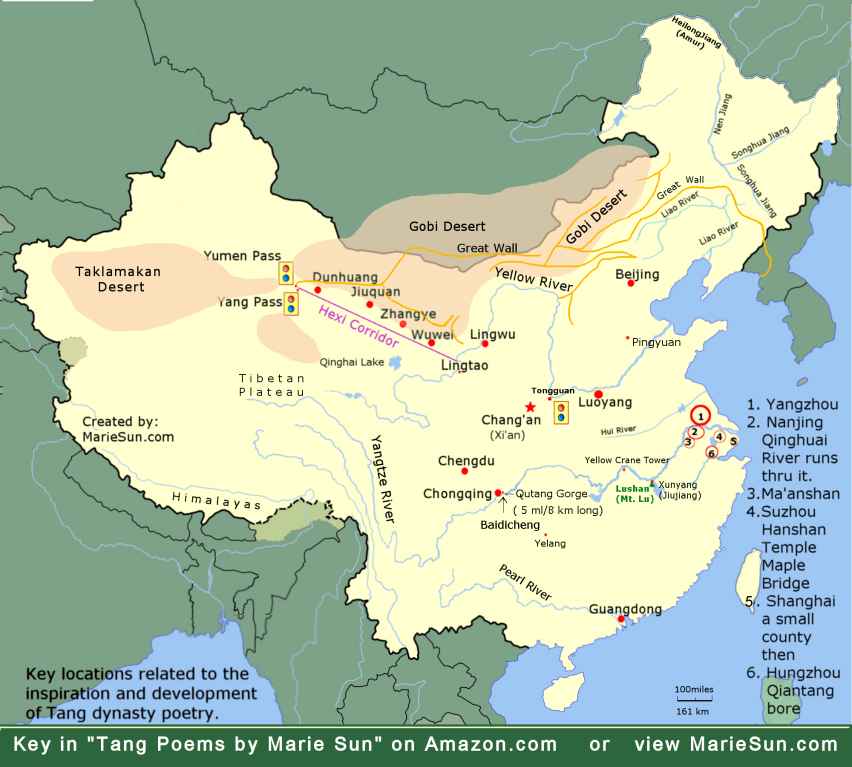
He toured the Hexi Corridor, eventually reaching Yumen Gate 玉门关, and wrote a poem "The Moon over a Mountain Pass" "关山月" to praise the grandeur and describe the hardship of the frontier soldiers guarding the Yumen Pass.
The Hexi Corridor was the most important section of the Silk Road
connecting Chang'an to the western world. It was developed and settled in the Han Dynasty during Emperor Han Wu Di's 汉武帝
reign around the 2nd century BC, with credit attributed mainly to
explorer and diplomat Zhang Qian 张骞
(Wikipedia), and later to Generals Wei Qing 卫青 and Huo Qubing 霍去病.
In 609, during the Sui Dynasty, Emperor Sui Yangdi 隋炀帝
held an International Fair near Mt. Yanzhi 焉支山, receiving rulers and ambassadors from 27 countries. It was probably the world's first international expo.
Li Bai's ancestors were said to be stationed in this area during the early Sui Dynasty.
* * *
After visiting so many natural wonders, he created a great many popular poems about the scenery and thoughts, such as
Night Lodging in a Mountain Temple 夜宿山寺,
Thoughts on a Still Night 靜夜思 (both are included in the book -
poems #05 & #06),
and The Moon over a Mountain Pass 关山月, etc.
While traveling alone, sometimes a wine bottle was probably his only companion. Hence the the inspiration for his famous wine poem - Drinking Along by Moonlight 月下独酌 (poem #07).
Around 750, Li Bai and his wife, Zong Shi, finally selected Mt. Lu as their permanent home
due to its beautiful scenery and pleasant weather.
Look Out Over Mount Lu Waterfall 望庐山瀑布 (included in the book - poem #04)
was created during one of his many trips hiking Mt. Lu.
While traveling in Henan 河南 Province through the town of Yunyang 云阳, Li Bai passed along river banks lined with thriving trade centers and prosperous restaurants filled with rich and busy merchants. He was also witness to the contrast of hauler-laborers
䊹夫 and their tough life in comparison to those who frequented those restaurants. Disturbed by the disparities of wealth and the unfairness of life conditions, he was
moved to write the "Dingduhu Song"
"丁督护歌", expressing his deep sympathy for the unfortunate and the exploited -
When buffaloes rest by the light of the moon, how bitter it is to tow boats still.
The water is too muddied to drink,
the tea pots halfway filled with silt!
When they let out the duhu song, my heartbreaks, tears falling like rain.
Gentlemen observing the Shimangdang, fight sorrowful tears of eternal guilt!
吴牛喘月时,拖船一何苦。
水浊不可饮,壶浆半成土。
一唱都护歌,心摧泪如雨。
君看石芒砀,掩泪悲千古!
When the weather was warm, the haulers would only wear a small strip of cloth over their shoulders for protection. The "clothes" became easily worn, and yet were still too expensive to replace -- a pitiful and heartbreaking scene.
view the haulers thru Google or
thru Baidu.
Although Li Bai was away from Chang'an, he still cared about the affairs of the state and the colleagues he used to work with. In "Drinking alone with thoughts at a chilly night" "答王十二寒夜独酌有怀", a letter responding to his friend Wang Shier, he criticized court corruption and the scheming and fawning of high-level officials. He was full of rage towards the deaths of the prominent officials such as Fei Dunfu 斐敦复 and Li Beihai
李北海 (also a famous calligrapher), both of whom died at the hands of Prime Minister Li Linfu 李林甫. In this letter, though, he also praised General Ge Shu's 哥舒 achievements in guarding the border frontier at that time.
In the summer of 754, the new Prime Minister, Yang Guozhong, launched an absurd campaign in the southwest border regions, sending 70,000 to 100,000 soldiers (depending on different sources) against Nanzhao 南诏 kingdom (present-day Yunnan 云南 Province and its surrounding area). Due to misjudgment in military strategy and the onset of a epidemic plague,
the entire army was wiped out.
(6). During the An Lushan Rebillion
In December 755, the An Lushan Rebellion 安祿山之乱 broke out in Youzhou. Not long afterwards, the whole empire was thrown into turmoil. (see Chapter 4
"The turning point of Tang - the An Lushan Rebellion" for a more detailed discussion.)
Seven months later, the rebel General An Lushan overcame a key military fortress - the Tong Pass,
and Emperor Tang Ming Huang hurriedly fled towards Chengdu, Sichuan Province
成都, 四川省, while
the Crown Prince Li Heng 李亨 took refuge in Lingwu, Ningxia Province 灵武, 宁夏省 and soon declared himself the new Tang emperor. After hearing news of the declaration, Prince Li Ling 李璘, the 16th son of Tang Ming Huang,
rose up in Jiang Ling 江陵,
present-day Jingzhou city, Hubei Province 荆州市, 湖北省 against his brother, in the name of protecting his emperor father's sovereignty.
Appreciating Li Bai's fame and his literary talent, Li Ling continually sent messengers to Mt. Lu in order to
cajole Li Bai into accepting a position as his key propaganda advisor and secretary.
Li Bai's poems, such as
"The Song of Youth" "少年行", "The Song of Knights" "侠客行", as well as many others, reflected his life attitude, which had long been of the chivalrous sort. Thus, after Li Ling's repeated and earnest invites, Li Bai, in spite of his wife's attempts as dissuasion, agreed to join with Li Ling. Proceeding with a knight-errant spirit, he hoped to be able to contribute and do something for the good of the country.
The next year, the new Emperor Li Heng defeated his brother Li Ling, capturing and executing him. Li Bai was likewise jailed and awaited his fate. Upon hearing the shocking news, Du Fu wrote several poems to Li Bai to express his deep concerns and worries. During Du Fu's lifetime, he wrote many poems and letters to Li Bai, as the latter's talent, charisma, and the attitude towards life deeply attracted Du Fu.
During this critical period, Li Bai's wife, Zong Shi, sought help from all corners to mitigate
a finding of treason, which would have almost certainly resulted in a death sentence. In the end, he was only given a sentence of permanent banishment to Yelang 夜郎.
Yelang was located in the southwest corner of the empire, which was an extremely "underdeveloped" tribal area at the time (at southwest of present-day Huihua, Hunan Province 怀化, 湖南省. There were a total of three outer frontier areas designated as "Yelang county" at different times during the Tang era.). It was the same area that Li Bai's good friend Wang Zhangling 王昌龄 (Author of the famous poem "Beyond the Border" - Bright moonlight in the times of Qin..., 秦时明月汉时关) had been banished to 6 years prior.
Around the spring of 758 at age 57, Li Bai, accompanied by his brother-in-law, Zong Jing 宗璟, began his exile and set out towards Yelang from Xunyang 浔阳, present-day Jiujiang
九江, at the foothills of Mt. Lu by the Yangtze River, not far from his home up in the Mt. Lu. The Zong Jing would accompany Li all the way to Wu River near Baidicheng, and then Li would head toward Yelang alone.
Li Bai's exile route - starting from Xunyang/Jiujiang, sailing westward to Baidicheng along the Yangtze River then heading southeast to Yelang:
The day before his departure, there was a large farewell party thrown for him by the local officials and people of influence. Afterwards, Li Bai wrote a thank-you letter --
"To all the officials in Xunyang while staying at Yonghua Temple on the Yangtze River while enroute to exile in Yelang" "流夜郎永华寺寄浔阳群官", in which he expressed his gratitude for the farewell party and also expressed his thoughts about his fate. At the end he wrote "... Everything is predetermined destiny, there is no need to feel bitterness or anxiety"
"...天命有所悬,安得苦愁思。"
Nothing could defeat him spiritually. He accepted any setback gracefully with a calm and a positive attitude. That was one of his remarkable traits.
The An Lushan Rebellion rampaged through the northern regions of the empire around the Yellow River, but did not spread to areas further south. Fighting between Emperor Li Heng and his brother, Li Ling, did extend along the Yangtze River for a short period, with small, sporadic disturbances continuing a little longer. Thus, Li Bai was not really witness to the true cruelties spawned by large-scale warfare or the massive suffering of the people that his fellow poet, Du Fu, had experienced. Li Bai's exile journey along the Yangtze River was in contrast, rather uneventful.
In fact, in the ports dotting the western reaches of the Yangtze River, there were quite a few "farewell parties" thrown by old friends and people of local influence for the famous poet. He also managed to meet with his old friend,
Qie Ang 郄昂, who was on his own way to exile to a different undeveloped region.
Towards the end of 758, Li Bai and his
brother-in-law, Zong Jing, parted as planned at the convergence of the Yangtze and Wu rivers. Li Bai wrote a deeply appreciative farewell letter "On exile to Yelang, parting with Zong Jing at the Wu River"
"窜夜郎于乌江留别宗十六璟".
From now on he would be traveling alone.
In the early spring of 759, while at Baidicheng 白帝城, he sent a letter "To my wife on my exile to Yelang" "南流夜郎寄内" to express his longings and his apologies for bringing so much worry to her. With this done, he was now ready to set off south heading towards Yelang.
Due to a severe drought that had befallen the country at that time, however, Emperor Li Heng granted a blanket amnesty to those convicted of crimes against the state, in hopes of receiving a blessing from heaven that might end the drought. Li Bai was elated on receiving news of the amnesty edict. Without delay, he set out for home early the next morning. On his way from Baidicheng to Jiangling, he penned this famous poem
Setting out Early from Baidicheng 早发白帝城 (included in the book - poem #08).
Li Bai remained for an extended period in Jianling meeting with his old folks. Jianling had also been the financial and military supply centre of prince Li Ling. On his journey back home,
he also made several other stops along the Yangtze River to meet old friends.
In order to enjoy time together with his former colleagues Ying Peiyin 应裴隐, Jia Zhi 贾至, and Li Ye 李晔, he made a rather long pit-stop in Baling 巴陵, present-day Yuyang city, Hunan Province 岳阳市, 湖南省, situated on Dongting Lake 洞庭湖 (the largest lake in ancient in China). Jia Zhi, a talented writer and poet, was also a good friend and colleague of Du Fu. They had both just been banished by Emperor Li Heng the previous year as a result of the "Fang Quan" 房琯 incident. For Jia Zhi, this was a second banishment to an even lower position as a "Sima" 司马 in Baling; therefore, he was in a very depressed mood. As for Li Ye, he was on his way into exile in a remote, undeveloped region in the southwest border region of Lingnan 岭南. Unfortunately for the two of them, they were not included on the amnesty list with Li Bai, due to the different nature of their alleged offenses.
The four went boating on Dongting Lake in the autumn
and wrote poems expressing their feelings and thoughts, undoubtedly further inspired by the crisp and refreshing fall weather. Li Bai wrote the following poem directed toward Jia Zhi:
"Jia, you keep looking towards the west,
nostalgic for the capitals' (Chang'an) splendor; now exiled to south of the Xiang River, try not to be discontented. The emperor of Tang treated you much more gracefully than did the emperor of Han to Jai Yi 贾谊. Due to his Grace's generosity, he did not banish you to Changsha!"
"贾生西望忆京华,湘浦南迁莫怨嗟。
圣主恩深汉文帝,遣到怜君不长沙。"
Jia Yi 贾谊, a notable thinker and writer in the Han Dynasty, was also an imperial official who was banished to Changsha by Emperor Han Wendi 汉文帝 due to slanderous accusations made by an opposing group of old officials. Changsha was farther away from the capital, Chang'an, than was Baling. Although they both had the same last name "Jia" 贾, Jia Zhi and Jia Yi were not blood related.
The poem was an ironic comment on the fatuousness of both rulers; however, it expressed Li Bai's true feelings of care for his talented friend and was an attempt to lighten Jia Zhi's feelings of despondence.
As for the poems to Li Ye, who had also been sentenced to exile, none are extant.
Li Bai finally arrived at home and was reunited with Zong Shi at Mt. Lu in 760, after having traveled in fits and starts down the Yangtze River, and having been away for almost two years!
The next year in 761, at age 60, after hearing that General Li Guangbin
李光弼 was leading a large force in Henan Province 河南省 on a punitive expedition against the An Lushan rebels, Li Bai's chivalrous spirit again got the best of him, and he enthusiastically headed out to volunteer, with the thought that this was an opportunity to carry out his patriotic duty and redeem himself of his "criminal treason." On his journey to Henan Province, however, he became critically ill and failed to make it to camp.
(7). The Greatest Romantic Poet in Chinese History Says Farewell
The next year, Li Bai's wife, Zong Shi, passed away. To escape local military and political turmoil, Li Bai took his remaining small collection of poems from Mt. Lu to
Dangtu 当涂, present-day Ma'anshan, Anhui Province 马鞍山, 安徽省, seeking a favor from Li Yangbing 李阳冰 to write a preface for his * "Caotang Collection" "草堂集" (a "caotang" is a thatched cottage, and, thus, was a humble way to refer to the collection of his literary works).
Li Yangbin,
the county magistrate of Dantu at that time and a renowned zhuanzi calligrapher who was also a distant relative of Li Bai (technically a member of Li Bai's parents' generation, but 20 years younger than Li Bai), happily received Li Bai and his collection. The two of them would later enjoy boating in the early summer breeze.
At about this time, Emperor Li Heng died, and the new Emperor Li Yu 李豫, appreciating Li Bai's literary talent and reputation, issued an edict
summoning Li Bai to the capital of Chang'an to assume the position of a
remonstrative official -- Zuoshiyi 左拾遗 -- in the civil service system.
(
duties of remonstrative official
)
However, before the imperial edict arrived, Li Bai had fallen very ill, such that Li Yangbin had taken it upon himself to write the preface to the "Caotang Collection" as Li Bai lay on his death-bed. By the time the edict arrived, Li Bai had already passed away at age 61.
After the death of Li Bai, Li Yangbing honored Li Bai's wish and published the "Li Taibai Caotang Collection" "李太白草堂集" (Taibai, being yet another honorific name given Li Bai). The preface served as a biographical tribute to Li Bai, recounting and memorializing his notable and remarkable life events, from birth to government service to gallant journeys to death.
As for the "Li Taibai Caotang Collection" "李太白草堂集", the actual collection has long been lost to history. Some of the individual poems still extant were collected and published during or after Song Dynasty.
(*The Preface of the "Caotang Collection" "草堂集序" -- displayed near the end of the book in Chinese with parts containing English explanations.)
A legend arose regarding his death. It was said that Li Bai went out for a boat ride on a moonlit night.
It was said that being half drunk, he tried to embrace the reflection of the full moon in the water and
fell out of the boat and drowned.
Li Bai lived most of his life during the High Tang period,
so his writings often reflected the grandeur of the Tang Dynasty at the peak of its prosperity. He had a brilliant mind and exceptional talent, mastering all the Tang poetry forms, and could move from one form to another effortlessly.
Du Fu once praised Li Bai's poems
with the following couplet from his "Mailing to Li Bai Twenty Rhymes" "寄李太白二十韵" -- "When the pen descends, the thunderstorm startles; When the poem is completed, the spirits weep!" "笔落惊风雨,诗成泣鬼神". In his "Thinking of Li Bai on a Spring Day" "春日忆李白", he also asserted that "Bai's poems are without rivals, gracefully floating alone and high above the flock" "白也诗无敌,飘然思不群."
As a leading figure in the romantic poetry movement, his poems were
passionate and unrestrained in spirit and can be easily read, understood and moved by people at all levels. That is what makes Li Bai the most popular poet in Chinese history, and why his poems are the most widely memorized ones to this day.
* * * * * * *
* * * *
Other facts regarding Li Bai
Li Bai 李白 went by many names, such as Li Taibai 李太白, Qinglian Jushi 青蓮居士 ("Householder of the Young Lotus"),
Shi Xia 诗俠 ("Poet Knight-errant"), Jiu Xian 酒仙 ("Wine Immortal"), and Zhe Xian Ren 謫仙人
("Immortal Exiled from Heaven" or "Transcendent Dismissed from Heaven").
His most popular and well-known title, though, was Shi Xian 诗仙, "the Immortal of Poetry" or "Poet Transcendent”.
Li Bai also excelled in calligraphy. His handwritten copy of "Ascending the Sun-Lit Platform" "上阳台帖" is stored at the Palace Museum in Beijing, China. It is the only surviving example of Li Bai's calligraphy:
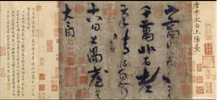
(source:
commons.wikimedia.org/wiki/File%3ALibai_shangyangtai.jpg)
The seals, comments, and praises around the calligraphy represent it was once a collection by the imperial courts from various dynasties or by individual collectors. The piece is considered a precious and priceless treasure in China.
It reads -- "Mountains high, rivers long, sights spectacular; without a wizened brush (pen), how can the phenomenal beauty be captured? Ascending the sun-lit platform this 18th day Li Bai" "山高水长 物象千万 非有老笔 清壮何穷 十八日上阳台书 太白". The exact date and location of his trip to the "sun-lit platform" were not recorded.
Du Fu 杜甫
Du Fu (712 - 770; lived mostly during the High Tang period, except for his last 15 years, which
fell within what is traditionally considered the Mid Tang period) was born into a scholarly family, with his grandfather, Du Shenyan 杜审言, having been a famous statesman, poet during Empress Wu Zetian's reign and
one of his poems is also included in the anthology "Three Hundred Tang Poems." He passed away when Du Fu was a 4-year-old.
All of Du FU's poems are collected in the "Dugongbuji" "杜工部集" which has been hailed as an
"Epic Poem" anthology. He is considered by many literary critics to be the greatest historical poet of all time. Around 1,400 of Du Fu's poems are extant, of which thirty-nine are included in the popular anthology "Three Hundred Tang Poems" -- the most from any poet.
His ancestors came from present-day Xiangyang city, Hubei Province 襄阳市, 湖北省 (also Meng Haoran's 孟浩然 hometown).
His mother died not long after his birth, and his father
remarried and had additional children, so Du Fu had three half brothers,
along with a half sister. Du Fu received a traditional Confucian education but initially failed the
imperial examination
in his first few attempts.
It was said his failure in the imperial examination was due to his dense and obscure prose style.
As a result,
he spent most of his youth traveling and befriending poets. Obviously, he was without financial constraints in his youth.
In the summer of 744, the young Du Fu met Li Bai in Luoyang
for the first time, and the two formed a strong friendship right way, despite their 11 year age difference and Li already being a prominent star poet (while Du, on the other hand, was still an unknown).
They met three times within two years, and then never met again thereafter, although they continued writing to each other, maintaining their friendship throughout their lives.
In 752, Du Fu married around age 40 and the couple had five children -- three sons and two daughters -- one of whom (a son) died of malnutrition in infancy during the An Lushan Rebellion period while Du Fu was away from home seeking employment.
In 753, while living in Chang'an on a job search, he wrote "The Song of Beautiful Women" "丽人行", after observing the royal family's spring picnic outings by the scenic Qu River 曲江.
It was a subversively ironic criticism of the royal
family's extremely luxurious and
wasteful life style. Two years later, in December 755, the An Lushan Rebellion broke out, and in the summer of the next year, An Lushan occupied Chang'an. Tang Ming Huang fled to the southwest towards Chengdu 成都, and Crown Prince Li Heng fled to northwest towards Lingwu 灵武.
In the autumn of 756, after hearing that Li Heng declared himself the new emperor in Lingwu, Ningxia Province 灵武, 宁夏省, Du Fu thought that the new emperor might
bring in new leadership and adopt a new work-style to reform and save the country. Du Fu hastened on his way to Lingwu in the hopes of landing a position under the new emperor's administration. He took remote routes around the outskirts of Chang'an to avoid the An Lushan rebels. Unfortunately, he was still captured by the insurgents and detained in Chang'an,
where the notable poet and high ranking official, Wang Wei 王维, happened to be detained too. Du Fu was eventually released since he had not yet made a name for himself, but not the well-known and "valuable" Wang Wei.
After managing to flee through the fierce fighting in Chang'an, Du Fu was back on the road again. During his journey he saw
the collapse of the country, the breaking up of families, and the general suffering of the people. This experience spurred him to
write his famous poem
Spring Observation 春望.
At the same time he also wrote the poem "A Lament for an Aristocrat"
"哀王孙", revealing a deep sympathy for the stray, young boys of the Tang royal family who were abandoned during the turmoil of attempting escape. As for the royal ruler, Du Fu appeared not to have borne the slightest grudge, despite the fact that the emperor and his royal family were the root cause of this great misfortune. The concepts of respect for authority and respect for the traditional Confucian social class paradigms seemed deeply rooted in his soul, initially. Later in life, though, he began to alter his outlook as a result of his own experience dealing directly with the Tang emperor and the court system, as well as his first hand observations of the sufferings of his countrymen.
In the spring of 757, after much toil, Du Fu finally arrived in Lingwu. In mid-May, Emperor Li Heng interviewed him and assigned him
the position of a remonstrative official -- zhuoshiyi 左拾遗 -- who directly communicated with the emperor offering
moral assessment and critiques of policies.
(duties of remonstrative official
and
official ranks in civil service system).
Being naive and lacking political awareness and tactics, his direct criticisms sometimes annoyed Emperor Li Heng, and he was once fired by the Emperor in a fit of anger. Due to Prime Minister Zhang Hao's 张镐 intervention, however, Li Heng later recalled Du back.
In June 758, Du Fu was involved in the Fang Guang 房琯 incident. By speaking up on behalf of former Prime Minister Fang Guang,
he irritated an opposing political group, as well as Emperor Li Heng. As a result, Du Fu was exiled to Huazhou, in present-day Hua county, Shanxi Province 华州,
陕西省 and demoted to a Cishi 刺史, a lower position with lower pay. Li Bai's good friend, Jai Yi
贾谊, was also ensnared in the same incident and exiled to Baling 巴陵 on the shores of Dongting Lake along the Yangtze River. Li Bai happened to also be traveling westward at the same time along the Yangtze River towards exile in Yelang.
In the winter of 758 and the spring of 759, Du traveled between Huazhou and Luoyang for his personal affairs.
At that time, Tang forces suffered another major defeat. In order to quickly replenish their military forces,
officials began grabbing people off streets or from homes for forcible induction into the army.
During the trip he saw the suffering of the common people, deeply feeling their pain and sacrifice and witnessing the
unjustifiable and merciless actions of officials in the corrupt government. Hence, he wrote a string of
famous poems dealing with these experience,
Shihao Official 石壕吏
being among them.
By this point he had lost all faith in the central government and felt great disappointment in Emperor Li Heng. As a result,
he decided to resign from his government post.
After resigning from the civil service in July 759,
Du moved his family to Qin Zhou county, Tianshui city, Gansu Province 秦州区, 天水市,
甘肃省, which was temporarily at peace.
At that time Henan 河南 was caught up in war, and Du Fu's three half brothers were dispersed to that area. He wrote this poem,
月夜忆舍弟 Thinking of Young Brothers on a Moonlit Night, to express
his deep concern and worry for them. Never overlooking anyone, at the same time he also wrote poems and letters concerning his half sister.
In the Chinese lunar calendar,
the period around early September was traditionally associated with dropping temperatures and the formation of frost-white dew at night or early in the morning, as mentioned in the poem. Du Fu likely wrote the poem around this time. The chilly weather would have surely enhanced Du Fu's longing for
his siblings even more. The poem is filled with abundant brotherly affection and care, as would be expected from a caring and kind, big brother.
Du Fu stayed in Qin Zhou county for about three months and wrote nearly 100 poems, all of which were collected in his "Qin Zhou Various Poems" "秦州雜集".
Due to approaching fighting in and around Qin Zhou county, Du took his family
south to Tonggu 同谷, present-day Chen county, Gansu Province 成县, 甘肃省. There they encountered famine
and went through very difficult times again. In December, they moved to Chengdu,
Sichuan Province 成都, 四川省. With the help of an old and dear friend, Yan Wu 严武, Du Fu
landed a local government job; Yan always extended his hand out to Du Fu during his most difficult times.
In 760, with the help of his friends and relatives, Du Fu built a
thatched cottage and settled down
by a lovely babbling brook called Huanhuaxi 浣花溪, literally "washed up flowers brook",
in the countryside, west of Chengdu. He and his family spent almost six years there,
intermittently. This time was probably the happiest and most peaceful of his life.
The poem
A Quatrain 絕句
was written then.
In the summer of 762, Du Fu moved out of his thatched roof cottage to escape local fighting. In the same year, Li Bai passed away. Du Fu wrote several poems in memory of this most admired friend and idol, some of which recalled the care-free days of them traveling together in their early years. Indeed, such memories and thoughts were never to fade away.
In 763, the new Emperor, Li Yu (the eldest son of Li Heng), summoned Du Fu to the capital, Chang'an, to assume the position of an assistant official for military affairs in one of the counties surrounding Chang'an. Due to riots still erupting across the country, however, it was very difficult to travel, so he declined. If it not for the war, he would have probably accepted the offer and likely ended up with a more fortunate destiny.
In the beginning of 764, Yan Wu, having been
re-assigned as the governor of Chengdu county, invited Du Fu to work for him again. Du Fu gratefully accepted and settled down again in his thatched roof cottage in Huanhuaxi. At the end of the same year, Yan Wu became very ill and
died the next spring, which led to Du Fu being compelled to leave his post in the local government. He was now very old and suffering from chronic disease.
In May, he left his thatched roof cottage with his family to spend the rest of his life drifting and wandering from place to place in Sichuan Province
四川省.
Around the year of 766, Du Fu, his wife, and their four children, had moved onto a simple and crude boat drifting along the Yangtze River for 5 years. And
Writings of a Night Lodging 旅夜书怀 was written during that difficult period.
In the winter of 770, he died in poverty and sickness on a ragged boat on the Xiang River/Xiang Jiang 湘江.
The greatest epic poet in China ended his arduous life at age 58.
* * *
Du Fu's largely itinerant life was associated with imperial displeasure, unsettling wars, and wrenching famines, all of which triggered a well-spring of
creativity that eventually produced a large number of great poems that captured the feelings of the ordinary (and often suffering) people.
His earliest works were considered derivative,
pandering to the the official style of the court. Later, though, after having experienced the severe and challenging turmoil of the An Lushan Rebellion,
Du Fu focused on his strong sense of history and his concerns for the poor and society. His remarkable poetic skill resulted in his "The Shihao Official" "石壕吏", "The Xin'an Official" "新安吏", "The Tongguan Official" "潼关吏" (collectively called
"Three Officials");
"A Newlywed's Farewell" "新婚别", "An Old Man's Farewell" "垂老别", "A Homeless Man's Farewell" "无家别" (collectively called "Three Farewells"), and "Soldiers and Chariots on the Way" "兵車行", etc.
For those who have experienced tumult and severe hardship in life, these poems resonate profoundly, and cause even greater appreciation of Du Fu's poems.
When it came to poetic composition, Du Fu carefully crafted his lines,
word-by-word, in a very cautious,
restrained process, reflecting realism and practicality. Li Bai, in contrast, could put pen to paper and in one breath,
create a majestic, stream-of-consciousness poem. Li Bai was graced with natural talent, while Du Fu was anointed with perseverance, endurance, and determination. Both, though, became the preeminent representatives of distinguished and outstanding genres, reaching the pinnacle of recognition in their respective styles -- one as the greatest romantic poet, and the other, the greatest epic poet. Neither one could replace the other.
It was not until the 11th century, during the Northern Song Dynasty 北宋, that a comprehensive re-evaluation
of earlier poets took place, with Du Fu's works receiving new found acclamation. Du Fu, who never enjoyed fame during his lifetime, had his reputation reach its peak during this period, being respectfully anointed the Shi Shen 诗圣 - the Saint of Poetry. His works had a major impact not only in China but also in Korea, Japan, and Vietnam.
* * *
During the Northern Song, Du Fu, Li Bai, and Wang Wei came to be regarded as representing
** Confucianism/Ruism 儒家, Taoism/Daoism 道家, and
Zen Buddhism/Chan Buddhism 禅宗佛家 respectively.
Notes **:
Ruism, or Confucianism, is technically a philosophy, not a religion. It is a system of ethics established by Confucius 孔子 around the 5th century BC and generally eschews contemplation or discussion of the supernatural and the afterlife.
Taoism/Daoism was established by Laozi (Lao-tze) 老子 -- a philosopher, thinker, and scholar -- some time between the 6th and 4th centuries BC. Laozi is regarded as the compiler of the Tao Te Ching/Dao De Jing 道德经. Daoism eventually splintered into several different branches, some with strong religious overtones. Taoism was popular in the Tang Dynasty, especially among the royal family.
Chan (Zen) Buddhism is a philosophy rooted in religion. It differs from mainstream Buddhism in that it de-emphasizes focus on scripture and worship or prayer, but instead centers on meditation and self-epiphany. Buddha's teachings are not to be treated as the truth, but only a guide to the truth. Chan Buddhism was developed by Hui Neng 慧能 (638 - 713) in the Tang Dynasty based on the Mahāyāna school of Buddhism and eventually made its way to Japan, where it was introduced to the West as "Zen" Buddhism.
Beginning with the rulers of the Tang Dynasty and extending to most subsequent dynasties as well, the state officially adopted Confucianism as the basic orthodox and guiding philosophy of government, but also tolerated and co-opted various facets of mainstream Buddhism, Zen Buddhism, Taoism and Legalism (a philosophy based on severe "rule of law" that competed early on with Confucianism and formed the basis of rule during the Qin 秦 dynasty) to administer the state.
#13 Spring Observation (Spring Prospect) 春望
Traditional Chinese
春望 杜甫
國破山河在,城春草木深。
感時花濺淚,恨別鳥驚心。
烽火連三月,家書抵萬金。
白頭搔更短,渾欲不勝簪。
Simplified Chinese with pinyin
春望 杜甫
chūn wàng Dù fu
国 破 山 河 在, 城 春 草 木 深。
Guó pò shān hé zài, chéng chūn cǎo mù shēn
感 时 花 溅 泪, 恨 别 鸟 惊 心。
Gǎn shí huā jiàn lèi, hèn bié niǎo Jīng xīn
烽 火 连 三 月, 家 书 抵 万 金。
Fēng huǒ lián sān yuè, jiā shū dǐ wàn jīn
白 头 搔 更 短, 浑 欲 不 胜 簪。
Bái tóu sāo gèng duǎn Hún yù bù shèng zān.
Recitation 1
Recitation 2
Spring Observation Du Fu
A homeland in ruins,
the rivers and mountains remain by;
Spring comes to town,
the grass and foliage run wild.
In a wave of emotion,
tears scatter on petals;
A fear of separation -
a bird my heart startles.
The signal fire has been burning three months on;
A letter from home is cherished like gold bullion.
My white head is scratched now more than thin;
It can barely hold upright a male's hairpin.
* * *
The poem reflects Du Fu's deep worry about his homeland and his missing family. The thriving spring scene in the depleted ruins triggers an even stronger emotional feeling within him. It is a moving poem especially for those whose country is falling into warring chaos.
Definitions and Interpretation of Characters, Terms, and Names:
春: spring 望: to observe, to hope, to expect, to look at, look forward
国: nation, country 破: ruin, destroy, break, rout 山: mountain, hill, peak 河: river, stream 在: remain, be at, in, on
城: city, town, castle, municipality, the walls of a city, to surround a city with wall 草: grass, straw, thatch, herbs 木: tree, wood, lumber, wooden 深: deep, depth, far, very, extreme
感: feel, perceive, emotion 时: time, season, era, age, period 花: flower, blossom 溅: sprinkle, spray, spill, splash 泪: tears, weep, cry
恨: hatred, dislike, resent, hate 别: separate, other, do not 鸟: bird 惊: startle, frighten, surprise 心: heart, mind, intelligence, soul
烽: signal fire, tower where signal is lit 火: fire, flame, burn, anger, rage 烽火: signal fire, beacon-fire 连: continuous, join, connect, even 三: three 月: month
家: family, house, home, residence 书: letter, book, document, writings 抵: off-set, resist, oppose, deny 万: ten thousand, thousands and thousands, a great many 金: gold, metals in general, money
白: white, pure, unblemished, bright 头: head, top, chief, first, boss 搔: to scratch 更: more, still further, much more 短: short, brief, deficient, lacking
浑: entire, complete, muddy, turbid, blend, merge, mix 欲: desire, want, long for, intend 不: no, not, un-, negative prefix 胜: be better than, excel, victory 簪: hairpin, clasp, wear in hair.
View the following images related to the poem:
1. Male hair style in ancient China (the male hair pin can be made of wood, bamboo, jade, or metal):
View thru Google or
Baidu.
2. Chinese calligraphy 春望书法:
View thru Google or
Yahoo.
#14 Shihao Official 石壕吏
Traditional Chinese
石壕吏 杜甫
暮投石壕村,有吏夜捉人。
老翁逾牆走,老婦出門迎。
吏呼一何怒,婦啼一何苦。
聽婦前致詞,三男鄴城戍。
一男附書至,二男新戰死。
存者且偷生,死者长已矣!
室中更無人,惟有乳下孫。
有孫母未去,出入無完裙。
老嫗力雖衰,請從吏夜歸。
急應河陽役,猶得備晨炊。
夜久語聲絕,如聞泣幽咽。
天明登前途,獨與老翁別。
Simplified Chinese with pinyin
石壕吏
杜甫
shí háo Lì
Dù fu
暮 投 石 壕 村 ,有 吏 夜 捉 人。
Mù tóu shí háo cūn, yǒu lì yè zhuō rén.
老 翁 逾 牆 走 ,老 妇 出 门 迎。
Lǎo wēng yú qiáng zǒu, lǎo fù chū mén yíng.
吏 呼 一 何 怒 ,妇 啼 一 何 苦。
Lì hū --- hé nù, fù tí --- hé kǔ.
听 妇 前 致 词 ,三 男 邺 城 戍。
Tīng fù qián zhì cí, sān nán yè chéng shù.
一 男 附 书 至 ,二 男 新 战 死。
Yī nán fù shū zhì, è rnán xīn zhàn sǐ.
存 者 且 偷 生 ,死 者 长 已 矣!
Cún zhě qiě tōu shēng, sǐ zhě zhǎng yǐ yǐ
室 中 更 无 人 ,惟 有 乳 下 孙。
Shì zhōng gèng wú rén, wéi yǒu rǔ xià sūn.
有 孙 母 未 去 ,出 入 无 完 裙。
Yǒu sūn mǔ wèi qù, chū rù wú wán qún.
老 妪 力 虽 衰 ,请 从 吏 夜 归。
Lǎo yù lì suī shuāi, qǐng cóng lì yè guī.
急 应 河 阳 役 ,犹 得 备 晨 炊。
Jí yìng hé yáng yì, yóu de bèi chén chuī.
夜 久 语 声 绝 ,如 闻 泣 幽 咽。
Yè jiǔ yǔ shēng jué, rú wén qì yōu yè.
天 明 登 前 途 ,独 与 老 翁 别。
Tiān míng dēng qián tú, dú yǔ lǎo wēng bié.
Recitation 1
Recitation 2
Shihao Official Du Fu
At dusk, I sought to lodge in Shihao village;
As an official seized people in the night.
The old man fled over a wall;
The old woman peeked outside her door.
The official began shouting - What an angry sight!
The woman was in tears - What a suffering plight!
I heard as she proceeded to explain,
"All my three sons have been sent to guard the Fortress Ye.
One has written me that the other two are newly dead in battle.
The remaining wish to steal back life's song,
For once found by death it is forever gone!"
"There is no longer any man in the house,
Except, my grandson who is still suckling a teat.
My son's wife has yet to leave for the sake of the child,
And she has no clothing to wear in any event.
Although I'm old and weak of might,
Please allow me to go with you tonight,
To fulfill in due haste corvee service in Heyang,
For I still must fix breakfast for daybreak."
It was deep in the night and the talking had stopped;
Though a lonely, sobbing, choked voice could still be heard.
At dawn, I was on my journey again;
And I said good-bye only, to the old man.
* * *
The poem is written in almost a journalistic style. Du describes his encounter in
very plain and concise words.
He mostly recounts the dialog of the old woman and does not add any commentary or descriptive flourishes, but instead, allows the reader to be touched and moved by the simple facts.
Definitions and Interpretation of Characters, Terms, and Names:
暮: dusk, evening, sunset, ending 投: throw, cast, fling, pitch, jump 暮投: at dusk/evening seek lodging at ...
石壕: a village's name 村: village, hamlet, uncouth, vulgar 有: have, own, possess, exist
吏: government official, magistrate 夜: night, dark, in night, by night
捉: arrest, seize, catch, grasp, clutch 人: man, people, mankind
老: old, aged, experienced 翁: old man, father, father-in-law, a title of respect 逾: go over, pass over, exceed 牆: wall 走: leave, run, walk, go on foot,
妇: married women, woman, wife 出: go out, send out, stand, produce 门: door, gate, entrance, opening 迎: greet, welcome. receive
呼: shout, call, breathe sigh, exhale 何: what, how, why, where, which 怒: anger, rage, passion, angry
啼: weep, whimper, howl, twitter 苦: suffering, bitter, hardship
听: hear, understand, obey, comply 前: preceding, in front, forward 致: present, deliver, send, cause
词: words, phrase, expression 三: three 男: son, male, man, baron, surname
邺城: present-day Anyang city, Henan Province 安阳市, 河南省.
戍: defend borders, guard frontiers
一: one, a, an, alone 附: adhere to, append, rely on near to 书: letter, book, document, writings 至: arrive, reach, extremely, very
二: two, twice 新: recently, new, fresh, modern 战: battle, war, fighting 死: die, dead, death
存: live, exist, be, survive, remain 者: that which, he who, those who 且: moreover, also (post-subject), about to, will soon (pre-verb)
偷: to steal, burglar, thief 生: life, living, lifetime, birth 偷生: eager to save one's life, to be afraid to die 长: long, length, excel in, leader
已: finished, already, stop 矣: particle of completed action
室: house, room, home, chamber 中: in the midst of, central, center, middle, hit (target), attain 更: more, still further, much more
无: no, not, negative 人: man, people, mankind, someone else 惟: only, but, however, nevertheless
有: have, own, possess, exist
乳: breast, nipples, milk, suckle 下: under, underneath, below, down, inferior, bring down 孙: grandchild, descendant, surname
有: have, own, possess, exist 母: mother, female 未: not yet, 8th terrestrial branch 去: leave, go away, depart
出: go out, send out, stand, produce 入: come in (to), enter, join 完: whole, complete, finish, settle
裙: skirt, apron, petticoat, in the poem it may mean clothes.
妪: old woman 力: strength, power, capability, influence 虽: although, even if 衰: weaken, decline, falter, decrease
请: please, ask, request, invite 从: follow, through, from, by, since, whence 夜: night, dark, in night, by night
归: return, return to, revert to
急: urgent, pressing, quick, quickly
Two ways to pronounce 应:
(1). yìng - to answer, to response, to react to, to deal with, to cope with
(2). yīng - should, ought to, must
河 阳: city name 役: corvee, compulsory labor service, to serve corvee
徭役 corvee:
an obligation imposed on inhabitants of a district to perform services, such as repair of roads or bridges for little or no pay.
犹: yet, still, even, especially, while, like, similar to,
just like, as
得: acquire, obtain, get, gain 备: prepare, ready 晨: early morning, daybreak 炊: meal, cook
久: time passage, grow late, long time (ago) 语: saying, expression, language, words 声: voice, sound, noise, tone, music
绝: terminate, cut, sever, break off 如: as if, if, supposing, like, as 闻: hear, smell, make known, news 泣: sob, weep, cry
幽: lonely, gloomy, quiet, secluded, tranquil, dark
Three ways to pronounce 咽:
(1). yè: to weep or speak in a choked voice
(2). yàn: to swallow, to gulp
(3). yān : throat, pharynx
天明: at daybreak, at dusk 登: board, rise, mount, climb 前: previous, preceding, future, in front, forward, to proceed, to progress
途: journey, way, road, path, course 独: only, alone, single, solitary 与: to, and, with, for, give, grant
别: said good-bye, separate, other, do not
View the following images related to the poem:
Chinese calligraphy 石壕吏书法:
view thru Google or
Yahoo.
#15 Thinking of Young Brothers on a Moonlit Night 月夜忆舍弟
Traditional Chinese
月夜憶舍弟 杜甫
戍鼓斷人行, 秋邊一雁聲。
露從今夜白, 月是故鄉明。
有弟皆分散, 無家問死生。
寄書長不達, 況乃未休兵。
Simplified Chinese with pinyin
月 夜 忆 舍 弟 杜甫
Yuè yè yì shě dì dù fu
戍 鼓 断 人 行, 秋 边 一 雁 声。
Shù gǔ duàn rén xíng, qiū biān yī yàn shēng.
露 从 今 夜 白, 月 是 故 乡 明。
Lù cóng jīn yè bái, yuè shì gù xiāng míng.
有 弟 皆 分 散, 无 家 问 死 生。
Yǒu dì jiē fēn sàn, wú jiā wèn sǐ shēng.
寄 书 长 不 达, 况 乃 未 休 兵。
Jì shū cháng bù dá, kuàng nǎi wèi xiū bīng.
Recitation 1
Recitation 2
Thinking of My Younger Brothers on a Moonlit Night Du Fu
The beat of siren drums stops all in their tracks;
A wild goose calls out in the autumn air.
Starting this evening the dew turns frost white;
The moon glows brighter over the home front.
My younger brothers have all scattered;
The family asking after their fates in vain.
Letters have long since failed to reach their destinations;
For conditions still permit no soldier to rest.
* * *
Du Fu had three half-brothers and one half-sister. He wrote this poem while staying in Tianshui city, Gansu Province 天水市, 甘肃省 and his brothers were in the war zone.
In his lifetime, he wrote several poems in honor of his half brothers, as well as others reflecting care of his half sister. He was indeed a great big brother.
The verse "The moon glows bright over the home front" "月是故乡明" has long become a Chinese classic quote.
Definitions and Interpretation of Characters, Terms, and Names:
月: moon, month 夜: night, dark, in night, by night 忆: remember, reflect upon, memory 舍弟: my young brother
戍: defend borders, guard frontiers 鼓: drum, beat, top, strike 断: cut off, sever, interrupt 人: man, people, mankind, someone
行: walk, go, move, travel, circulate
秋: autumn, fall, year 边: edge, margin, side, border
一: one, a, an, alone 雁: wild goose 声: sound, voice, noise, tone, music
露: dew, bare, open, exposed 从: from, by, since, whence, through 今: now, today, modern era 夜: night, dark, in night, by night
今夜: tonight 白: white, pure, unblemished, bright
月: moon, month 是: indeed, yes, right, to be 故乡: hometown, homeland 明: bright, light, brilliant, clear
有: have, own, possess, exist 弟: young brother 皆: all, every, everybody 分散: scatter, disperse, break up
无: no, not, negative 家: home, house, residence, family 问: ask about, inquire after 死: death, die, dead
生: living, life, lifetime, birth
寄: mail, send, transmit, rely on 书: letter, book, document, writings 长: long, length, excel in, leader
不: no, not, un-, negative prefix 达: arrive at, reach
况乃: furthermore 未: not yet, 8th terrestrial branch 休: rest, stop, retire, do not! 兵: soldier, troops
休兵: cease fire, stop fighting, truce
View the following images related to the poem:
Chinese calligraphy 月夜忆舍弟书法:
view thru Google or
Yahoo.
#16 A Quatrain 絕句
Traditional Chinese
絕句 杜甫
兩個黃鸝鳴翠柳,
一行白鷺上青天。
窗含西嶺千秋雪,
門泊東吳萬里船。
Simplified Chinese with pinyin
绝 句 杜甫
Jué jù dù fu
两 个 黄 鹂 鸣 翠 柳,
liǎng gè huáng lí míng cuì liǔ,
一 行 白 鹭 上 青 天。
yī háng bái lù shàng qīng tiān.
窗 含 西 岭 千 秋 雪,
Chuāng hán xi lǐng qiān qiū xuě,
门 泊 东 吴 万 里 船。
mén pō dōng wú wàn lǐ chuán.
Recitation 1
Recitation 2
Jueju Du Fu
Two yellow orioles singing amidst the emerald willows,
A line of white egrets ascending the blue heavens;
Through the window stands the Western ridge capped with the snow of a thousand autumns,
At the door docks a boat from the Eastern Wu on a trip of a myriad miles.
* * *
The poem displays aesthetic pleasure in
parallelisms - "two" to "a", "yellow" to "white",
"window" to "door", "Western" to "Eastern", and "thousand" to "myriad".
The poem is full of joy and optimism, reflecting Du Fu's
lighthearted and pleasant mood during a rather tranquil and comfortable period of time in an otherwise long and arduous life.
Definitions and Interpretation of Characters, Terms, and Names:
绝句: a Chinese poetic form that can loosely be translated as a "quatrain"
两: two, both, some 个: individual, this, that, size, classifier for people or objects in general
黄: yellow, color of gold 鹂: oriole
鸣: to sing , to cry 翠: bluish-green, green jade, emerald
柳: willow
一: one, a, an, alone
There are two pronunciations of 行 in Mandarin:
(1). háng:
rank and file. examples: a line of ducklings: 一行小鸭, three lines of cars: 三行车队
Other meanings:
expert: 行家 háng jiā
bank: 银行 yín háng
shop, store: 行号 háng hào
(2). xíng :
to walk, to go, to travel, capable, competent, all right, OK!, will do.
examples:
He can do it, He's able to do it: 他行 tā xíng.
pedestrian: 行人 xíng rén
planet: 行星 xíng xīng
do charitable work: 行善 xíng shàn
How to pronounce 一行行人 in Mandarin?
一行 (háng) 行 ( xíng) 人: a line of pedestrians
白: white color, color of silver
鹭: egret 上: on top, upon, above, upper 青天: blue sky, clear sky, upright and honorable (official)
窗: window, shutter 含: to keep, to contain, to suck (keep in your mouth without chewing)
西: west 岭: mountain range, mountain ridge
千: thousand, a great many
秋: autumn 千秋: a thousand years, hundreds of years, long time, your birthday (honorific) 雪: snow
门: door, gate 泊: anchor, touch at, to moor
东吴: Eastern Wu (229-280), the southern state of Wu during the Three Kingdoms period, founded by Sun Quan 孙权 and centered around the eastern terminus of the
Yangtze River, with its capital in Nanjing 南京. In the poem, this reference reinforces the vast distance that the boat has traveled.
万: myriad, ten thousand, a great many
里: also called huali 华里, a measurement of distance in China. The length of a "li" 里 has varied during the course of China's long history. One li is approximately equal to 0.31 English imperial miles or 0.5 kilometers.
万里: tens of thousands of li, tens of thousands of miles
船: boat
Traditionally,
Chinese literati and poets tended to use
the number "thousand" 千
in parallel with
"ten thousand" 万.
Such is the case in the present poem, where Du uses "thousands of years" 千秋 in parallel with "myriads of miles" 万里. There are many more such examples in other classical Chinese poems.
View images and scenery around Chengdu in Sichuan Province:
1. Yellow oriole 黃鹂:
View thru Google or
Yahoo.
2. Du Fu's Thatched Cottage 杜甫草堂 (located in the countryside surrounding Chengdu, Sichuan Province 成都, 四川省,
about 80 miles northeast of the foothills of Emeishan 峨嵋山/峨眉山):
View thru Google or
Yahoo.
view thru google map.
3. Chengdu has been a cultural center since ancient times.
Li Bai's second "hometown" of Jiangyou county is about 90 miles from Chengdu. There are many memorial halls, commemorative museums, and spiritual temples in or around Chengdu dedicated to the memory of Li Bai. Additionally, there is also the famous ancient Dujiangyan 都江堰 irrigation system, which is still in use today. All of these attractions contribute to Chengdu's status as a domestic tourist hot spot.
About Chengdu:
View thru Google,
Baidu or
Yahoo.
(Mianyang 绵阳市, China's "Silicon Valley", is about 50 mi/80.5 km to the
northwest of Chengdu.)
4. Dujiangyan 都江堰: (On the northwest Chengdu Plain. A famous irrigation system completed in 250 BC
and still working today) :
View thru Google,
Baidu or
Yahoo.
( View detail in Wikipedia).
5. The famous hot and spicy Sichuan 四川 cuisine known as
Chuancai 川菜, which incorporates a very special, numbing spice called
Sichuan peppercorn
(formal name: Zanthoxylum).
Although Li Bai grew up in Sichuan Province from age 5 to 24, he did not have the chance to "enjoy" spicy, burning, hot foods, because chili peppers were not introduced to China until near the end of Ming Dynasty (1368 - 1644), hundreds of years after Li Bai's time.
View hot and spicy chuancai thru Google
or
Baidu.
6. Neighboring
Hunan Province is also famous for its
spicy, hot cuisine known as
Xiangcai 湘菜. The distinguishing factor from Sichuan cuisine is that Xiang cuisine doesn't use numbing Sichuan peppercorns, but both are fiery hot in the mouth!
View Xiangcai thru Google or
Baidu.
7. Chinese calligraphy 两个黄鹂鸣翠柳书法:
view thru Google or
Yahoo.
#17 Writings of a Night Lodging 旅夜书怀
Traditional Chinese
旅夜書懷 杜甫
細草微風岸,危檣獨夜舟。
星垂平野闊,月湧大江流。
名豈文章著?官因老病休。
飄飄何所似?天地一沙鷗。
Simplified Chinese with pinyin
旅夜书怀 杜甫
Lǚ yè shū huái dù fu
细草微风岸,危樯独夜舟。
xì cǎo wéi fēng àn, wēi qiáng dú yè zhōu.
星垂平野阔,月涌大江流。
Xīng chuí píng yě kuò, yuè yǒng dà jiāng liú.
名岂文章著?官因老病休。
Míng qǐ wén zhāng zhe, guān yīn lǎo bìng xiū.
飘飘何所似?天地一沙鸥。
Piāo piāo hé suǒ sì? Tiān dì yī shā'ōu.
Recitation 1
Recitation 2
Traveling Thoughts at Night Du Fu
A soft breeze stroking fine grass on the shore;
A tall mast soaring alone in the night.
Over the vast plain, do the stars descend,
Out of the flowing river, does the moon rise.
Could a lifetime of writing ever bring glory?
Retired I am, sickly and aged, my plight.
Drifting, drifting, what am I?
A lone seagull floating between earth and sky.
* * *
Around the year of 766, Du Fu, his wife, and their four children, had moved onto a simple and crude boat along the Yangtze River starting their drifting life. Writings of a Night Lodging 旅夜书怀 was written during that difficult period.
This poem ironically employs the majestic, natural beauty of a night scene to accentuate the cruel indifference of fate. In the vastness of the night, the author reflects upon his chronic illness in old age, the aimless drifting of his life, and the unmoored tumult of his desolate mood. The scene evokes an emotional response enough to fill the eyes of the reader with tears of sympathy for this talented poet.
After five years of drifting, he died in poverty and sickness on a ragged boat on the Xiang River/Xiang Jiang 湘江 (a tributary of the Yangtze River, in Hunan Province 湖南省). The greatest epic poet in China ended his arduous life at age 58.
Definitions and Interpretation of Characters, Terms, and Names:
旅: trip, journey, travel, traveler 夜: night, dark, in night, by night 书: letter, book, document, writings
怀: thoughts, carry in bosom, bosom, breast
细: fine, tiny, slender, thin 草: grass, straw, thatch, herbs 微: small, prefix micro-, trifling
风: wind, air, manners, atmosphere 微风: breeze, soft wind 岸: bank, shore, beach, coast
危: high, dangerous, precarious 檣: mast, yard-arm, boom 危檣: tall-mast, high-mast 独: alone, single, solitary, only
夜: night, dark, in night, by night 舟: boat, ship
星: star, planet, any point of light 垂: suspend, let down, hand down 平野: flat field
阔: broad, ample, wide, be apart
月: moon, month 涌: surge up, bubble up, gush forth 大: big, great, vast, large, big 江: large river, Yangtze
流: flow, circulate, drift, class
名: fame, name, rank, title, position 岂: how? what? 文章: writings, article, essay 著: writing, make move, take action
官: official, public servant 因: cause, reason, by, because (of) 老: old, aged, experienced 病: illness, sickness, disease
休: stop, rest, retire, do not!
飘: floating, whirlwind, cyclone, 何: what, why, where, which, how 似: resemble, similar to, as if, seem
何所似: what does it resemble? What does it seem?
天: sky, heaven, god, celestial
地: earth, soil, ground, region 一: one, a, an, alone 沙鸥: seagull
View the following images related to the poem:
1. Chinese calligraphy 旅夜书怀书法:
view thru Google or
Yahoo.
2. View boat people in China
thru Google
or
Baidu.
Chen Ziyang 陈子昂
Chen Ziang (661 or 656 - 702; lived during the Early Tang period, before Li Bai and Du Fu)
was born to a well-to-do family in Shehong, Sichuan Province 射洪, 四川省. Only one of his poems, "Ascending Youzhou Terrace", is included in the anthology
of "Three Hundred Tang Poems."
Just like all ordinary Chinese who sought "achievement and fame" 功名 (pinyin: Gōng míng), he sat for the
imperial examination, passing it and obtaining a jinshi 进士 degree-title at age 21, embarking on a brief civil service career. During the reign of
Empress Wu Zetian 武则天 (the first and only female emperor in China's history) he occupied the post of a remonstrative official --
Youshiyi
右拾遗 -- a low-level position in the civil service system for entry level employees and later became a military secretarial official under Wu Zetian's nephew, Wu Youyi. Wu
led the Tang troops to fight the Khitan 契丹 Mongols, a semi-nomadic people originally from Mongolia and Manchuria (with their home-base in the Russian border regions of northeastern modern-day China). During this period,
Chen's advice was constantly unappreciated and ignored by Wu, resulting in Chen's eventual demotion. Disappointed, he resigned not long thereafter and never worked again in the civil service.
Chen died a middle-aged man. Some have suggested that the social commentary of his poetry might have
agitated Empress Wu Zetian and contributed to his suffering at the hands of Wu Sansi 武三思 -- a favorite nephew of the Empress. Chen Ziang was persecuted and in and out of prison until his death in his early forties.
Chen Ziang was a key Tang literary figure. His significant accomplishment was to usher in a new age of poetry that reflected a degree of realism and engagement
in social commentary, replacing the previous ornate Court Style. This style emphasized vanity and superficiality reflected in
pompous and meticulous language that had predominated since
the Southern and Northern dynasties (420 - 589).
His new style had a tremendous impact on the entire Tang Dynasty poetry world. Li Bai, Du Fu, Wang Wei, and others soon followed in his footsteps, bringing Tang poetry into its golden age.
#18 Ascending Youzhou Terrace 登幽州台歌
Traditional Chinese
登幽州臺歌 陳子昂
前不見古人,
後不見來者,
念天地之悠悠,
獨愴然而涕下。
Simplified Chinese with pinyin
登 幽 州 台 歌 陈子昂
Dēng yōu zhōu tái gē chén zi' áng
前 不 见 古 人,
Qián bù jiàn gǔ rén,
后 不 见 来 者;
hòu bù jiàn lái zhě;
念 天 地 之 悠 悠,
niàn tiān dì zhī yōu yōu,
独 怆 然 而 涕 下。
dú chuàng rán ér tì xià.
Recitation 1
Recitation 2
Ascending Youzhou Terrace Chen Ziang
Looking forwards I cannot see the ancients who went before.
Looking back, I cannot see the generations to come.
Pondering the boundless universe,
A solitary sadness overwhelms and a tear drops.
* * *
The poem was composed at the Youzhou Terrace in present-day Beijing. The exact location of the terrace has long since been lost to history.
During the warring States Period 战国時代 (476 - 221 BC), the king of the state of Yan 燕 was killed in battle with the state of Qi 齐 in 313 BC. The Yan king's son, Zhao 燕昭王, ascended the throne and swore vengeance for his father. He asked Guo Kui 郭隗, the former prime minister, for advice. Guo told him, "only by offering the best compensation, can you attract the best and most outstanding individuals to help build-up Yan to defeat Qi."
Not long thereafter, an elegant Youzhou Tower 幽州台,
(also known as Jibei Tower 蓟北楼),
was built upon Youzhou Terrace for King Zhao to receive the incoming eminent recruits. Due to the handsome compensations being offered, the Youzhou Terrace was nicknamed the Golden Terrace.
Almost immediately, famous, outstanding individuals, such as Le Yi from the state of Wei, Zou Yan from the state of Qi, Ju Xin from the state of Zhao, and others, all flocked to Yan to serve Zhao. With their help, Yan overwhelmed Qi in 284 BC (later in 221 BC, Qin Shi Huang 秦始皇 defeated all the other six
states including Yan to unite China
into one country under the Qin 秦 dynasty.)
(source: Zhan Guo Ce
战国策, literally: "Strategies of the Warring States", chapter 29.)
The Tang Dynasty emerged 900 years later, and when Chen Ziang arrived at the terrace, the Youzhou Tower had long since disappeared, with only a terrace-ruin lying alone in desolation.
* * *
Chen Ziang had an idealistic vision, political aspirations, and an ambition to serve his country, but his capabilities and enthusiasm were never recognized. Wise rulers like King Zhao, who appreciated the capable, were no longer around. Being an under appreciated intellectual in a feudal society and unable to carry out his ideals, he ascended the desolate relic with an overwhelming sense of the sadness and emptiness that manifested itself in this famous poem.
This poem since has long become a Chinese classic masterpiece.
Definitions and Interpretation of Characters, Terms, and Names:
幽州台: Youzhou Terrace, located in Fangshan district 房山区 to the southwest of present-day Beijing 北京 city. The exact location is unknown. 歌: song
前: in front, forward, preceding 不: not, no, un-, negative prefix 见: see, observe, behold, perceive 古: ancient, old, classic
人: man, people, mankind
后: behind, rear, after, descendants 来者: comer, someone comes along, a returning person
念: think of, recall, study 天: sky, heaven, god, celestial 地: earth, soil 天地: universe, ground, region
之: marks preceding phrase as modifier of following phrase, it, him her, them, go to 悠: long, far, remote, distant, leisurely
独: alone, single, solitary, only 怆然: sad, broken-hearted, in anguish or sorrow, disconsolate
而: and, and then, and yet, but 涕: tear, snivel, nasal mucus 下: down, under, underneath, below, inferior, bring down
View the following images related to this poem:
1. Scenery in Fangshan district, Beijing city 房山區風景, 北京. The long vanished Youzhou Tower 幽州台 once stood somewhere in these environs:
View thru Google or
Baidu.
2. Chinese calligraphy 登幽州台书法:
View thru Google or
Yahoo.
Hè Zhizhang 贺知章
Hè Zhizhang (659 - 744; lived in the Early and High Tang periods) was born in Xiaoshan, Zhejiang Province 萧山, 浙江省.
Only one of his well-known works "Coming Home" "回乡偶韦" is included in the
popular anthology "Three Hundred Tang Poems."
The poem actually has eight verses, but since only the first four verses are popularly recited, only this part is reproduced below.
His other very popular poem is called "Chanting Willow" "咏柳".
As with many others of his time, he, too sought his fortune through the
imperial examination system, passing the exam and entering into the civil service during Empress Wu Zetian's reign. Hè's career was long and smooth-sailing.
In 710 at age 51, during Emperor Li Xian's reign (Empress Wu Zetian's third son) he was promoted to the honorable position of a
Hanlin Scholar 翰林学士.
He had a bold and unconstrained personality.
After reading Li Bai's poems, he was
highly impressed and praised Li Bai as
"An Immortal Exiled from Heaven!" "天上谪仙人也!" Hence, people began referring to Li Bai as the "Poet Immortal"
"诗仙" (pinyin: shī xian).
In 742, Hè (about 83 years old and a leading figure in the literary world by that time), met Li Bai for the first time. Appreciating Li Bai's talent, Hè made Li a close friend, even though he was 41 years Li Bai's senior. Both were fond of bottle and were listed in Du Fu's work
"Eight Immortals of the Wine Cup" "饮中八仙".
He was not only a leading figure in the literary world but also well-known for his cursive script 草书
and clerical script 隶书 calligraphy.
#19 Random Musings on a Homecoming 回乡偶书
Traditional Chinese
回鄉偶書 賀知章
少小離家老大回,
鄉音無改鬢毛催。
兒童相見不相識,
笑問客從何處來?
Simplified Chinese with pinyin
回 乡 偶 书 贺知章
Huí xiāng ǒu shū hè zhī zhāng
少 小 离 家 老 大 回,
shào xiǎo lí jiā lǎo dà huí,
乡 音 无 改 鬓 毛 催。
xiāng yīn wú gǎi bìn máo cuī.
儿 童 相 见 不 相 识,
Ér tóng xiāng jiàn bù xiāng shì,
笑 问 客 从 何 处 来?
xiào wèn kè cóng Hè chù lái?
Note:
In old version, 乡音无改鬓毛 ” 催 ” was written as 乡音无改鬓毛 ” 衰 ”, and in ancient times “ 衰 ” was prounced as “ 催 ” ( cuī ) in the poem.
Recitation 1
Recitation 2
Random Musings on a Homecoming
Hè Zhizhang
I left home a young buck and returned an old man.
My accent's the same,
but sideburns silver have run.
They greet me,
the children,
but know not who I am.
Smiling they ask me, "you come to us,
dear sir,
from which faraway land?"
* * *
Hè outlasted 4 emperors through his long career, and there are no records showing he was ever banished, which was a somewhat unusual achievement for any imperial official, especially outspoken ones.
After a lifetime of service with the imperial court, Hè retired at a very late age.
Thus, he returned to his hometown only after some 50 years.
"Random Musings on a Homecoming" describes his experience after having been away for so many years. Upon arriving, a group of cheerful children greet him as an old "stranger".
Time has passed and things have changed, including himself. There is an undercurrent of sentimental regret for being away so long mixed with the joyful emotion of finally coming home.
This is a poem universally appreciated by all Chinese, for whom home and family are so important.
Definitions and Interpretation of Characters, Terms, and Names:
回: return, come back 乡: home village or town, native place, country or countryside
偶: accidental, pair, mate 书: book, letter, document, to write
少小: young, 离家: left hometown, left home, 老大: old age, eldest child in a family, leader of a group, boss, leader of a criminal gang 回: return, turn around, a time
乡音: local accent, accent of one's native place 无改: no change 鬓毛: hair on the temples 催: to urge, to press, to hasten, to prompt , to rush. Some versions of the poem use the word 衰 (weak and old) instead of 催. A popular Chinese phrase with 催 is "Time has pushed one into old age with gray hair mercilessly running down the temples" "歲月催人老, 无情白发生."
儿童: child, kid 相见: to see each other, to meet in person 不: not, no, negative prefix 相识: to get to know each other, acquaintance
笑: smile, laugh 问: to ask 客: guest, customer, visitor 从: from 何处: where 来: to come
View the following images related to the poem or the poet:
Chinese calligraphy 回乡偶书书法:
view thru Google
or
Baidu.
Hè Zhizhang "cursive Xiaojin" calligraphy 贺知章 "草书孝经" 书法:
view thru Google
or
Yahoo.
Wang Han 王翰
Wang Han (687 - 726; lived during the Early and High Tang periods) was born into an affluent family in present-day Taiyuan,
Shanxi Province 太原, 山西省.
In 710 at age 23, Wan Han passed the
imperial examination,
obtaining a jinshi degree-title and began his short-lived civil service career. In 721, Wang Han's close associate Zhang Yuè 张说 (说 usually pronounced as shuō, meaning "to say", but if it is used as a name, pronounced as yuè), who excelled at both politics and military affairs, as well as poetry, rose to serve as prime minister for the third time, and aided Wang Han in his career.
Wang had a vigorous and unrestrained personality like a runaway horse. His poems paint deeply affecting and emotionally provocative scenes that move the reader's thoughts and feelings.
Thirteen of his poems are extant, but only his most famous
"Beyond the Border" is in the popular anthology
"Three Hundred Tang Poems."
Coming from a wealthy family, Wang Han led a luxurious and decadent lifestyle - breeding thoroughbred horses and
maintaining a household harem. His self-promotion and self-indulgent noble airs resulted in his being demoted upon Zhang Yue's
retirement. After being demoted, he continued to indulge in a lascivious lifestyle which contributed to his being banished and passing away at age 39 while on his way into exile.
#20 Beyond the Border (Fine grape wine...)出塞
Traditional Chinese
出塞 王翰
葡萄美酒夜光杯,
欲飲琵琶馬上催。
醉臥沙場君莫笑,
古來征戰幾人回?
Simplified Chinese with pinyin
出塞 王 翰
Chū sāi wáng hàn
葡 萄 美 酒 夜 光 杯,
pú táo měi jiǔ yè guāng bēi,
欲 饮 琵 琶 马 上 催。
yù yǐn pí pá mǎ shàng cuī.
醉 卧 沙 场 君 莫 笑,
zuì wò shā chǎng jūn mò xiào,
古 来 征 战 几 人 回?
gǔ lái zhēng zhàn jǐ rén huí?
Recitation 1
Recitation 2
Beyond the border Wang Han
A fine grape wine,
A luminous jade cup,
A lust to drink,
A lute calls to saddle up!
Lying drunk on the battle fields,
My lord,
Laugh not,
Since days of yore,
From battle,
How many have come back?
* * *
This is a soul-stirring
"frontier fortress" genre poem.
While enjoying a relaxing and entertaining moment at
the tavern, upon hearing
the urgent summon of the lute call, the soldiers
drop everything and are ready to
mount their horses to ride into heroic battle, facing
death with equanimity. The poem is
full of vitality and patriotism,
representing the High Tang spirit, but also
tinged with the sadness of the inevitable.
Definitions and Interpretation of Characters, Terms, and Names:
出塞: beyond the border; this poem is also known as
Liangzhou Ci 凉州词. In the Tang Dynasty, it was a popular trend to sing frontier poems accompanied by central Asian music called Hu Yue 胡乐. The poem was, thus, also called "Liangzhou Ci," Liangzhou being one of the more populous counties in the Hexi Corridor area, and "ci" meaning "lyrics".
葡萄: grape 美: fine, beautiful, very satisfactory, good 酒: wine 夜光: luminous, glowing in dark
杯: classifier for certain containers of liquids: glass, cup
夜光杯: drinking cup made of fine jade which glows in the dark, like moon light. It comes in different colors, white being the most popular variant.
欲: desire, appetite, passion, lust, greed, to wish for, to desire 饮, drink 琵琶: pipa, Chinese lute, usually with 4 or 5 strings, with a large pear-shaped body and a fretted fingerboard.
马上: on horseback (i.e., as quick and responsive as a military force), at once, right away, immediately 催: to urge, to press, to prompt, to rush, to hasten something,
to expedite
醉: drunk, intoxicated 卧: to lie, to crouch 沙场: battlefield, battleground, sandpit 君: you - a respectful address,
monarch, lord, gentleman, ruler 莫: not to 笑: laugh, smile
古来: since ancient times 征战: battle, campaign, expedition 几: how many, how much, a few, several 人: man, person
回: to return, to revolve, to circle, to go back, to turn around
View the following images related to the poem:
1. Lute 琵琶:
View thru Google or
Yahoo.
2. Video - music being played on a pipa/lute 琵琶乐器演奏:
View thru YouTube,
Baidu
or
Bing.
3. The night-luminous-cups, made of jade, are produced in Jiuquan 酒泉, Hexi Corridor. At night, if the cup is filled with wine, the moonlight can make the cup appear transparent, from hence the name:
view thru Baidu ,
or
view other Jiuquan jade products thru Baidu.
4. Chinese calligraphy 葡萄美酒夜光杯书法:
view thru Google or
Yahoo.
Wang Changling 王昌龄
Wang Changling (698 - 756; lived in the High Tang period) was originally from Taiyuan, Shanxi
Province 太原, 山西省, though some other sources claim that he actually came from Jiangsu Province 江苏省, near modern day Nanjing 南京. Eight of his poems are
collected in the popular anthology "Three Hundred Tang Poems."
In 727 at age 29, he passed the
imperial examination
obtaining the title-degree of jinshi and eventually becoming a secretarial official. Seven years later,
he passed the advanced imperial examination and was further promoted. In 739, due to his outspoken criticisms, he was banished to the remote region of Lingnan 岭南 (a southwest border region known at that time for its instability)
but was called back the next year to the capital of Chang'an. Then in 753, he was again banished to Longbiao 龙标 at Yelang 夜郎,
an extremely "underdeveloped" tribal area to the southwest of present day Hunan Province 湖南省,
to serve as the county administrator.
Right after hearing the bad news about Wang's banishment,
Li Bai wrote a consolation letter to provide encouragement on his lonely journey:
"A letter for Wang Changling heading for Longbiao --
...I send with you my anxious heart in the company of the luminescent moon, to chaperone you all the way to Yelang in the west!"
"闻王昌龄左迁龙标遥有此寄 --
...我寄愁心伴明月,
隨君直到夜郎西!"
Five years later, Li Bai was also being banished to Yelang; however, Wang was unable to reciprocate the kind thoughts.
In 756, Wang quit his post at Longbiao and set off for home to take care of his aging parents.
While passing through Haozhou county, Anhui Province 亳州県, 安徽省, he was executed by
the county prosecutor, Lü Qiuxiao 闾丘晓
at age 58. No records have ever been found detailing any accusations against Wang of any purported crimes.
The very next year in 757, Lü was sentenced death for military incompetence and negligence by Zhang Kao 张镐, the Military-Governor of Henan Province 河南省. Before his execution, Lü begged for mercy from Zhang Kao, pleading
that his aged parents needed him to take care of them. Zhang Kao retorted, "So tell me,
who is going to take care of Wang Changling's aged parents?!"
Wang Changling is best known for
his poems describing battles in the frontier regions. During his early middle age, he had traveled to the furthest northwest border areas for years. Due to his experiences in that desolate region and his contacts with native peoples, his poetry is diverse and colorful. His genre of frontier poetry is filled with a joyously unrestrained and
enthusiastic outlook, reflecting the zeitgeist of the High Tang era. Wang also became good friends with Meng Haoran, Li Bai, Cen Can, Wang Zhihuan, Gao Shi (孟浩然, 李白, 岑参, 王之涣, 高适), and other poets, drawing further synergistic inspiration from them.
#21 Beyond the Border (Moon in the times of Qing, ...) 出塞
Traditional Chinese
出塞 王 昌 齡
秦時明月漢時關,
萬里長征人未還。
但使龍城飛將在,
不教胡馬度陰山。
Simplified Chinese with pinyin
出 塞 王 昌 龄
Chū sāi Wáng Chāng Llíng
秦 时 明 月 汉 时 关,
qín shí míng yuè hàn shí guān,
万 里 长 征 人 未 还。
wàn lǐ cháng zhēng rén wèi huán.
但 使 龙 城 飞 将 在,
dàn shǐ lóng chéng fēi jiàng zài,
不 教 胡 马 度 阴 山。
bù jiào hú mǎ dù yīn shān.
Recitation 1
Recitation 2
Beyond the Border Wang Changling
The brilliant moon in the times of Qin,
The frontier fortresses in the times of Han,
A war expedition of a myriad miles,
With no one yet returned to the homeland.
If but the Flying General of the Dragon Fortress were still alive,
No barbarian cavalry would dare cross Yinshan.
* * *
The Qin 秦 and Han 汊 were two of the greatest dynasties in Chinese history -- the former uniting all of China for the first time, and the latter consolidating the achievements of the Qin.
The poem starts with the image of the two mighty dynasties, with the brilliant, ascending moon of the Qin eventually shining over the Great Wall (the military passes) of the magnificent Han -- a view many Chinese want to describe as "so stunning as to take one's breath away and sweep aside the clouds."
At the same time, the poem underscores the sentimental longing that has stretched over centuries -- as represented by the image of a yet incomplete, ten thousand mile long, military expedition -- for the recapture of former glory. The poem then ends in a wistful yearning for a great general to bring back the achievements of a bygone era in which the state shined so brightly and powerfully. The martial sentimentality leaps off the page through Wang's vivid writing and is, indeed, considered a particularly exceptional poem by Chinese literature enthusiasts.
The Flying General referred to here is General Li Guang 李广 (born ? - 119 BC), a famous general of the Han Dynasty (206 BC - 220 AD). He was off and on at war with the Huns/Xiongnu 匈奴 for four decades. The Huns feared his bravery, nicknaming him the "Flying General", and dared not cross the Yin Mountains during his lifetime.
Li Guang was of husky build with extraordinarily long and strong arms. He excelled at archery and was a renowned "sharpshooter" and the poet Lu Lun wrote a very popular poem praising his archery skills.
Li Guang was incorruptible, upright, and cared for his subordinates, which earned him the respect and love of his soldiers. Due to his political naivety, however, and bad luck late in his military career, he was never attained the honorific title of Marquis 候爵, which had been his lifelong dream.
In 119 BC, Emperor Han Wudi launched a military campaign -- the Battle of Mobei 漠北之战 (literally "Battle
of the Northern Desert") -- to fight the Huns in the northern part of the Gobi Desert. Li Guang became lost
in the desert due to a sudden sandstorm
and was blamed for failing to arrive at the battlefield in time, contributing to the Huns' escape. Refusing to accept the humiliation of a court martial, Li Guang, with unbending character, took his own life.
Definitions and Interpretation of Characters, Terms, and Names:
出塞: beyond the border (also known as
Liangzhou Ci 凉州词); this was a popular generic title for "frontier" genre poems.
秦: the Qin Dynasty 时: time, season, era, age, period 明: bright, light, brilliant, clear 月: moon, month 汉: the Han Dynasty
关: frontier pass, fort, mountain pass, to close, to shut, to turn off
万: ten thousand, thousands and thousands, a great many
里: also called huali 华里, a measurement of distance in China. The length of a "li" 里 has varied during the course of China's long history. One li is approximately equal to 0.31 English imperial miles.
长征: expedition, long journey, long march, Long March (retreat of Mao and the Red Army to evade Chiang Kaishek's Nationalist assault in China from 1934 to 1935)
人: man, person, people 未: not yet, did not, have not, not
Two ways to pronounce 还:
(1). huán - to come back, to return, to payback, to restore, to give back. 未还: not returning back yet.
(2). hái - still, still in progress, yet, even more, in addition, also, else
但: but, yet, however, only, merely, still
使: to make, to cause, to enable, to use,
但使: only if, if only 龙城: Longcheng (literally "dragon fortress/city") district, where General Li was stationed.
飞: to fly
Two ways to pronounce 将:
(1). jiàng - a general, a military leader of high rank. examples - 飞将 Fēi Jiàng (flying general), 将官 Jiàng guān (a general officer),
(2). jiāng - will, shall, also general,
commander-in-chief. example - 将軍 Jiāng jūn (general).
飞将: refers to the famous General Li Guang 李廣 in Han Dynasty.
在: (located) at, (to be) in
不: no, not 教: make, cause, tell, teaching, religion
胡: the barbarian, the Huns/Xiongnu, esp. in central Asia, reckless, outrageous, to complete a winning hand at mahjeong (麻將 Májiàng), beard, mustache, whiskers 马: horse
度: pass, pass through, go across, degree
阴山: Yinshan, also called the Yin Mountains, are a mountain range situated on the steppes forming the southern border of the eastern Gobi Desert 戈壁大沙漠
in the Inner Mongolia Autonomous Region 內蒙古自治區 and the northern border of Hebei Province 河北省. The Great Wall of the Qin and Han dynasties follows its southern slopes.
View the following images related to the poem:
1. The Yin Mountains 阴山山脉 - where
General Li Guang was stationed at for many years and guarded for the Han royal court.
view thru Google,
Yahoo,
Baidu or
Bing.
2. The northern reaches of the Gobi Desert - the location of last battle where Flying General Li Guang fought, after becoming lost in a desert sand storm:
view thru Google,
Yahoo,
Bing, or
Baidu.
3. Chinese calligraphy 秦时明月汉时关书法:
view thru Google or
Yahoo.
Wang Zhihuan 王之涣
Wang Zhihuan (688 - 742; lived in the Early and High Tang periods)
was from present-day Taiyuan, Shanxi Province 太原, 山西省. Six of his poems are extant,
of which two are collected in the popular anthology "Three Hundred Tang Poems."
He began work as a low level official in local government, but resigned as a result of a false accusation. Wang spent the following fifteen years
writing poems for a living and
traveling occasionally. In the end, he returned back to work in local government, with a different assignment.
It is said that once during a winter's twilight with lightly falling snow, Wang and his fellow poets, Gao Shi 高适 and Wang Changling 王昌齢
-- the three all enjoyed equal reputations for their frontier fortress poetry -- visited a wine house called Qi Ting 旗亭, where they agreed to compete to see
which of their poems would be sung the most by the professional showgirls that night. There were four, charming showgirls in the entertainment line up.
The first showgirl stepped out onto the stage and started to sing one of Wang Changling's famous poems
"Qín shí míng yuè hàn shí guān,..." "秦時明月漢時關,..."
Wang Changling giddily made a hash mark on the wall to keep score. Then the next showgirl came out
and sang, "Xuě jìng hú tiān mù mǎ huán,..." "雪淨胡天牧马還,..." Gao Shi then happily made a mark on the wall, as well. The third showgirl then started singing,
"Fèng zhou píng míng jīn diàn kāi,..." "奉帚平明金殿开,..." Wang Changling was overjoyed to receive another point. By now, Wang Zhihuan wanted to
change the rules and asserted that since the previous showgirls were not the best, whatever poem was sung by the last and also best showgirl,
would be the indicator of the final winner. At the end, when Wang Zhihuan's poem "Huáng hé yuǎn shàng bái yún jiān,..." "黃河遠上白云間,..." began floating in the air,
he was so overjoyed that he burst out in loud laughter.
The commotion coming from their table caught the attention of the showgirls, who soon found out that they had just sung the poems of
the three famous poets! This is the so-called "Qi Ting Hua Bi" "旗亭画壁" (literally means "making/drawing marks on wall of the Qi Ting Wine House)
or "A Competition at the Qi Ting Wine House".
In Tang times, good poems, especially by famous poets, could be sold or auctioned off at a high price
in the entertainment world. The three were well-known for describing frontier fortress regions and constantly received high bids on their poems.
#22 Beyond the Border (Yellow River... clouds) 出塞
Traditional Chinese
出塞 王之渙
黃河遠上白雲間, 一片孤城萬仞山。
羌笛何須怨楊柳, 春風不度玉門關。
Simplified Chinese with pinyin
出塞 王 之 涣
chū sāi wáng zhī huàn
黄 河 远 上 白 云 间,
Huáng hé yuǎn shàng bái yún jiān,
一 片 孤 城 万 仞 山。
yī piàn gū chéng wàn rèn shān.
羌 笛 何 须 怨 杨 柳,
Qiāng dí hé xū yuàn yáng liǔ,
春 风 不 度 玉 门 关。
chūn fēng bù dù yù mén guān.
Recitation 1
Recitation 2
Beyond the Border Wang Zhihuan
The rolling Yellow River reaches up to the clouds;
A lone frontier fortress sits atop the mountain range;
A Qiang flute should not complain about the rigid willow;
It is the spring breeze that refuses to pass through the Jade Gate.
* * *
The poem was written during the High Tang period when Emperor Tang Ming Huang was constantly sending heavily armed forces to the outer reaches of state territory and dispatching hundreds of thousands of soldiers to the remote frontier, including such strategic military points as the far western Jade Gate/Yumen Pass. Being so far away from home, homesickness and nostalgia were constant unwanted companions to the soldiers.
The willow, in Chinese tradition, is symbolic of the heartache of separated loved ones. The "spring breeze" is a metaphorical reference to "compassionate and sympathetic edicts" that could be issued by the Tang emperor. So the last two phases could be interpreted as "it is useless to complain about the separation of loved ones by playing a sentimental Qiang flute tune; it is the Tang emperor who has not yet issued any compassionate edicts!"
The poem represents the soldiers' deep longing for their homes during a long period of absence.
Definitions and Interpretation of Characters, Terms, and Names:
出塞: beyond the border (also known as
Liangzhou Ci 凉州词).
黄河: the Yellow River 远: distant, remote, far, profound 上: go up, send up, top, superior, highest
白: white, pure, unblemished, bright 云: clouds, say, speak 间: midpoint, space, place, locality
一: one, a, an, alone 片:slice, splinter, sheet, part of a place 孤: solitary; orphan, fatherless 城: castle, city, town, municipality
(in the poem, it implies the Jade Gate Pass.) 万: innumerable ; ten thousand 仞: ancient unit of measure, one 仞 equals approximately 2.33 meters. 山: mountain, hill, peak
羌: Qiang nationality 笛: bamboo flute, whistle 何: why, what, where, which, how 须: must, have to, necessary 怨: complain, rancor, impute,
hatred, enmity, resentment 杨柳: willow, willow tree
春: spring 风: wind, air, manners, atmosphere 不: no, not, un-, negative prefix 度: pass through, degree, system, manner, to consider
关: frontier pass, close, relation
玉门关: Yumen Pass, or Jade Gate.
View the following images related to the poem:
1. Yellow River: The second longest river in China after the Yangtze. Its basin was the birthplace of ancient Chinese civilization. As it courses powerfully through the Loess Plateau 黄土高原, it churns up a great deal of yellow loess mud, turning the river color yellow; thus the name.
View thru Google or
Baidu.
2. Qiangdi 羌笛:
View thru Google or
Yahoo.
3.
Yumen Pass/Jade Pass/Jade Gate 玉门关; for details:
Wikipedia.
4. Chinese calligraphy 黄河远上白云间书法: view thru Google or
Yahoo.
#23 Ascending Stork Tower 登鹳雀楼
Traditional Chinese
登鸛雀樓 王之渙
白日依山盡,黃河入海流。
欲窮千里目,更上一層樓。
Simplified Chinese with pinyin
登 鹳 雀 楼 王 之 涣
dēng guàn què lóu wáng zhī huàn
白 日 依 山 尽, 黄 河 入 海 流。
bái rì yī shān jǐn, huáng hé rù hǎi liú
欲 穷 千 里 目, 更 上 一 层 楼。
yù qióng qiān lǐ mù, gèng shàng yī céng lóu
Recitation 1
Recitation 2
Ascending Stork Tower Wang Zhihuan
The white sun leans against the mountain,
The Yellow River flows to the seashore;
Yearning to view another thousand miles?
Ascend yet just another floor!
* * *
The Stork Tower was first built around 550 to 581 BC by General Yu Wenhu 宇文护 of the state of North Zhou 北周 during the warring Northern and Southern dynasties 南北朝 period. It served as
a military watchtower by the Yellow River near Puchou, Shanxi Province 蒲州, 山西省. Because storks often flew in and nested on top of the tower, it was named Stork Tower. It was destroyed in war
and later rebuilt several times. Due to the Yellow River floods and changes in the river course, the exact original location of the tower has long been lost to time. The current tower was started in 1997 and completed in 2002, imitating the
Tang tower structure and is located on the western side of present-day Yongji city, Shanxi Province 永济市, 山西省.
Due to its spectacular view and historical significance, it has attracted numerous
literati and poets, who have come to visit from all over and write about it. Wang's outstanding poem "Ascending Stork Tower" enjoyed great adulation and fame from the outset, leading to the tower's popularity since his time.
Definitions and Interpretation of Characters, Terms, and Names:
登: to ascend, to mount, boarding
鸛雀: stork 樓: tower
白: bright, white, pure 日: sun, day, daytime
依: to depend on, to comply with or listen to, according to
山: mountain, hills
尽: to end, to finish, to exhaust, to use up, to the utmost, exhausted, finished, to the limit (of something)
黄河: Yellow River or Huang He (huáng hé) 入: to enter, to go into 海: ocean, sea
流: to flow, to disseminate, to circulate or spread, to move or drift
欲: to wish, to desire, passion, lust, greed
穷: exhausted, poor 千: thousand, hundreds and hundreds, a great many
里: also called huali 华里, a measurement of distance in China. The length of a "li" 里 has varied during the course of China's long history. One li is approximately equal to 0.31 mi/0.5 km. Traditionally, Chinese literati and poets tended to use numbers such as "thousand" 千 and "ten thousand" ("myriad") 万 in the poems, idioms,
or phases to indicate not enumerable or endlessness.
千里: a thousand li, a long distance
目: view, eye
更: more , even more, further, still more
上: on top, upon, above, upper, to climb, to get onto, to go up
层: layer, floor (of a building), story, classifier for layers,
View the following images related to the poem:
4. Chinese calligraphy 登鹳雀楼书法:
view thru Google or
Yahoo.
2. The Yellow River 黄河:
View thru Google
or
Yahoo.
3. The Hukou Waterfall 壶口瀑布, a famous fall, is about 85 mi/137 km to the north of Stork Tower:
thru YouTube
or
select one from a list of YouTube videos.
1. The Stork Tower of today 鹳雀楼:
View thru Google,
Baidu
or
Yahoo.
Cui Hao 崔颢
Cui Hao (704? - 754; lived in the High Tang period) was born in Bianzhou, today's Kaifeng in Henan Province 开封,
河南省. About some 40 of his poems are extant. Four of them
are included in the popular anthology "Three Hundred Tang Poems."
He passed the
imperial examination, obtaining the degree-title of Jinshi in 723.
With a flamboyant personality and gifted with literary talent, he led a quite unconstrained, dissolute life and managed to flutter through several marriages.
He was known for his descriptions of women, frontier outposts, and natural scenery. His famous poem "Yellow Crane Tower"
was highly praised by Li Bai.
#24 The Yellow Crane Tower 黄鹤楼
Traditional Chinese
黃鶴樓 崔顥
昔人已乘黃鶴去,
此地空余黃鶴樓。
黃鶴一去不複返,
白雲千載空悠悠。
晴川歷歷漢陽樹,
芳草萋萋鸚鵡洲。
日暮鄉關何處是,
煙波江上使人愁。
Simplified Chinese with pinyin
黄 鹤 楼 崔颢
huáng hè lóu Cui Hao
昔 人 已 乘 黄 鹤 去,
Xī rén yǐ chéng huáng hè qù,
此 地 空 余 黄 鹤 楼。
cǐ dì kòng yú huáng hè lóu.
黄 鹤 一 去 不 复 返,
Huáng hè yī qù bù fù fǎn,
白 云 千 载 空 悠 悠。
bái yún qiān zǎi kōng yōu yōu.
晴 川 历 历 汉 阳 树,
Qíng chuān lì lì hàn yáng shù,
芳 草 萋 萋 鹦 鹉 洲。
fāng cǎo qī qī yīng wǔ zhōu.
日 暮 乡 关 何 处 是,
Rì mù xiāng guān hé chù shì,
烟 波 江 上 使 人 愁。
yān bō jiāng shàng shǐ rén chóu.
Recitation 1
Recitation 2
The Yellow Crane Tower Cui Hao
The ancient has already parted on the yellow crane;
In this empty land remains only Yellow Crane Tower.
Once gone the yellow crane has never returned,
As clouds drift in vain for a thousands years.
The Hanyang trees are vivid against the sunlit river;
The Parrot Islet is lush with fragrant grass flowers.
The sun is setting but where is my way home?
The river's rolling mist stirring only anxiety's power.
* * *
The famous Yellow Crane Tower was first built in 223 AD. The tower has been destroyed and rebuilt several times throughout history. The current one
was reconstructed in 1981 and completed in 1985 about 0.62 mi/1 km from the original site
and bears little resemblance to the historical Yellow Crane Tower. The tower stands on Sheshan, literally Snake Mountain,
on the banks of the Yangtze River in Wuchang District, Wuhan, in Hubei Province 武昌区, 武汉, 湖北省 in central China.
There are two legends related to the Yellow Crane Tower. In the first, as the poem implied, an immortal, Wang Zian 仙人王子安,
rode off on a yellow crane from the top of the tower and never returned. In the second, after becoming an immortal, Fei Wenyi 费文祎 rode a yellow crane gliding over and resting gracefully on top of the tower.
The magnificent view of the tower has drawn a great many poets to it. Among them, Cui Hao penned the most widely admired, which made the tower even more famous.
He interweaves descriptions of scenery and mood effortlessly and captures the picturesque charm and
idyllic appeal of the tower. Even Li Bai highly praised the poem and reportedly declined the request to also write another one, claiming that any other attempt would just pale by comparison.
Definitions and Interpretation of Characters, Terms, and Names:
昔: ancient, formerly, in the beginning 人: man, people, mankind, someone 已: already 乘: ride, ascend, avail oneself of
黄鹤: yellow crane 去: depart, leave, go away 此地: here, this place 空: empty, vacant, hollow, bare, deserted 余: remaining, the remainder, the rest 楼: building of two or more stories, tower
不: no, not, un-, negative prefix 复返: return, revert to, restore 白云: white clouds, clouds 千: thousand, hundreds and hundreds, a great many, numerous 载: year, load, carry 空: empty, hollow, bare, deserted 悠: long, far, remote, distant, leisurely
晴: clear weather, fine weather 川: stream, river, flow, boil 历历: distinctly, vividly 汉阳: type of a tree, name of a town in present-day Hebei Province. 树: tree, plant 芳草: fragrant grass, beautiful grass, grass 萋: luxuriant foliage, crowded 鹦鹉: parrot 洲: islet, island 鹦鹉洲 Parrot Islet -- a sandbar in the middle of a tributary of the Yangtze River.
日暮: sunset, evening, dusk 乡: hometown 乡关: the pass in and out of a hometown 何处是: "where is it?" 烟: mist, smoke, soot, opium, tobacco, cigarettes 波: waves, breakers, ripples, undulations 江: river, large river, Yangtze River/ Yangzi Jiang 上: top, superior, highest, go up, send up 使: cause, send on a mission 人: man, people, mankind, someone 愁: anxiety, to worry about, be anxious
View the following images related to this poem:
1. The Yellow Crane Tower 黄鹤楼:
View thru Google,
Bing
or
night scene thru Baidu.
Location where Li Bai and Meng Haoran parted in 730, with the latter heading towards Yangzhou.
2. Chinese calligraphy 黄鹤楼书法:
View thru Google or
Yahoo.
Zhang Ji 张继
Zhang Ji 张继 (712 - 715 to 779; lived in the High and Mid Tang periods)
was born in present-day Xiangyang, Hubei Province 襄阳, 河北省. Around forty of his poems are extant,
of which the famous "A Night-mooring near Maple Bridge" is the only one collected in the popular anthology "Three Hundred Tang Poems."
#25 Anchored at Night by the Maple Bridge 枫桥夜泊
Traditional Chinese
楓橋夜泊 張繼
月落烏啼霜滿天,
江楓漁火對愁眠。
姑蘇城外寒山寺,
夜半鐘聲到客船。
Simplified Chinese with pinyin
枫 桥 夜泊 张 继
Fēng qiáo yè pō zhāng jì
月 落 乌 啼 霜 满 天,
Yuè luò wū tí shuāng mǎn tiān,
江 枫 渔 火 对 愁 眠。
jiāng fēng yú huǒ duì chóu mián.
姑 苏 城 外 寒 山 寺,
Gū sū chéng wài hán shān sì,
夜 半 钟声 到 客 船。
yè bàn zhōng shēng dào kè chuán.
Recitation 1
Recitation 2
A Night-Mooring at Maple Bridge Zhang Ji
The moon is setting,
Crows are cawing,
Frost fills the sky.
Riverside maples,
Glowing fishing lanterns,
A sleepless, anxious night.
Beyond the Gusu wall
From Cold Mountain Temple,
The toll of the bell
Reaches the passenger boat
At midnight.
* * *
This is one of the best-loved Chinese poems, not only in China, but in Japan, Korea, and Vietnam as well. It depicts a bleak, late Autumn evening and perfectly captures the mood of a lonely, despondent traveler who has
just failed the
imperial examination
and is on his way home, spending the night on a passenger boat at Maple Bridge by Hanshan Temple 寒山寺. Indeed, this poem made Hanshan Temple famous throughout East Asia.
Hanshan Temple, literally "Cold Mountain Temple", is located in the town of Maple Bridge, just west of Suzhou, Jiangsu Province 苏州, 江苏省.
The temple was named after Hanshan 寒山, also known as Hanshanzi 寒山子, a hermit poet monk who lived
around 712 to 793 (the exact years are still debated) during the Tang Dynasty.
Hanshan's poetry has inspired poets from various cultures for many generations. Hanshan has been especially loved by the Japanese since the thirteenth century. In the 1950s, his poems became popular among the Beat Generation in the United States. Hanshan's poems were written in plain language,
used free form, and promoted virtue and Zen 禅 concepts.
(Refer to
Chapter 6 - Reference with Links
on his poems translations.)
The bell that Zhang Ji references in his poem has been repeatedly destroyed (in war) and rebuilt
during the course of several dynasties.
In 1906, Japan forged one as a gift and presented it to the temple. In 2005, China forged another one weighing 108 tone, with a height of 8.5 meters and a diameter of 5.2 meters. Scripture from The "Lotus Sutra" "妙法莲华经/法华經" was engraved around the bell.
Numerous Chang Ji fans from China, Japan, Korea, and the other surrounding Asian countries come to visit Hanshan Temple every year, especially during New Year's Eve. They come to listen to the tolling of the bell which had kept Zhang Ji awake some 1,200 years ago.
It still rings every night and seems yet to be trying to reach to Zhang Ji's lonely boat down time's river. For Zhang Ji the bell tolls!
Definitions and Interpretation of Characters, Terms, and Names:
楓: maple 橋: bridge 夜: night 泊: to anchor, touch at, to moor
月: moon 落: drop, descend 烏: crow 啼: caw, weep, whimper, howl, twitter 烏啼: crow caws 霜: frost 滿天: all over the sky
江: river 楓: maple 火: fire
漁火: light on fishing boat 对: face, pair with 愁: anxious, distressed, worried, sad, low-sprite, downcast, unhappy, melancholy, to worry about,
to be anxious about 眠:sleep
愁眠: unable to fall asleep due to anxiety, Having trouble to fall asleep
姑苏: Gusu, a town's name. It's located in present-day Suzhou 苏州, Jiangsu 江苏 Province.
城: town, city, castle, municipality, the walls of a city, to surround a city with wall 外: outside
夜半: midnight 钟声: the toll of the bell, the ringing of bell 到: reach, arrive
客船: passenger boat, transient boat
View the following images related to the poem:
1. The Hanshan Temple/Cold Mountain Temple is located at Maple Bridge in Suzhou (Number 4 in the Yangtze River Delta):
2. View Maple Bridge thru Google,
Yahoo Japan,
Yahoo
or
Baidu.
3. Hanshan Temple 寒山寺:
View thru Google,
Yahoo Japan,
Yahoo
or
Bing.
4. The bell at Hanshan Temple 寒山寺钟:
View thru Google,
Yahoo Japan
or
Baidu.
5. Gusu is located in Suzhou, famous for its Chinese gardens. Some seventy years after Zhang Ji's overnight stay at Maple Bridge, Bai Juyi 白居易, also a famous poet, was posted as Governor of Suzhou for two years.
View a Suzhou garden
thru Google,
Yahoo Japan or
Baidu.
In 753, two years before the An Lushan Rebellion broke out, Zhang Ji finally had his wish fulfilled - he passed the
imperial examination.
Though he was already in either his late 30's or early 40's, he started his civil service career and eventually rose to the position of an Under-Secretary on the Imperial Board of Revenue.
6. Chinese calligraphy
枫桥夜泊书法:
Famous calligraphy inscribed on stones and erected at Hanshan Temple. By scholar Yu Yue 俞樾 (1821 - 1907).
View others thru Google,
Yahoo Japan
or
Baidu.
2. The Historical Path That Led Tang to Glory
The sequence of the major influential dynasties in Chinese history prior to the Tang:
Xia 夏 -- around 2070 – 1600 BC; the legendary first dynasty of China. ("X" is pronounced as the English "see" in pinyin.)
Shang 商 -- from 1600 to 1046 BC; the beginning of written Chinese history
East Zhou 東周 -- from 770 to 256 BC; era of Confucius 孔子, Laozi 老子,
Sun Tzu 孙子, etc.; mostly a time of warring states and factions, but also the flowering of Chinese philosophy.
Qin 秦 -- from 221 to 206 BC; from which the western name "China" arose. ("Q" is pronounced as the English "Ch" in pinyin.)
Han 汉 -- from 202 BC to 220 AD; by which the Chinese are known as the "Han" people.
Sui 隋 -- from 581 to 618; the dynasty that set the stage for the Tang.
Tang 唐 - from 618 to 907; by which the Chinese are also known as the "Tang" people.
A brief history on the rise of the Tang dynasty:
During the Qin 秦 Dynasty, Emperor Qin Shi Huang 秦始皇 not only standardized Chinese written language, but also standardized the monetary, measurement, and "highway" systems (setting the road width for chariots, the drainage and pavement codes, etc.). As for state defense, he connected together various wall barriers into the Great Wall to protect the northern border.
During the following Han 汉
Dynasty, the wall was extended and re-enforced, and the Hexi Corridor 河西走廊 was developed, helping to form a "Silk Road" to facilitate trading with the western world. Likewise, the Panyu area 番禺區 (ancient sections of present-day Guangzhou 广州 city) on the southern coast also developed into an international trading entrepot for silk and other merchandise commerce.
Following the Han Dynasty, was the short lived Sui 隋 Dynasty, which nevertheless, linked together various canals into the Grand Canal 大运河 with a total length of nearly 1,110 mi/1,786 km (mi: miles; km: kilometers), connecting five major rivers
from south to north. Food and merchandise could therefore be transported much faster from the prosperous southeast coastal regions to the north and west. The canal further benefited the agriculture and irrigation systems. The Sui Dynasty also solidified and extended various sections of the Great Wall.
In the very early Tang Dynasty the practice of
guifang 柜坊, also known as jiugui 僦柜, played a similar role to that of today's modern banking system, by issuing paper "money orders" or "payable notes", which greatly helped to facilitate commerce and develop the domestic Tang economy. For large trades, merchants no longer needed to carry around heavy and inconvenient *coins or precious metals that could be lost or stolen.
The guifang 柜坊 eventually developed into feiqian 飞钱, literally "flying cash," the earliest form of paper money ever issued in the world. "Paper bills were first used by the Chinese, who started carrying folding money during the Tang Dynasty (A.D. 618-907) — mostly in the form of privately issued bills of credit or exchange notes -- and used it for more than 500 years before the practice began to catch on in Europe in the 17th century. It took yet another century or two for paper money to spread to the rest of the world"
(source:
Time - the First Paper Money -
http://content.time.com/time/specials/packages/article/0,28804,1914560_1914558_1914593,00.html
or
Wikipedia).
Thus, by the time of the rise of the Tang, China was blessed with a unified internal infrastructure defended by an "impregnable" Great Wall. These included an extensive water and road system built by the previous Qin and Sui dynasties, a securely guarded Silk Road along the Hexi Corridor developed by the Han Dynasty, and a convenient trade and exchange transaction system refined by the Tang itself. All these allowed the Tang to dance onto the world stage, reaching its peak during Tang Ming Huang's reign.
The major sections of the Great Wall (light brown lines) for state defense, and the Silk Road along the Hexi Corridor (a winding route in purple color strung out along four major cities) for international trade during the Tang Dynasty:
The map's outline is retrieved from
Joowwww [Public domain], via Wikimedia Commons in 2016. (Tang territory varied during different periods.)
View the extent of the Tang as overlaid upon China's modern day provinces.
For details about the Great Wall:
Wikipedia
There were, in fact, two major "Silk Roads" --
Chang'an (the yellow spot in the middle of China) was the hub of the inland Silk Road routes (in red), while Canton, on the southern coast, was the hub of sea routes (in blue) plying mainly silk products overseas. (The two yellow spots to the west of Chang'an were the Jade Gate and the Yang Gate - two important defense and customs bases.)
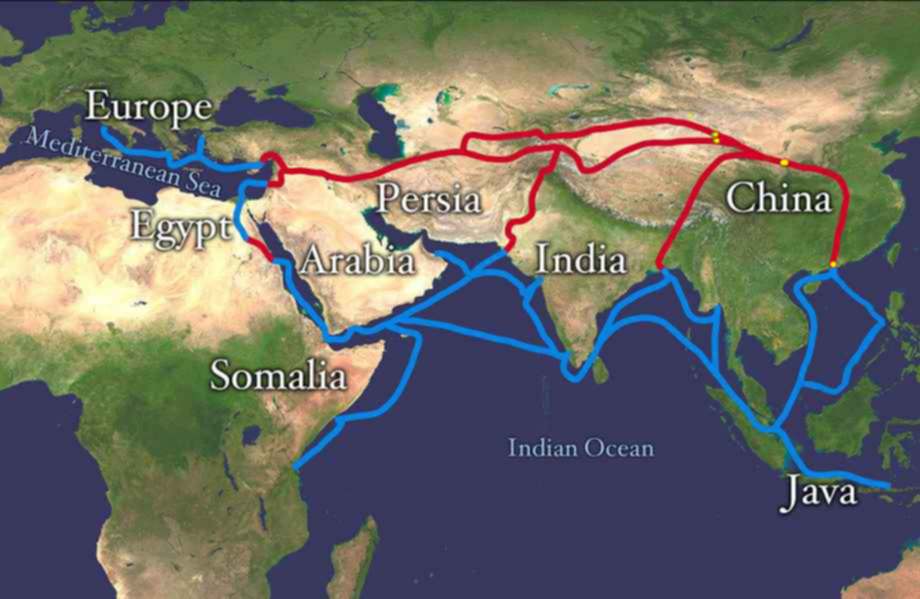
(source:
By NASA/Goddard Space Flight Center http://upload.wikimedia.org/wikipedia/commons/7/74/Silk_route.jpg)
For details about the Silk Road:
Wikipedia.
The Grand Canal sped up domestic north-south transportation.
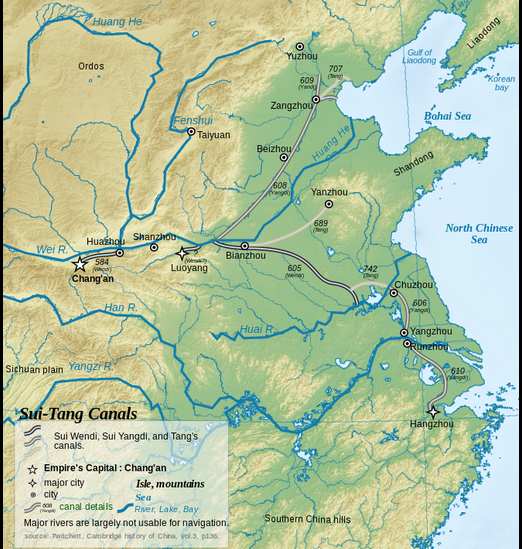
(source:
Yug (talk) East Asia topographic map.png: Ksiom (East_Asia_topographic_map.png) [GFDL (http://www.gnu.org/copyleft/fdl.html) or CC-BY-SA-3.0 (http://creativecommons.org/licenses/by-sa/3.0/)], via Wikimedia Commons).
For details about the Grand Canal:
Wikipedia.
* * *
The Tang Dynasty can be divided into four periods based on the strength of the empire.
The spirit and mood of Tang poems are more or less in sync with these time periods.
The four periods (which overlap to a certain degree):
(1). The Early Tang from the beginning of the dynasty in 618 until around 712 -- about 100 years of thriving development.
(2). The High Tang -- the most prosperous period -- from around 712 until the An Lushan Rebellion 安禄山之乱 in 756. This corresponds
with Emperor Tang Ming Huang's 唐明皇 40 plus year reign. And it was also the peak period of Tang poetry.
(3). The Mid Tang from around 756 to 827 -- The An Lushan Rebellion was the turning point making Tang a precipitous downward spiral and continued for
about 70 years.
(4). The Late Tang from around 827 until the fall of the dynasty in 906, about 80 years of further decadence and accelerated decline.
(Continue reading or return to
"... I encourage you to first read Chapter 2 - The Historical Path that Led Tang to Glory".)
3. Tang Ming Huang - the Key Promoter of Tang Poems
(1).
Early life
(2).
Political Infighting in the Inner Court
(3).
Consort Yang Guifei
(4).
The Consort and Concubine Systems
(5).
The Female Civil Service System
(6).
The Eunuch System
Tang Ming Huang 唐明皇 (literally Tang Brilliant Emperor), also known as Tang Xuan Zong 唐玄宗, was one of the most powerful and colorful figures in China history. He instituted an emphasis on poetry writing in the imperial examination system that contributed to the flowering of the Golden Age of Tang poetry.
(1). Early Life
Tang Ming Huang was born Li Longji 李隆基 and was the third son born to Emperor Li Dan and Consort Doude. When Li Longji was five years old, his grandmother, Wu Zetian, usurped the throne from her fourth son Li Dan. Three years later, when Li Longji was eight years old, his mother disappeared without a trace along with Crown Princess Liu (Li Dan's wife), after paying a visit to Empress Wu Zetian -- their mother-in-law. They were never heard from again. After the incident, Li Longji was cared for and raised by his two aunts at the imperial court. The bright, little Li Longji never lost the favor of his grandmother, Empress Wu Zetian.
Seventeen years later, the 25-year-old Li Longji, ever capable and clever, launched an imperial military coup, overthrowing the then Emperor Li Xian (his uncle and third son of Wu Zetian. He had usurped his mother five years earlier) and grabbing the throne back for his father, Li Dan. Two years later, Emperor Li Dan abdicated in favor of Li Longji.
Tang Ming Huang, a multi-talented person, was excellent at military affairs, politics, and literature. During the first 30 years of his reign, he was an able monarch with a cosmopolitan outlook and a sharp eye for identifying capable ministers to carry out his policies. Instead of engaging in war to expand state territory he placed the bulk of state military forces along the border regions to protect the homeland and built military stations along the Silk Road, securing it to facilitate international trade. These actions, coupled with other prescient policies such as improving the quality and quantity of monopoly silk products (akin in desirability to today's petroleum products) and maintaining an inclusive, open-door policy in international relations, helped the Tang to reach its peak as the pre-eminent civilization in the world at that time.
During his 44 year reign, he had 33 "prime" ministers (among them, the famous and capable were Yao Chong 姚崇, Song Jing 宋璟, Zhang Yue 张说, Zhang Jiuling 张九龄 and Pei Yaoqing 裴耀卿). In the Tang Dynasty, the emperor would appoint several "prime" ministers at the same time to assist in directing state affairs, rarely relying on just one. The head counts and the lengths of terms varied, dependent upon the predilections of the individual emperor.
(2). Political Infighting in the Inner Court
The Tang Dynasty, as with all other dynasties before it, never managed to institute a regularized and stable procedure for dealing with succession. The absolute power wielded by an emperor attracted many ambitious princes, dowagers, consorts, eunuchs, etc., like moths to a flame. The competition and fighting among these aspirants to the throne was one of the endemic factors that weakened state strength over time in all dynasties.
In 715, after two years on the throne, Tang Ming Huang bypassed his eldest son and selected his second son, 15-year-old Li Ying 李瑛, as the Crown Prince (Tang Ming Huang had a total of 30 sons). Li Ying was the son of his favorite consort Zhao Lifei 赵丽妃 and threatened the position of Empress Wang, who had bore Tang Ming Huang no children. In order to regain the favor of the emperor, her brother, Wang Shouyi 王守一, tried to use a magic talisman to help her, the fact of which was discovered by consort Zhao Lifei. As a result, Empress Wang was deposed and died a few months later, while her brother, Wang Shouyi, was executed. Two years later, consort Zhao Lifei, herself, succumbed to illness.
Tang Ming Huang had a total of 29 consorts. one of them --
Consort Wu Huifei 武惠妃 -- bore Tang Ming Huang four sons and three daughters and kept Tang Ming Huang's favor throughout his lifetime. Wu Huifei, an ambitious woman, moved aggressively to replace Crown Prince Li Ying with her son, Li Mao 李瑁, after the death of consort Zhao Lifei.
She entered into a tactical alliance with Li Linfu 李林甫, helping the latter
to the position of a prime minister in exchange for Li lobbying on her behalf to have her son replace Li Ying as Crown Prince.
In 734 Li Linfu landed his dream post as a prime minister and started to lobby on Li Mao's behalf. Due to the strong opposition of another prominent and upright Prime Minister, Zhang Jiuling 张九龄 (a noted scholar and poet, as well), in the end, Tang Ming Huang did not replace Li Ying with Li Mao.
At the beginning of 736, Prime Minister Li Linfu accused Zhang Jiuling and Pei Yaoqing 裴耀卿, both competent and dedicated prime ministers, of engaging in factionalism. Emperor Tang Ming Huang was convinced by Li and removed Zhang and Pei, appointing Niu Xianke 牛仙客 instead, alongside Li Linfu. Niu was essentially a yes-man to Li Linfu; thus, Li Linfu assumed full ministerial power for himself for the next 16 years. This event has often been viewed by traditional historians as the turning point of Emperor Tang Ming Huang's reign and of the Tang's fate.
Later in the same year, Crown Prince Li Ying, along with two of his brothers and a brother-in-law, were entrapped as traitors in a conspiracy scheme concocted by consort Wu Huifei. The three princes
were forced to commit suicide by Tang Ming Huang, while the brother-in-law was executed. After their deaths, Wu Huifei -- troubled by her own conscience -- spiraled into a delusional breakdown and died shortly thereafter. She was never accused of any wrong doing, however. On the contrary, she was conferred the title of "Empress" posthumously by Tang Ming Huang.
After Li Ying died, the title of Crown Prince again bypassed Li Cong, the eldest son of Tang Ming Huang, to his third son Li Heng 李亨.
(Nineteen years later, after Li Heng ascended the throne, he exonerated his three brothers and
brother-in-law and posthumously re-conferred the title of Crown Prince to Li Ying. At the same time, he stripped Wu Huifei of her title as Empress, along with all other honors. Wu Huifei's son, Li Mao, curiously enough, was not get impacted and eventually died at age 60 by natural causes. Emperor Li Heng also posthumously honored his mother by conferring upon her the title of the Empress of Yuan Xian 元献. He also conferred upon his deceased eldest brother, Li Cong, the title of Emperor Fengtian, and upon the latter's deceased wife, the title of Empress Gongying.)
In addition to 30 sons, Tang Ming Huang also had 29 daughters who were all
married off to outstanding military officers or men from influential families. Marrying off of imperial princesses was the traditional manner in which to confer favor to powerful and affluent families and thereby consolidate the power of the Tang emperor.
Five Tang princesses married into the family of the famous General, Guo Ziyi 郭子仪. General Guo Ziyi served under four Tang emperors and was credited for numerous outstanding military achievements during and after the An Lushan Rebellion. He was twice promoted the position of prime minister (all the aforementioned marriages and promotions occurred during and after the reign of Emperor Li Heng.)
Some Tang princesses were married off to rulers of the border tribal states, usually in conjunction with a
peace treaty. Actually, most of these were "promoted" princesses and rarely of actual direct imperial lineage.
(3). Consort Yang Guifei
After the death of consort Wu Huifei, Tang Ming Huang sank into a depressed state. There were twenty some consorts and a great many concubines in the imperial harem, but none of them could satisfy or cheer him up. That is, until almost three years later, when Yang Guifei 杨贵妃 caught his eye. He was deeply attracted by her wits, charm, and voluptuousness, but she was already the consort of Prince Li Mao 李瑁 -- Tang Ming Huang's 18th son by Wu Huifei. Yang Guifei had been Li Mao's consort since the age of either 14 or 16, according to different sources.
Up to the beginning of the Tang,
ethnic and cultural integration and mixing had been going for some 200 years from the time of the "Five Hu and Sixteen Kingdoms" 五胡十六国 era (The "Five Hu" were
the five major "barbarian" minorities -- Xiongnu/Huns 匈奴, Jie 羯, Xianbei 鲜卑, Qiang 羌 and Di 氐).
Mixed-marriages between Han and Xianbei 鲜卑 ethnicities were in particular very popular and prevailed in the Tang royal family, as well as the rest of the aristocracy. After moving into Tang areas or acquiescing to Tang rule, the Xianbei still retained most of their traditional customs and life style. Due to the fact that their recent ancestors had been nomads,
they were less rigid with respect to male and female relationships and roles, unlike the Han, who had already internalized rigid Confucian rules and codes.
The 25 year old Li Mao eventually sensed his father's feelings and without any hesitation, he consecrated Yang Guifei, at age 21, to the 55 year old emperor. This was done by first sending her to a Taoist temple to become "cleansed" as a nun. Yang Guifei stayed in the convent for only a very short period of time though, before Tang Ming Huang called her back to the secular world to become his favorite consort. Five years later, he promoted her the highest level within consort system. The "favor" also extended to her sisters and cousins.
Yang Guifei bore Tang Ming Huang no children; therefore, there was no court intrigue or infighting surrounding her based upon jockeying for the crown prince position. However, a power struggle slowly began simmering, nonetheless, between Yang Guozhong 杨国忠 -- Yang Guifei's cousin -- and Li Linfu 李林甫. In 752 Yang Guozhong, despite of his incompetence, finally replaced Li Linfu as the chief prime minister.
For years, the entire Yang clan
indulged itself in a life of extreme luxury and comfort under the Tang Emperor's grace until the An Lushan Rebellion broke out.
(4). The Consort and Concubine Systems
Written documentation of the consort system can be traced to the *Rites of Zhou 周礼, which recorded that the ruler of the state may have only one empress, but up to 120 consorts.
While scholars since the Han dynasty have been debating the true identity, creation date, authorship, and contents of the Rites of Zhou, it has nevertheless continued to serve as a "bible" of governance that has been repeatedly referenced by rulers of various Chinese states for thousands of years.
Note:
*Rites of Zhou 周礼
(in Chinese only)
www.baike.com/wiki/%E5%91%A8%E7%A4%BC
ctext.org/wiki.pl?if=gb&res=631668&remap=gb
周礼全经释原
https://baike.baidu.com/item/%E5%91%A8%E7%A4%BC/1639127
When Li Yuan 李渊 established the Tang dynasty, he adopted the consort system of the previous Sui emperor, Yangdi 隋煬帝, setting the official number of consorts at 120, but also adding a large number of concubines, whose number was not recorded. The second Tang emperor, Li Shiming, reduced the number of official consorts to 40, but still had quite a few additional concubines. As the dynasty developed, each successive emperor would eventually vary the number of official consorts to his own liking.
Consorts were selected from prominent families and conferred various levels of titles and ranks based upon their family backgrounds and the emperor's liking. It was a great honor for a family to have
a daughter selected as a consort.
As for the concubines, due to their low social status, their head counts and vital statistics were not recorded by convention. But the numbers were huge. It was said that some of them never actually even met the emperor during their lifetime while being kept in the imperial harem!
In ancient China, a man -- from highest emperor to the lowliest commoners -- by law could only have one wife, but were allowed to have concubine(s). Of course, had one been married to a headstrong and jealous wife, this would have invited more headache than enjoyment.
The consort and concubine systems endured throughout all the dynasties of China until the end of the Qing 清朝 in 1912, which also marked the end of imperial rule in China. The next regime -- the Republic of China -- codified into law provisions for women's equal rights to some degree. It included the right to public education and the right to apply for civil service employment, both of which provided women a chance at financial independence and marked the beginning of dramatic changes yet to come for Chinese women (In 1947 the Constitution of the Republic of China granted women the right to vote and to stand for election).
(5). The Female Civil Service System
The Female Civil Service System originated in the Han 汉 Dynasty (202 BC - 220 AD). The Tang adopted and modified the system as it inherited it from the previous Sui 隋 Dynasty. During the Tang, it was divided into six major departments. The purpose of the Female Civil Service System was to run the Imperial Household and the domestic "inner" or "back" court, including providing training and education for female members of the inner court, documenting the activities of the inner court, preparing and staging certain events, and archiving and maintaining a records library, among other duties. It employed hundreds of female officials of various ranks from "5" to "9", with 5 being the highest rank.
Female officials were selected from ordinary families who had provided good
home-school education and/or special skills. A lady-in-waiting could be promoted into an official Female Civil Service position by taking and passing a specific skills test. Their activities were confined to the imperial back court and they were required to remain celibate. Release from court service was only granted for special reasons; thus, most officials would spend almost their entire lives in the imperial inner court and then finish their lives at imperially managed convents as nuns, if they chose not to return home in old age.
The most famous female official in Chinese history was Shangguan Waner
上官婉儿 of the Tang Dynasty. Not long after she was born, her grandfather, Shangguan Yi 上官仪 -- a prime minister of Tang Emperor Li Zhi 李治 (Wu Zetian's second husband) -- was executed by the Tang court under possibly trumped-up charges of plotting treason. The entire family suffered as a result of *collective punishment -- Shangguan Waner's father was also executed, and she (an infant at the time) and her mother were sent by orders
to serve as slaves in the imperial inner court. There, she was
home-schooled by her enslaved mother in their spare time. She excelled at literature and
was highly knowledgeable; therefore, Empress Wu Zetian promoted her to the Female Civil Service system and later released her and her mother from slave status. Due to her competence and adaptability, she eventually became Wu's right-hand woman and won the nickname of
"the female Prime Minister in the back court". In the end, she rose to become a high level consort to Emperor Li Xian 李显 (the third son of Wu Zetian) and cleared her grandfather and father of the alleged crimes for which they had been executed.
In the summer of 710, Li Longji 李隆基 (the future Tang Ming Huang) led a bloody, imperial military coup, assassinating his uncle, Emperor Li Xian, along with many of Li Xian's family members, including the then 46 year old Shangguan Waner. Also decimated were a great many of Li Xian's key staff personnel, including then Prime Minister Zong Chuke
宗楚客. Some of the Prime Minister's family members were spared, though, and thirty-three years later one of Zong Chuke's granddaughters tied the knot with Li Bai, becoming Li's third and last wife.
Waner savored literature and wrote many poems during her lifetime. However, most of her poems were lost, with only 32 having been collected into the Quan Tang Poems 全唐詩.
*collective punishment regime 連坐制 :
This system can be traced back to the Warring States Period 战国时代
(the 5th century BC to 221 BC). It was originally practiced in the army and then later used by the Qin 秦 rulers to punish traitors and consolidate their power. Punishments of varying degrees (but often death) would extend to all innocent family members or neighbors with ties to the punished.
One cruel, but hardly out of the ordinary, example was the consolidation of power of the second Tang emperor. During the first Tang Emperor Li Yuan's 李渊 reign, his three capable sons competed for succession to the throne. Finally in 626, Li Shimin 李世民 defeated and executed his elder and younger brothers and ascended the throne.
He then
executed all of the two brothers' male offspring and dispatched their entire female households to serve as slaves or maids in either the inner court or in remote, far-flung areas. Though these three brothers were born to and raised by the same mother -- Empress Dou (569 - 613), this was the norm for rulers in dealing with their opponents -- even family -- and traitors in ancient China.
This system of punishment survived all the way into the modern era, when, finally, due to its extreme inhumanity and slow growing pressure from a modernizing society, it was finally abolished around the end of Qing Dynasty in 1905.
(6). The Eunuch System
Castration of eunuchs in ancient China contemplated the removal of not only the testes, but of the penis, as well. It was imposed upon the young offspring of defeated enemies in ancient times until the Sui Dynasty (581 - 618). It was also administered as form of punishment for criminals.
The most infamous castration in Chinese history is that of Sima Qian 司马迁, a
famous historian and author of the Shiji 史记 or "the Records of the Grand Historian"
(Wikipedia), which covers the history of China from the legendary Yellow Emperor to the reign of Emperor
Han Wudi 汉武帝 -- a period of some 2,500 years.
Due to his speaking up in defense of General Li Ling 李陵 (the grandson of Flying General Li Guang 李广) and insisting on recording the truth in historical records, he annoyed Emperor Han Wudi, who then ordered him castrated at age 46.
On the other hand, for those willing to undergo castration at puberty, this could serve as a pathway, especially for those from impoverished families, to gain employment in the imperial palaces.
In the Tang Dynasty, there were a great number of eunuchs employed at the palaces, especially in relation to the harem, where un castrated males were prohibited. During the Early Tang, there were around 3,000 eunuchs employed by the court, which gradually rose to over 5,000 by the end of the dynasty.
(Source:
The Eunuch in the Tang Dynasty by Wang Shounan [in Chinese only]) 唐代的宦官 (作者: 王壽南): 㐧二章 - 唐代内侍省之组织与聀掌
Due to the intimate nature of service they provided emperors, empresses, and empress dowagers, eunuchs ended up exerting a great amount of influence in the imperial court. In fact, beginning with Tang Ming Huang, eunuchs could not only wield political power, but also tremendous military power, as well. Such was the case with Gao Lishi, who was appointed as a Biaoqi Great General 骠骑大将军.
Thus, in the Later Tang, the eunuchs also became embroiled in the internal power struggles and machinations among the factions of the princes, empress dowagers, and consorts.
Yet there have been many a famous and capable eunuchs in China's history, too, such as Cai Lun 蔡伦
(
Wikipedia) who improved papermaking technology in the early 2nd century and
Zheng Hé 郑和
(Wikipedia), a great navigator, explorer, and diplomat in the early 15th century.
Zheng Hé commanded seven expeditionary voyages from 1405 to 1433, reaching as far as East Africa. He completed his last voyage 86 years before Ferdinand Magallan's expedition to the East Indies (1519 - 1522) and 59 years before Christopher Columbus set foot on the American continent (1492).
The voyages of Zheng Hé:
(Source:
"CC BY-SA 3.0, https://commons.wikimedia.org/w/index.php?curid=25712968").
The expeditions did not bring sustained economic prosperity to China afterwards, as the Ming government reinstituted a closed-door policy after Zheng Hé's final voyages, prohibiting further official outlays for sea-faring ventures and activities.
Due to its inhumane aspects, the eunuch system and practice of castration ended with the fall of Qing Dynasty in 1912.
4. The Turning Point of the Tang - the An Lushan Rebellion
The rebellion started in December 755 and lasted through February 763 for a total of seven years and two months. This was the fateful turning point of the Tang Dynasty.
An Lushan 安禄山, of mixed Sogdian (a tribe with Iranian 伊朗 roots ) and Gokturk 突厥 (a Turkish 土耳其 tribe ) origins, was
one of seven
Military-Governors or "Jiedushis" 节度使 during Tang Ming Huang's reign and was fluent in seven languages.
In the Tang,
a Military-Governor/Jiedushi exercised military, administrative, and tax collecting powers within the region he governed. They were assigned to guard the border areas of the Tang empire. There were a total of 10 border regions. An Lushan alone held three regions covering the area including present-day Bejing and its vast surrounding area. This encompassed most of the north of Hebei 河北 Province and parts of northwest Liaoning 遼寧 Province, as well as northeast Shanxi 陝西 Province, all collectively known as Youzhou 幽州.
An wielded tremendous military power, commanding more than 150,000 troops out of a total 490,000 assigned to all the Military-Governors/Jiedushi (source:
the New Tang Book and the Old Tang Book [in Chinese only] 新唐书 和 旧唐書 列傳第一百五十)
Before becoming a
Military-Governor/Jiedushi, he was an international trader, specializing in silk and horse commerce in the northeast region of present day China, where he was raised.
An's rise to power was mainly aided by Prime Minister Li Linfu 李林甫, who conspired with him early on to win over Tang Ming Huang's favor.
In the traditional Chinese bureaucratic system, a military general who had enjoyed great military achievements and also displayed a highly educated upbringing was a prime candidate for a ministerial position. An Lushan, who spoke fluent Chinese but could neither read nor write it, therefore posed no threat to Li Linfu's position in the court. While Li Linfu was in power, he not only removed all political rivals and competent prime ministers from the court, he also advised Tang Ming Huang to keep reducing the power of capable and loyal Tang generals and increase those of commanders native to the border regions. Chief among these beneficiaries was An Lushan.
An Lushan was quite overweight, but could still move around nimbly. Once, while dancing to native Fu music, he improvised twists and turns, supposedly flopping like jello in a whirlwind in front of Tang Ming Huang, who joked, "What's in your big tummy?"
"Nothing, but a royal heart!" he answered.
In 752 Tang Ming Huang replaced Li Linfu with Yang Guozhong 楊国忠 as prime minister (Li Linfu died the next year by natural causes). An Lushan
lost his inside connection with the court and instead was now faced with Yang Guozhong, with whom he had always had an uneasy relationship.
In December 755, An Lushan joined forces with his old friend Shi Siming
史思明, also a buffer region
Military-Governor/Jiedushi of the same age and background, to foment an uprising under the call of "Protect the Nation's Lord; Remove the Treacherous Yang Guozhong!"
"擁護国君, 清除乱臣贼子楊国忠!" The two led 170,000 troops towards Luoyang.
Within six days of the start of the rebellion, intelligence information arrived at Chang'an and nearby Mt. Li/Lishan 骊山 (equivalent to about 600 mi/965 km as the crow flies) -- a scenic hot springs area that served as both a summer and winter vacation resort for the Tang royal family -- where Tang Ming Huang was relaxing at the time with Yang Guifei at the Huaqing Pool 华清池 hot springs. At first Tang Ming Huang doubted the veracity of the intelligence reports. He did not believe that An Lushan would betray him.
At the beginning, An Lushan's troops conquered every city and town, one by one, with little resistance, except for Pinyuan 平原, about 200 miles to the south of Beijing. There, they encountered a fierce counter-attack by the Governor of Pinyuan 平原太守, Yan Zhenqing 颜真卿 -- an excellent military strategist and famous scholar-calligrapher.
An Lushan quickly conquered all other major cities and military posts, however. In the early spring of 756, An Lushan occupied Luoyang 洛阳, about 200 mi/322 km east of Chang'an and declared himself the emperor of Yan 燕 in Luoyang. After a short period of consolidation and reinforcement, An Lushan rebels marched at the beginning of summer toward Tong Pass/Tongguan 潼关, the key, strategic military stronghold protecting the eastern approach to Chang'an.
The main path that An Lushan followed from December 755 to June 756 in his advance on Chang'an:
(This map may be freely copied from www.mariesun.com for educational or noncommercial purposes of uses with a reference to "Marie Sun and Alex Sun at MarieSun.com".)
Source of map outline:
Joowwww [Public domain], via Wikimedia Commons.
Due to badly planned military strategy devised by the court through Prime Minister Yang Guozhong, Tang General Geshu 哥舒 was overcome by An Lusan at Tong Pass/Tongguan. An Lushan's insurgents passed through the military stronghold and marched into the capital of Chang'an. Meanwhile Tang Ming Huang fled in a panic with his court staff and entourage, including favorite royal family members, escorted by imperial guard troops. The destination was Chengdu, Sichuan Province 成都, 四川省, but after traveling only 25 mi/40 km to the Mawei Courier Station 马嵬驿 (today's Xingping City, Shanxi Province 兴平市, 陕西省),
the imperial guard troops lead by Crown Prince Li Heng 李亨 refused to continue. Both generals and soldiers were furious with Prime Minister Yang Guozhong and his incompetent strategy which they blamed as bringing about the disastrous defeat at Tong Pass.
They demanded the execution of Yang and all his corrupt family members as punishment for causing the state catastrophe.
The enraged soldiers eventually rose up and stabbed Yang Guozhong, his sons, and other family members to death in a rampage. The furious soldiers also insisted on the life of Yang Guifei, accusing her of evil connivance. In order to avoid a military coup and under eunuch Kao Lishi's advice, the heart-broken Emperor Tang Ming issued an imperial order forcing Yang Guifei to commit suicide.
About 50 years later,
poet Bai Juyi
白居易 wrote a famous poem called "Everlasting Regret" "長恨歌" regarding the tragic end of Yang Guifei. In the poem, he described Yang as being strangled to death in front a horse at Mawei Courier Station. Others, however, claimed she was strangled with a strip of white silk inside a Buddhist temple, while still others said she was stabbed to death by furious soldiers filled with bloodlust. Since it all transpired in a haste and in chaos, nothing was contemporaneously recorded.
After the incident, instead of escorting Tang Ming Huang to Chengdu 成都, Crown Prince Li Heng abandoned him and took his troops towards Lingwu 灵武, 300 mi/483 km northwest of Chang'an. After arriving at Lingwu, Li Heng proclaimed himself the new Tang Emperor. Thereafter, further disintegration of order spread throughout the whole empire, with the leaders of the border regions taking the opportunity to declare independence one by one.
Strategizing collaboratively,
General Guo Ziyi 郭子仪 and General Li Guangbi 李光弼 recaptured Chang'an the next year. However, the civil war outside Chang'an continued to grow and spread.
Guo Ziyi, a famous and capable general who excelled at both military and political strategy, had tested to the level of "Martial Champion" 武狀元 in the imperial military examination during the early years of Tang Ming Huang's reign. Yet due to the interference and machinations of eunuchs, he was twice
stripped of all military power and made to idle at home
while a critical war was raging all around.
After Chang'an was recovered, Emperor Li Heng moved back to the city, inviting Tang Ming Huang to also return from Chengdu. Tang Ming Huang hesitated at first, since there was still a grudge between the two of them. However, in the end, he relented. On his way back to Chang'an he arrived at Mawei Courier Station, where he planned to give Yang Guifei a proper burial, but her body could not be found.
After arriving back to Chang'an, Tang Ming Huang was honored by Emperor Li Heng as the "Taishang Huang" 太上皇 or "Great Retired Emperor". However, the powerful
eunuch
Li Fuguo 李辅国, who controlled the imperial military guard troops, kept stirring up
ill-will between the two of them. In 760, Emperor Li Heng
placed Tang Ming Huang under house-arrest at Ganlou Hall in the Taiji Palace 太極宮 and banished Gao Lishi,
Tang Ming Huang's favorite eunuch, to Wu Zhou 巫州 in the Yelang 夜郎 district.
Two years later, Tang Ming Huang died in bleak and desolate circumstances at age 76. Sixteen days later, an illness-stricken Emperor Li Heng also died of shock after hearing that his wife, empress Zhang, had been killed by the eunuch Li Fuguo. The two had been engaged in a power struggle for quite a while. After managing Crown Prince Li Yu's 李豫 ascent to the throne, Li Fuguo was soon thereafter promoted to the position of prime minister -- the first and only eunuch to act as sole prime minister in Chinese history. That same year, though, the new Emperor took the advice of the eunuch Zhen Yuanzhen 程元振 and sent an assassin to liquidate Li Fuguo.
From this time forward, the Tang royal family would never again be able to rid themselves of the influence of politically and militarily powerful eunuchs who would interfere in state affairs and determine which royal family member sat on the throne. The Tang was, thus, never able to recapture its former robustness and resilience.
Due to the internecine fighting and assassinations among the leaders of the An Lushan rebellion, the Tang forces were eventually able to take advantage of the chaos, bringing an end to the rebellion after seven years and two months of rampaging turmoil. It left the country still rather disorganized, however, with continuing local skirmishes and border region uprisings. The Silk Road along the Hexi Corridor -- one of the most important economic arteries of the ancient world -- was cut off and international trade between East and West was interrupted for some 80 years.
The only area of the empire that was not directly impacted by the rebellion was the
Jiangnan 江南 region (mostly the region south of the Yangtze River, centered along the Yangtze River Delta and its surrounding area).
Tang Ming Hung's blind trust in Li Linfu during the last 16 years of his reign had helped An Lushan rise to power, and eventually the latter brought Tang Ming Huang's empire to its knees.
5. References within the Book
(1).
The Imperial Examination System 科举制度
(2).
The Hanlin Academy 翰林院 and Hanlin Scholar 翰林学士
(3).
Zuoshiyi 左拾遗 and Youshiyi 右拾遗
(4).
Rank and Salary Chart 官阶, 薪俸表
(5).
Preface of the Caotang Collection 草堂集序
(1). The Imperial Examination System 科举制度
While the first stirrings of the imperial examination system 科举制度 (pinyin: Kē jǔ zhì dù) began in the Han dynasty around 165 BC, its coalescing into a regularized regime can be traced back to Emperor Sui Wendi 隋文帝 of the Sui 隋 Dynasty in 587. The system
was consolidated and officially established, however, only in 605 by Emperor Sui Yangdi 隋炀帝 (Yang Guang 杨广) and improved upon during the Tang Dynasty.
The system was set up for the purpose of ensuring that only the most capable individuals were selected for government and administrative positions by means of competitive categorized examinations (采用分科取士的办法,所以叫做科举). It encompassed more than 20 subject categories, including medicine, law, math, history,
calligraphy,...etc. Among all the different degree-titles that issued from the examinations, the jinshi degree-title was the hardest to obtain. However, securing this would lead to a bright future -- a great many Tang prime ministers were jinshi title holders.
At the beginning it was a
two-tiered system, consisting of a county and then a court exam (in following dynasties, it morphed into three or even
four-tiers, with each tier progressively more difficult than the last), each of which was held once a year. There were also occasional ad hoc imperial examinations held by the emperor for special purposes (in addition, there was a special imperial examination for selecting high military officials called wuju 武举 which was not as heavily relied upon as the civil service examination system). To sit for the jinshi degree-title exam, the candidate was required to write policy essays on current event issues, individually interpret quotations from the Confucian classics (among others) compose poetry, and engage in other technical writings.
It required literary talent and the ability to craft insightful, policy-oriented analyses, as well as possess acumen in interpreting passages from *the Four Books, *the Five Classics, and other ancient tomes. The success rate for jinshi examinees was only between 1 and 2 percent compared to 10 to 20 percent for mingjin degree-title applicants (limited to mastering *the Four Books, *the Five Classics and other classics) (source: Tongdian Chapter 15 [in Chinese only] 通典 - 卷15 選舉: “其進士大抵千人,得第者百一二;明經倍之,得第者十一"). A total of 6,504 jinshi titles were conferred during the course of the Tang Dynasty, an average of only around 23 per year.
(the Confucian classics -- the Four Books and the Five classics were included across all exams, weighted differently depending on the exam)
After passing the last tier of court exams, a candidate would then be assigned to a local civil service position to begin his career. The exception to this was the jinshi degree-title holder. His career was expected to usually begin as a civil servant in the imperial court.
A jinshi degree-title during the Tang Dynasty was the equivalent to a joint literature and political science Ph.D. degree of today. However, obtaining a jinshi degree-title alone did not guarantee appointment to a position in the civil service at the imperial court.
After obtaining a jinshi title, candidates usually had to still pass one last "guan" or gate exam 关试 (once called Li Shi 吏试 or fu shi 复试) to obtain an civil service post at the imperial court. However, there was always the "fast track" -- to be socially connected and thereby obtaining the recommendations of an influential person in at the court.
The system helped to weaken the aristocracy’s monopolistic grip on governing institutions, while at the same time consolidated the emperor's power. It also stimulated the common people's desire for education and brought about a measure of social stability by projecting an image of social mobility and equality based on an individual's tested capabilities, regardless of background (to an extent). Meanwhile, the old Nine-Rank Method 九品中正法 of filling government positions did not completely die out during the Tang (and all dynasties to follow), but it was no longer the predominant method to gain an assignment to an administrative post. The Nine-Rank Method simply gave existing government authorities the task of selecting capable civil service candidates, then categorizing them into nine ranks depending upon on their abilities. In practice, however, only the rich and powerful would be selected and assigned the highest positions.
The examination system, unsurprisingly, produced a class of administrators and scholar-gentries 士大夫 marked by great conformity, since they had all studied and been indoctrinated by the same material --
the Confucian classics. Therefore, they tended to all abide by the same social value concepts and beliefs and
followed and reinforced then existing social conventions, morals, and virtues based on Confucianism. They acted as a centripetal force indirectly sustaining and consolidating Chinese culture and had a great impact on helping to stabilize society.
Since Tang Ming Huang relished poetry and literature, starting from his reign, the jinshi examination began to emphasize more and more the ability to compose poetry.
The intelligentsia were encouraged to spend time and effort on honing their poetry writing skills. This was a major reason
for the explosion onto the scene during the Tang of so many great poets such as Li Bai, Du Fu, Wang Wei, and others. Thus, Tang Ming Huang has been credited by Chinese historians as the catalyst for this Golden Age of Chinese poetry.
The spread of education and promotion of poetry among the populace was aided by another factor other than just the imperial examination system, though. Paper-making skills were greatly improved during the Tang Dynasty, which helped encourage the cheap copying and production of texts, scriptures and literary works. Education was, thus, no longer attainable by only the very powerful and rich. Advancements in woodblock printing techniques allowed for color prints and illustrations during this period, which also made texts more attractive and accessible. (for details:
Wikipedia - printing books in Tang or
Wikipedia - printing)
Around 1040 AD Bi Sheng 毕升
(Wikipedia) developed the world's first known movable print block system
(Wikipedia - Movable type printing).
As for the offspring of the royal family and high ranking officials, they were educated by the state run school system. The offspring of the royal family were exempt from the imperial examination system and could be placed directly into very high official positions. As for the offspring of high ranking officials, they could directly take the imperial jinshi exam without first jumping through the hoops of taking lower tier prerequisite exams.
Commoners, on the other hand, were educated through private schools called sishu 私塾 (pinyin: sīshú) which could be small affairs of only 2 or 3 students or large ones run by a clan to educate all their offspring. Commoners had to pass prerequisite exams in the lower local tier(s) in order to qualify for the imperial court examination.
In order to assist applicants who were poor or resided in the distant reaches of the empire,
the local and central governments would provide them with free transportation to and from the exam, as well as free lodging, or other subsidies. This assistance policy endured through all dynasties.
The succeeding dynasties -- Song, Yuan, Ming and Qing -- all continued the imperial examination system of the Tang, but made their own modifications to examination contents and procedures. For example, in the Song Dynasty that followed, poetry composition was removed from the examination, and emphasis was shifted to policy and law-oriented analyses. The Song also started to seal examinee names and required re-copying of answers by a third party onto new sheets of paper, as a way to guard against any favoritism (through name or handwriting recognition) and to make the exam as fair as possible.
Starting in the Ming Dynasty and continuing further in the following Qing Dynasty, the emphasis further shifted towards the
the Eight-Legged Essay or baguwen 八股文 (Baidu, in Chinese only) which limited the focus of testing to only *the Four Books 四书 and *the Five Classics 五经. Occasionally some other classics might be added to the testing repertoire. The essay forms were divided into eight sections, imposing restrictions on the number of words, writing styles, and acceptable interpretations of the "classics". In particular, only interpretations in line with pre-designated analyses written by the ancient conservative scholars were acceptable. Even the writing tone had to mimic that of Confucius, and not betray an independent or creative thought.
In the end, the system did not allow examinees to freely express their own ideas and thoughts on any matter, political or otherwise. For over a millennia it greatly limited the elite class' abilities to think creatively and independently.
But it had its political purpose, and it served that purpose surprisingly long and well -- to create a professional, obedient, self-sustaining mass of followers who would stabilize the ruler's position and power.
Due to its inadequacy in the face of the challenges of the modern world, the system, which had been in force for more than 1,300 years, was completely abolished in 1905 in the waning days of the Qing 清 Dynasty. Six years later, Republican revolutionaries overthrew the Qing and began to select personnel for the nascent civil service system of the Republic of China, based on a candidate's professional training or experiences and academic degrees. But it also resurrected a modified examination system based on modern subject matters (as opposed to solely Confucian classics), that served as a third alternative to gaining government employment. It also began to allow females to enter the public education system and obtain employment in the civil service system.
Although Japan adapted the imperial examination system early in the eighth century during the Tang Dynasty, the Japanese aristocracy was on the ascent at the time. The spirit of equality and competency that infused the system -- selecting capable governing officials through competitive testing regardless of background -- was in direct conflict with the interests of the aristocratic class; hence
not long after its establishment, the imperial examination system was abolished in Japan.
The system had greater and more enduring influence on other neighboring Asian countries, however, such as Vietnam, Korea, and and the Ryukyu Islands.
* Note:
Four Books 四书, Five Classics 五经 (Wikipedia) -
Four Books 四书 (Chinese classic texts illustrating the core value of Confucianism):
1. Analects or Lunyu 论语 (
Wikipedia)
2. Mencius or Menzi 孟子 (
Wikipedia)
3. Great Learning or Daxue 大学 (
Wikipedia)
4. Doctrine of the Mean or Zhongyong 中庸 (
Wikipedia)
The Five Classics 五经 (of traditional Confucianism):
1. Book of Poetry or Shijing 詩經
(
Wikipedia)
2. Book of History/Book of Documents, or Shangshu 尚書 (
Wikipedia)
3. Book of Rites or Liji 礼记 (
Wikipedia)
4. Book of Changes or I Ching/Yi Jing 易经 (
Wikipedia)
5. Spring and Autumn Annals or Chunqiu 春秋 (
Wikipedia)
(2). The Hanlin Academy 翰林院 and Hanlin Scholar 翰林学士
The Hanlin Academy was an academic and administrative institution founded during the Tang Dynasty.
Membership in the academy was conferred upon an elite group of scholars who had already obtained a jinshi degree-title and had made meritorious contributions to the state or to the field of literature. One of the main duties for the members was to draft edicts for the Tang emperor. Other duties included
recording and maintaining the official history records of the country, acting as examiner of the imperial examinations, and composing odes to be performed at official ceremonies.
A scholar working in this position was called a "Hanlin Scholar" or simply "Hanlin" -- a prestigious honorific title that he carried with him even after leaving the academy. It was an honorary lifetime membership.
Passing the imperial jinshi examination, being appointed a Hanlin scholar, or working one's way up to the position of prime minister was almost every intellectual's life goal in China before the imperial examination system was abolished in 1905.
In the Tang Dynasty, many famous prime ministers and high ranking officials were Hanlin appointees, all having passed the prerequisite imperial examinations to be accepted into the academy -- all except one. Li Bai stood out as the only Hanlin scholar who never had to take the imperial examination,
but was nevertheless appointed to the academy based solely upon the favoritism that Emperor Tang Ming Huang showed towards him.
(3). Zuoshiyi 左拾遗 and Youshiyi 右拾遗
Zuoshiyi 左拾遗 literally means "one who picks up dropped items on the left side".
Youshiyi 右拾遗, on the other hand, is "one who picks up dropped items on the right side." The titles imply picking up after the emperor for items he may have dropped or missed. The responsibilities of both posts were essentially the same, although those possessing the title of the "left side" were usually ranked slightly higher
than those of the "right side".
The Tang emperors would traditionally take advice not only from ministers of high rank, but would also listen to and compare different opinions offered by remonstrative officials. The responsibility of these officials was to offer moral assessments and critiques of policies proposed or executed by the emperor, often directly to the emperor himself. The forthright remonstrative official, however, often ran the risk of bringing misfortune upon himself and sometimes even his family.
Many scholars and higher officials began their career as a remonstrative officials and then worked their way up.
It was the second to the last rank in the Tang civil service system (
view Ranks in next chapter).
(4). Rank and Salary Chart 官阶, 薪俸表
In the Tang Dynasty the civil service system was divided into nine ranks with "1" being the top rank and "9" the bottom. Each rank was further split into three sub-ranks.
The record of salary levels in this chart is based on Bai Zuyi's
白居易 (772 - 846) incomplete personal records. Whenever landing a position or getting a promotion, Bai Juyi often appreciatively recorded his salary. After a long career path, Bai was finally promoted to libushangshu 吏部尚书, rank 3.
| Rank |
Salary from (qian) |
Salary to (qian 钱) |
Year |
Note |
| 1 |
? |
? |
? |
reserved for royal family members with one exception -- *taizitaishi 太子太師 |
| 2 |
? |
? |
? |
reserved for royal family members |
| 3 |
80,000 |
**(100,000+) |
**(around year 822) |
prime minister and several officials of the highest rank w/ different titles (prime minister ranking above all others) |
| 4 |
60,000 |
79,000 |
? |
|
| 5 |
40,000 |
59,000 |
821 |
|
| 6 |
? |
? |
? |
|
| 7 |
? |
? |
? |
|
| 8 |
30,000 |
|
808 |
zuoshiyi and youshiyi (remonstrative officials) |
| 9 |
16,000 |
|
803 |
|
Note: *taizitaishi 太子太師 -
An honorary title conferred upon non royal family members who displayed broad knowledge and cultivated stellar reputations. The duty of a taizitaishi was to tutor the Crown Prince.
There were many taizitaishis throughout the course of the Tang. Yan Zhenqing 颜真卿, a statesman, scholar, calligrapher, and military strategist, was one of them. Traditionally, Chinese paid very high respect to teachers, who were not only treasured for their knowledge, but also expected to be exemplars of integrity.
** salary 100,000 qian, rank 3, around year 822:
The above data is gleaned from a poem written by Yuan Zhen 元稹 - Bai Juyi's long-time friend. Immediately after being promoted to the position of prime minister, Yuan wrote an long elegiac poem, called "An Elegy Sings the Sadness" "遣悲怀", in memory of his
long-deceased wife Wei Cong 韦丛, who died at age 27 when Yuan Zhen was only 31, long before he had made a name for himself. An excerpt from the poem states-
"...... I was poor
then, ...You went through a tough and frugal life with me all those years, ......
Today I am writing to you and telling you with my deep sadness that
now I'm making over 100,000 qian a year , but have no way to share it with you. And all that I can bring to you is sacrificial offerings in front of your headstone....."
" ...今日俸钱过十万,与君营奠复营斋..."
In addition to their salaries, high ranking officials also enjoyed many fringe benefits, such as free medical care, free and high quality education for their male offspring, paid sick leave/vacation, free basic food (rice, wine, vinegar, salt, etc.), charcoal, free uniforms for special ceremonies, and often land, differing in size according to rank level. Some benefits, such as free health care, continued into retirement.
For detailed information on salaries and benefits in the Tang Dynasty, please refer to the following links (in Chinese only):
http://zh.wikipedia.org/wiki/%E4%B8%AD%E5%9B%BD%E4%BF%B8%E7%A6%84%E5%88%B6%E5%BA%A6%E5%8F%B2#.E5.94.90.E6.9C.9D
http://www.baike.com/wiki/%E5%94%90%E6%9C%9D%E5%AE%98%E5%88%B6
http://www.360doc.com/content/12/0218/06/3157924_187510354.shtml
http://hk.aboluowang.com/2009/0412/125723.html#sthash.4OH7dHG3.dpbs
http://wenda.chinabaike.com/html/20104/q1533573.html
http://blog.sina.com.cn/s/blog_48fdcc450100c1mh.html
The military service
system was divided into nine ranks and each rank was further split into three sub-ranks, just as in the civil service system.
(5). The Preface of the Caotang Collection
草堂集序
The preface was written in the old classical Chinese style by Li Yangbing with neither punctuation nor separated paragraphs. Chinese traditionally understood the separation of verses by the tone and rhythm of the words. The verses are being punctuated here solely for the convenience of the modern reader who is unfamiliar with classical Chinese.
Important information is highlighted and explained at the end of the article.
-------
Contents
-------
草堂集序
宣州当涂县令 李阳冰
李白 字太白 陇西成纪人 凉武昭王暠九世孙 蝉联珪组
世为显著 中叶非罪
*1 谪居条支
易姓与名 然自穷蝉至舜 五世为庶 累世不大曜 亦可叹焉
**2 神龙之始 逃归于蜀 复指李树 而生伯阳 惊姜之夕 长庚入梦 故生而名白 以太白字之 世称太白之精 得之矣 不读非圣之书 耻为郑 卫之作 故其言多似天仙之辞 凡所著称 言多讽兴 自三代已来 风骚之后 驰驱屈宋 鞭挞扬马 千载独步 唯公一人 故王公趋风 列岳结轨 群贤翕习 如鸟归凤 卢黄门云 陈拾遗横制颓波 天下质文翕然一变 至今朝诗体 尚有梁 陈宫掖之风 至公大变 扫地并尽 今古文集 遏而不行 唯公文章 横被六合 可谓力敌造化欤
***3 天宝中 皇祖下诏 征就金马
降辇步迎 如见绮皓 以七宝床赐食 御手调羹以饭之
谓曰 卿是布衣 名为朕知 非素蓄道义何以及此 置于金銮殿 出入翰林中 问以国政 潜草诏诰 人无知者 丑正同列 害能成谤 格言不入 帝用疏之 公乃浪迹纵酒 以自昏秽 咏歌之际 屡称东山 又与贺知章 崔宗之等自为八仙之游 谓公谪仙人 朝列赋谪仙之歌 凡数百首 多言公之不得意 天子知其不可留 乃赐金归之
遂就从祖陈留采访大使彦允 请北海高天师授道箓于齐州紫极宫 将东归蓬莱 仍羽人驾丹丘耳 阳冰试弦歌于当涂 心非所好 公遐不弃我 扁舟而相欢 临当挂冠 公又疾殛 草稿万卷 手集未修 ****4 枕上授简 俾余为序 论关睢之义 始愧卜商 明春秋之辞,终惭杜预
*****5 自中原有事 公避地八年 当时著述 十丧其九 今所存者 皆得之他人焉
时宝应元年十一月乙酉也
Notes:
*1:
谪居条支 - to be banished to Tiaozhi (relating to his ancestors)
**2:
神龙之始 逃归于蜀 - at the beginning of the year of Shenlong
(equivalent to year 705). Source: Wikipedia), fled away and moved to Sichuan Province (the family moved to Sichuan Province)
***3:
天宝中 皇祖下诏 征就金马 降辇步迎 如见绮皓 以七宝床赐食 御手调羹以饭之 - In the Tianbao era, Emperor Ming Huang summoned him to the capital of Chang'an.
The emperor stepped down from the ornate, royal carriage to greet him in person. The banquet in Li's honor was held on a dining table embedded with precious jewels, and the Emperor personally seasoned Li's soup.
In "以七宝 床 赐食", the 床 here it means a "dining table", not a "sleeping bed".
****4:
枕上授简 - at Li Bai's dictation on Li Bai's sick-bed.
*****5:
自中原有事 公避地八年 当时著述 十丧其九 今所存者 皆得之他人焉 -
90 percent of his works were either lost or destroyed during the eight years of war. The extant works were preserved in collections that other people kept.
* * *
Just prior to the An Lushan Rebellion in 755, the recorded number of total households in the empire was about 8,914,790, constituting a population of approximately 53,000,000; five years later in 760, the figures dropped dramatically to 2,933,174 households, or about a population of 17,000,000. Though the figures in large part undoubtedly reflected the disruption of the government's ability to accurately collect data, rather than actual population decline, they nonetheless underscore the death, displacement, and devastation in terms of humanity and governance as a result of the rebellion. (Source:
http://zh.wikipedia.org/wiki/...
in Chinese only),
Old Book of Tang 旧唐书 - in Chinese only or
Tongdian 通典 - in Chinese only.)
It was a severe period that took a toll on Li Bai's literary collection as well. Although some of his works were preserved and more were later discovered, they constituted only
about 900 some poems and 80 some articles - a minority of his total reported output.
34 poems were eventually selected for inclusion in the seminal "Three Hundred Tang Poems," second in number only to Du Fu's 39 poems (out of 1,400 extant poems he penned). However, percentage-wise, Li Bai outnumbered Du Fu.
Li Bai : Du Fu = 3.78% : 2.79%
6. References with Links
(The validity and addresses of websites may change over time.)
(1). Learning Pinyin for Mandar in Chinese
https://www.youtube.com/watch?v=hLGa5mitTq4
https://www.youtube.com/watch?v=0Yav6Gs_lFA
https://www.youtube.com/watch?v=5-rK2e58QuY
https://www.youtube.com/watch?v=ubZS7i34GIY
(learning Mandar in Chinese)
Pinyin and Zhuyin Code Chart 漢語拼音與注音符號对照表
(for Chinese to learn pinyin)
(2). The chanting and/or recitation of Tang Poems
in Cantonese or Mandarin with Ru Sheng 入声 [Rù shēng].
Poem #40 "Chant of the Itinerant Son" "游子吟" in Cantonese.
Poem #21 "Beyond the Border" "出塞" in Cantonese.
Chanting Poems by Professor Ye Jiaying 学者 叶嘉莹教授谈吟诵古诗词
Chanting Poems by Professor Ye Jiaying.
学者叶嘉莹教授吟诵辛弃疾的《水龙吟》
Poem "Chang Gan Xing" "長干行" in Mandarin by Professor Ye Jiaing.
(3). The stroke order for writing a Chinese character
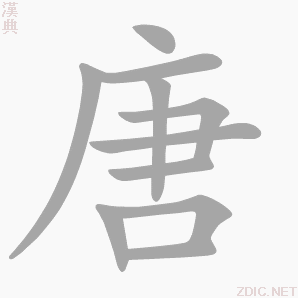
(source:
http://www.zdic.net/z/16/js/5510.htm - A multi-purpose Chinese-English dictionary)
To try it out -
Click
www.zdic.net, enter a Chinese character to the empty box,
then click 搜索.
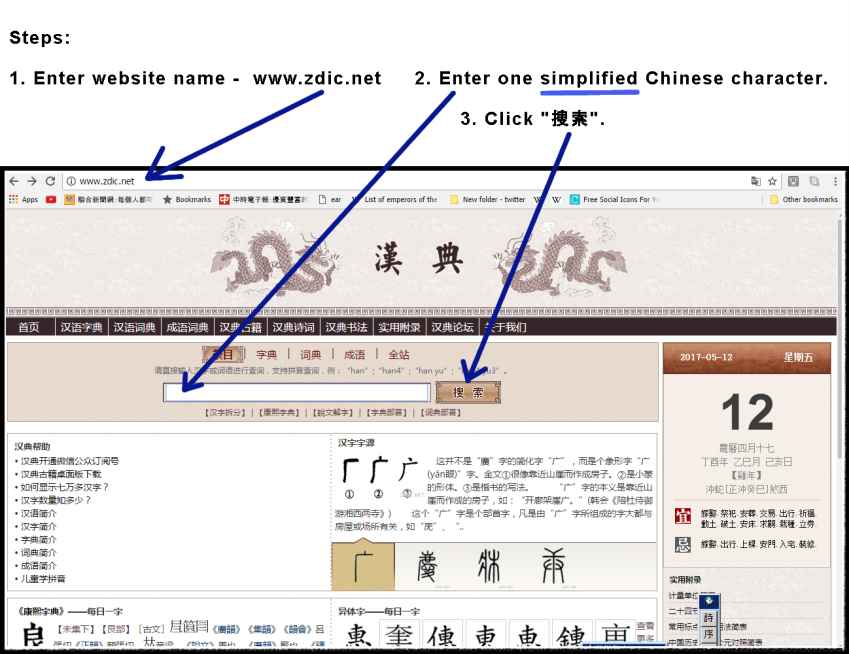
(4). The 300 Tang Poems and the Complete Tang Poems
The Three Hundred Tang Poems - Wikipedia,
Baike.Baidu (in Chinese)
A List of Poems and Authors of 300 Tang Poems (in Chinese)
Complete Tang Poems (Quan Tangshi)
- Wikipedia,
Baike.baidu (in Chinese)
(5). Tang Poem Regulations, Tonal Patterns, and Rhymes
en.wikipedia.org/wiki/Regulated_verse
en.wikipedia.org/wiki/Jueju
(6). Tang history texts
Tongdian 通典 - a Chinese institutional history and encyclopedia text 中国历史上第一部体例政书 -
Wikipedia,
baike.baidu
(in Chinese) or
www.360doc.com (in Chinese)
The author of the Tongdian, Du You 杜佑, was a scholar, historian, and prime minister of the Tang Dynasty, as well as the grandfather of the poet Du Mu 杜牧.
The New Book of Tang 新唐书 (Wikipedia),
Baike.baidu (in Chinese)
The Old Book of Tang 旧唐書 (Wikipedia),
Baike.baidu (in Chinese)
(7). Hanshan (Cold Mountain) Translations
Hanshan 寒山
(Authors including - Gary Snyder, Arthur Waley, Burton Watson,
D. T. Suzuki, Red Pine,
A. S. Kline, Peter Hobson, Yogi Chen,
R. H. Blyth, Peter Stambler, Robert Hendricks, John Wu, J. P. Seaton, Arthur Tobias, etc.)
terebess.hu/zen/chang/hanshan.html#i
Cold Buddha Han Shan 寒山
Compiled by Michael P. Garofalo
http://www.gardendigest.com/zen/hsind.htm
Cold Mountain: 100 Poems
by the T'ang Poet Han-shan
Translated by Burton Watson
www.amazon.com/Cold-Mountain-Poems-Tang-Han-Shan/dp/0231034504
The Collected Songs of Cold Mountain, Translated by Red Pine
www.amazon.com/gp/product/1556591403/ref=pd_lpo_sbs_dp_ss_1?pf_rd_p=1944687562&pf_rd_s=lpo-top-stripe-1&pf_rd_t=201&pf_rd_i=1619021684&pf_rd_m=ATVPDKIKX0DER&pf_rd_r=0PEAWZBJJ8S74PRZNAN2
7. Preview the Table of Contents of Tang Poems (volume 2)
1. Poets and Poems
The poems are numbered after eBook Tang Poems (volume 1) and all poets are listed roughly in chronological order.
王 维 Wang Wei
| 26
|
相思 Deep Yearning
|
| 27
|
九月九日忆山东兄弟 Homesick for My Brothers on September 9
|
| 28
|
鹿柴 Deer Enclosure
|
| 29
|
送別 Send Off
|
| 30
|
渭城曲 Song of Weicheng
|
西鄙人 Xi Biren
盧倫 Lu Lun
| 32
|
塞下曲 (四首之二) Borderland Song (#2 of 4) (Tiger in dark woods...)
|
| 33
|
塞下曲 (四首之三) Borderland Song (#3 of 4) (Chase in snow...) |
白居易 Bai Juyi
| 34
|
忆江南 (一) Jiang Nan Nostalgia(1)
|
| 35
|
草 (赋得古原草送别) Grass
|
刘禹锡 Liu Yuxi
| 36
|
乌衣巷 Black Clothes Alley
|
柳宗元 Liu Zongyuan
李绅 Li Shen
| 38
|
悯农 (一) Sympathy for Farmers (1)
|
| 39
|
悯农 (二) Sympathy for Farmers (2)
|
孟郊 Meng Jiao
| 40
|
游子吟 Chant of the Itinerant Son
|
贾岛 Jia Dao
| 41
|
寻隐者不遇 A Visit in Vain to the Recluse
|
| 42
|
剑客 Swordsman
|
李益 Li Yi
| 43
|
夜上受降城闻笛 Hearing a Flute at Night up on Shouxiang Beacon Tower
|
| 44
|
江南曲 A Song of the Southern River
|
金昌绪 Jin Changxu
杜秋娘 Du Qiuniang
| 46
|
金缕衣 Golden Brocade Dresses
|
杜牧 Du Mu
| 47
|
清明 Qing Ming
|
| 48
|
泊秦淮 Mooring on the Qinhuai River
|
李商隐 Li Shangyin
| 49
|
锦瑟 Jinse
|
| 50
|
登乐游原 Ascending the Field of Diversions
|
2. The End of Tang
3. Empress Wu Zetian- Promoter of Tang Poetry
4. A Summary of attempts at anthologizing Tang poetry
5. A Summary of Chinese Characters and Styles
6. The Beauty of Chinese Calligraphy
|
(1). Famous Calligraphers of the Tang Dynasty
(2). Famous Calligraphers in China's History
(3). Four Treasures of the Study 文房四宝
(4). In memory of Mr. Luo Tie-ching and Ms. Ma Wu, Parents and Grandparents of the Authors
(a). Mr.Luo's calligraphy 罗铁青先生书法
(b). Ms.Ma's calligraphy 马勿女士书法
|
7. A Brief Summary of -
(1). Ruism/Confucianism 儒家
(2). Taoism/Daoism 道家
(3). Zen Buddhism/Chan Buddhism 禅宗佛家
8. References with links
|
8. About the Authors
Marie Sun/Marie Luo Sun/孙罗玛琍:
Marie was born in mainland China and moved to Taiwan with her family in 1949. She grew up in Taiwan and graduated from National Taiwan University in 1965, majoring in economics.
She immigrated to the U.S. in 1968 and worked in the computer programming field for various companies, including IBM, retiring in 1992. in addition to computers, she has always had a passion for Chinese poetry, calligraphy and painting.
* * *
Alex Sun/Alexander K. Sun/孙国強:
(repeated info from the Preface)
Alex Sun was born in the U.S.. At age 12, he was invited by his dear grandparents, Mr. Teiqing Luo and Ms. Wu Ma, in Taipei, Taiwan to study Chinese and experience Chinese culture for a year.
He went on to attend Georgetown University in the U.S., graduating from the Law School in 1992 and becoming a lawyer. While at Georgetown University, he also spent a year studying political science at Beijing University in Beijing, China from 1990 to 1991, and revisited and traveled around the country in later years.
Alex's natural interest in learning different languages, cultures and exploring his roots proved an immeasurable help in producing this book.
9. Share with Media
Thank you for reading.
We invite you to share your thoughts with your friends -
Return to --- page 1
All rights reserved by Marie Sun and Alex Sun
C:\00 B\000_all\pov01_pov2_WHOLE_MARIE_ONLY_KEEP\pov1_Whole_MARIE_ONLY_KEEP
home_ebook_index_1_Marie_ONLY.html
home_ebook.html
home_ebook_indexbar_on_right.html
home_ebook_web_frame_header_po.html
AB20200323
